
GIÁO HỘI HIỆN THẾ 2017
ĐỨC THÁNH CHA PHANXICÔ
TÔNG DU MYANMAR MIẾN ĐIỆN (27-30/11/2017) & BANGLADESH (30/11-2/12/2017)
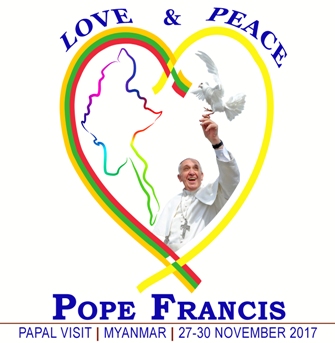
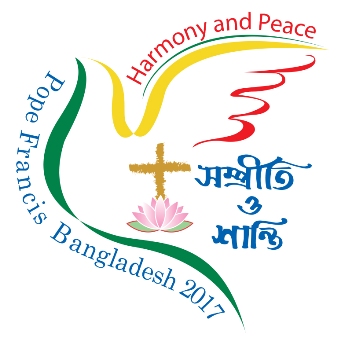
Đaminh Maria Cao Tấn Tĩnh, BVL, tổng hợp và chuyển dịch
(hình ảnh của từng ngày và các bài nói cho từng lúc của Đức Thánh Cha được lấy từ chính website Vatican của Tòa Thánh,
kèm theo các chi tiết diễn tiến về chuyến tông du này cùng với các hình ảnh liên hệ từ 2 websites Vatican Insider và Zenit)
Ngày 2/12
Ngày cuối cùng của chuyến tông du đến hai nước thuộc thế giới Phật giáo là Miến Điện và Hồi giáo là Bangladesh, sinh hoạt mục vụ của ĐTC Phanxicô diễn tiến thứ tự như sau:
10:00 am - Ngài viếng thăm riêng tư Nhà Mẹ Têrêsa Tejgaon
10:45 am - Ngài gặp các linh mục, các tu sĩ nam nữ, các chúng sinh và tập sinh ở Nhà Thờ Rất Thánh Mân Côi
11:45 am - Ngài viếng thăm Nghĩa Trang của nhà thờ này và thăm viếng Nhà Thờ Rất Thánh Mân Côi cổ
15:20 pm - Ngài gặp gỡ giới trẻ ở Đại Học Đức Bà ở Dhaka
16:45 pm - Ngài tạ từ Bangladesh
17:05 pm - Ngài lên đường về Roma và trả lời phỏng vấn truyền thông trên máy bay
23:00 pm - Ngài về đến Roma.
10:00 am - Ngài viếng thăm riêng tư Nhà Mẹ Têrêsa Tejgaon

Pope Francis on December 2, 2017, made a private visit to the “Mother Teresa House” in Tejgaon.
Upon arrival, the Pope was received by the bishop responsible for social pastoral ministry, H.E. Msgr. Paul Ponen Kubi, C.S.C., Bishop of Mymensingh, the superior of the “Mother Teresa House”, and the regional superior of the Missionary Sisters of Charity. He was then accompanied to two rooms where he was awaited by several children and elderly people, assisted by the Congregation’s facilities, while a choir of children performed several hymns in the courtyard of the House.
At the end of his visit, the Holy Father presented a gift to the “Mother Teresa House”. He then transferred on foot to the Holy Rosary Church for the meeting with priests, men, and women religious, consecrated persons, seminarians, and novices.
10:45 am - Ngài gặp các linh mục, các tu sĩ nam nữ, các chúng sinh và tập sinh ở Nhà Thờ Rất Thánh Mân Côi
Pope Francis wanted to visit the smallest of the houses run by the nuns of Mother Teresa of Calcutta here in Dhaka. Built in 1976, it was the favourite residence of the small Albanian nun proclaimed saint by Bergoglio in 2016. It is located in the Tejagon district, in the parish complex of the Holy Rosary Church and offers care and assistance to thousands of orphans and people with mental and physical disabilities. The Pope greeted many sick people: among them, a woman in a wheelchair had also been present at John Paul’s visit II in 1986. Outside the building, Francis was welcomed by some dancers in traditional clothes and by a group of children. The Pope thanked the sisters for their charitable activity and as a gift he left a painting depicting Mother Teresa.
From here Bergoglio moved to the church, which is also the cathedral of the diocese of Chittagong, one of the dioceses bordering Dhaka. Here he met with religious priests, nuns, seminarians and novices. The meeting opened with the some religious speaking about their experiences. Then Francis took the floor and began talking, leaving aside his written speech: “it is eight pages long.... But, you will say: we have come here to listen to the Pope, not to bore ourselves! For this reason, I’ll deliver the speech to the cardinal and he will have it translated. I'll say what comes to my mind now. I don't know whether it will be better or worse than the speech, but I assure you that it will be less boring!"
The Pope then said that as he entered the House, he thought of the Reading of Isaiah, which will be proclaimed in the mass next Tuesday. "Isaiah describes the greatness and littleness of life at the service of God, and this concerns you, because you are men and women of faith who serve God."
“What is inside the earth sprouts. And this is the seed - Bergoglio added - that is neither mine nor yours: God sows it. And it is God who makes it grow. I am the bud, each of us can say: yes, but it is not thanks to you, but thanks to the seed that was grown. And I must water it so that it grows and reaches fullness. This is what You must bear witness to".
“But how can you water this seed? By fostering the bud that is beginning to grow. You must safeguard your vocation as if it were a child, a sick person, an elderly person. Vocation is to be fostered with human tenderness. If this dimension of human tenderness is lacking in our communities and our presbyteries, the small bud can’t grow and might dry out. Foster with tenderness because each brother of the presbytery and each brother of the Episcopal Conference, each brother or sister of each religious community, each seminarian, is a seed of God. And God looks upon her with the tenderness of a Father.
It is true - Francis said again - that at night the enemy comes and sows another seed. We run the risk that the good seed is suffocated by the bad seed. It is the discord in the presbytery: so ugly! How ugly is the discord in the Episcopal Conference, how ugly is the discord in the religious communities and in the seminary. Foster the bud, the good seed, see how it grows, and see how it stands out from the bad seed and the weeds.
“To foster is to discern - he added - and to realize that if the growing plant goes on one side and I take care of it everyday, it grows well; but if it goes on the other side and don’t care, it grows bad. I need to understand, to realise when it is growing bad and whether there are companies, people or situations that threaten its growth. And we are able to understand this only when we have a heart that prays. To foster is to pray! Ask the One who planted the seed to help me water it and if I fall asleep, let Him water it. To pray is to ask the Lord to foster us and give us the tenderness that we must give to others.
The second idea that comes to me - continued the Pontiff - is that in this garden of God’s Kingdom there is not only one bud, but thousands. All of us are buds and it is not easy to build communities. Human passions, flaws and limitations always threaten community life, threaten peace. The communities of consecrated life and of the seminary, of the presbytery and of the Episcopal Conference must be able to defend themselves from all types of divisions".
“Yesterday we thanked God for the example given by Bangladesh in interreligious dialogue," Francis said, citing among the applause the phrase uttered by Cardinal Jean-Luis Tauran, who in 2010 had defined this country as the best example of harmony in interreligious dialogue. Are we doing the opposite in the dialogue internal to our faith, to our Catholic confession, to our communities? Here too, Bangladesh must be an example of harmony!Harmony has many enemies, many! I like to mention one that is a self-explanatory example: someone may criticize me because I am being repetitive, but for me it is fundamental: the enemy of harmony in a religious community is the spirit of discord!
And this - said Bergoglio - is not new to me, two thousand years ago a certain Saint James said it in a letter to the Church. The tongue brothers and sisters!What destroys one community is to talk badly about others, highlight the flaws of the other, and not telling them to him, but telling them to another, and thus creating an environment without peace but with division. I like to define this spirit of bad-mouthing as terrorism. Because who bad-mouths someone doesn’t do it publicly. Because a terrorist does not say in public: I am a terrorist! They go bad-mouthing another, throw the bomb and then leave. And the bomb destroys, but they quietly go and throw another bomb. When you want to talk badly about another person, bite your tongue... So you will not do harm to your brothers and sisters."
"If you see a flaw in your brothers and sisters, what do you do? The Pope asked himself - You can do two things. First: if possible, tell the person, face to face. Jesus gives us this advice. It's true that some of you can say: no, you can't, it's a complicated person.... Complicated like you! Okay, if it is not prudent, then tell those who can remedy it. And no one else. Either you speak directly to the person, or you tell those who can remedy it. But in private, with mercy. So many communities - and I have seen it - were destroyed by the spirit of gossip. Bite your tongue in time!"
Finally, the Pope indicated a third idea. Ask to have the spirit of joy. Without joy one cannot serve God. I ask each one of you: how is your joy going? I assure you that it does a great deal of pain to meet priests, religious, seminarians and bishops, who are bitter and with a sad face. One would like to ask: What did you eat for breakfast? Vinegar? Vinegar face! With this bitterness of heart, when the bad seed comes and says: ah, you see, they made that one superior, that one bishop, and they left me aside! There is no joy there."
Francis explained that joy is there even in difficult times, and gives peace. He told of how Saint Teresa of the Child Jesus had to care for an old, sick and grumbling nun, who always complained for everything. One evening, while accompanying her in the cloister, she heard music coming from the window of a nearby palace, where there were good people who enjoyed themselves. She imagined the people who danced and said, "This is my great joy, and I won’t change it for that! In times of trial and difficulty - sometimes we have to tolerate a slightly strange superior - be happy and tell the Lord: I am happy!"
I assure you - concluded the Pope - that it gives me great tenderness when I meet priests, bishops or elderly nuns who have lived their lives with fullness: their eyes are indescribable, full of joy and peace. Those who have not experienced life in this way lack this brilliance in their eyes. Above all, we see this brilliance in women: look for those old nuns who have spent their whole lives serving with joy and peace. They have brilliant eyes, because they have the wisdom of the Holy Spirit. The small bud in these old persons became full of the seven gifts of the Holy Spirit. I hope that your eyes will shine with the light of the Holy Spirit.
The meeting concluded with the reading of a Marian prayer composed by Father Mintu Palma, especially for the Pope, "We ask you to guard our Holy Father, Pope Francis, with loving care, so that, in good health, he can guide the people of God on the paths of salvation, continuing to promote peace and harmony in the world".
http://www.lastampa.it/2017/12/02/vaticaninsider/eng/the-vatican/discord-destroys-communities-no-to-the-terrorism-of-badmouthing-ThZBgtb86ZXchqJKR3JqVO/pagina.html
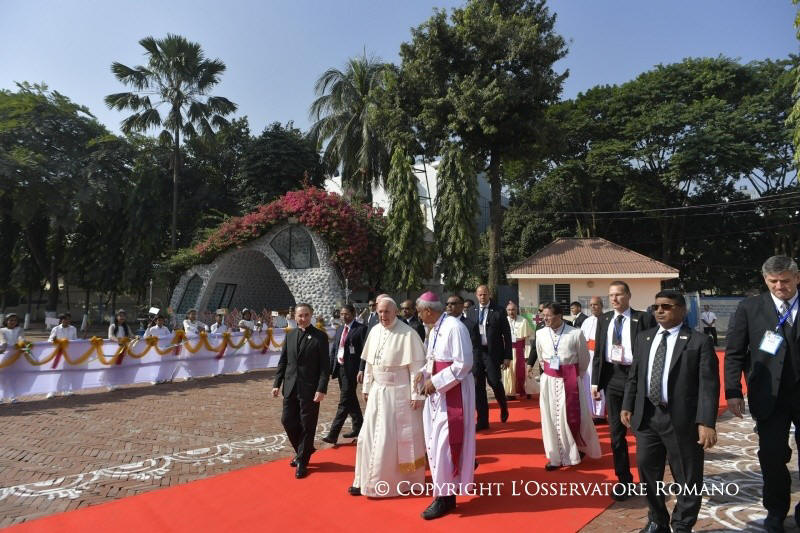
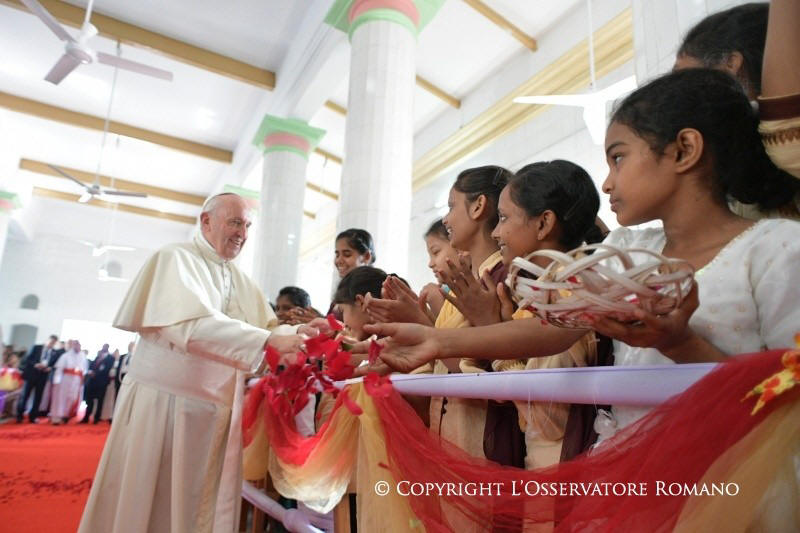
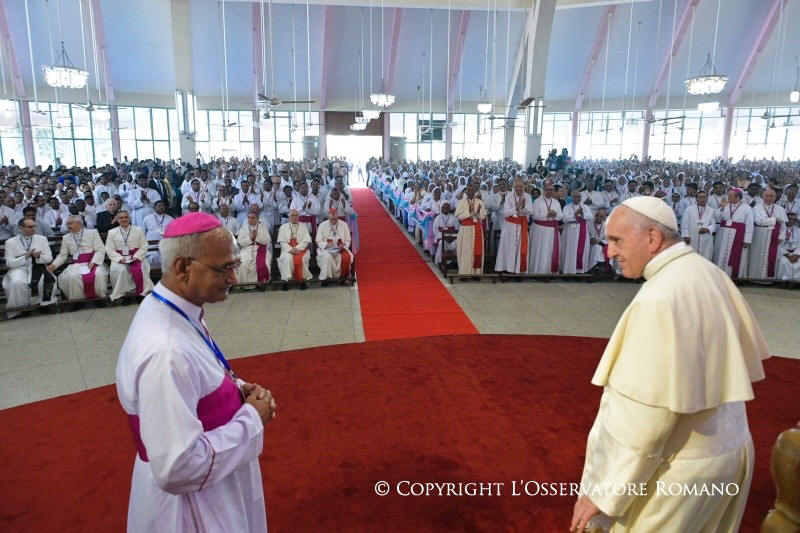
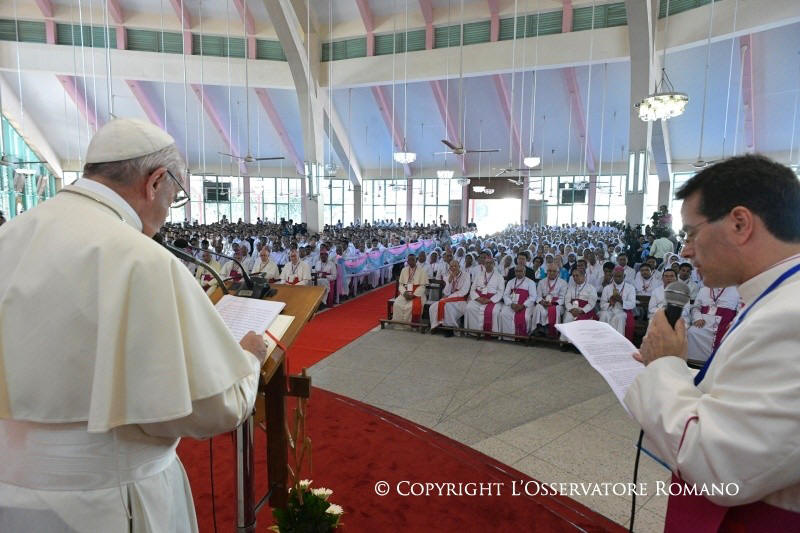
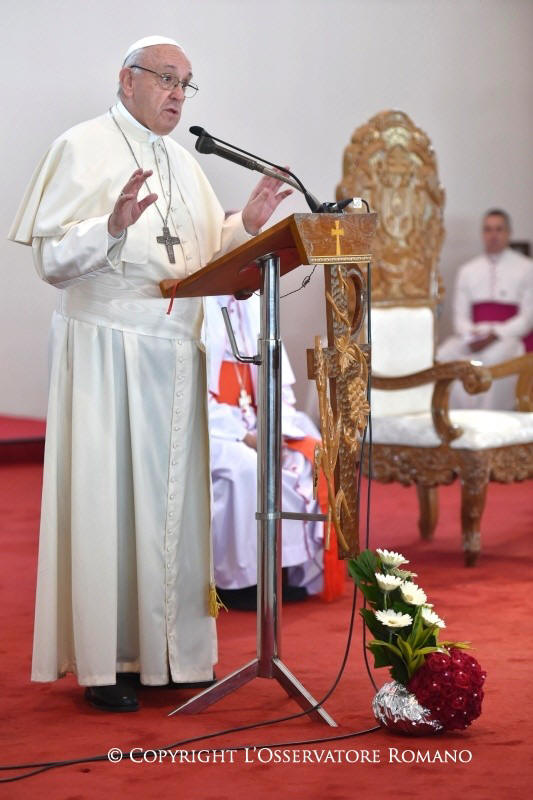
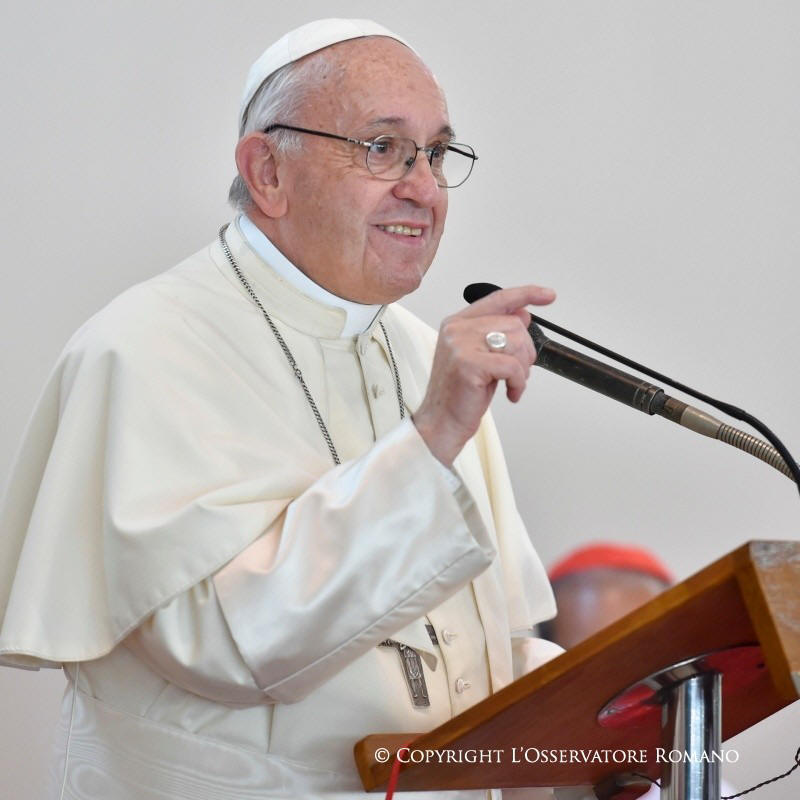
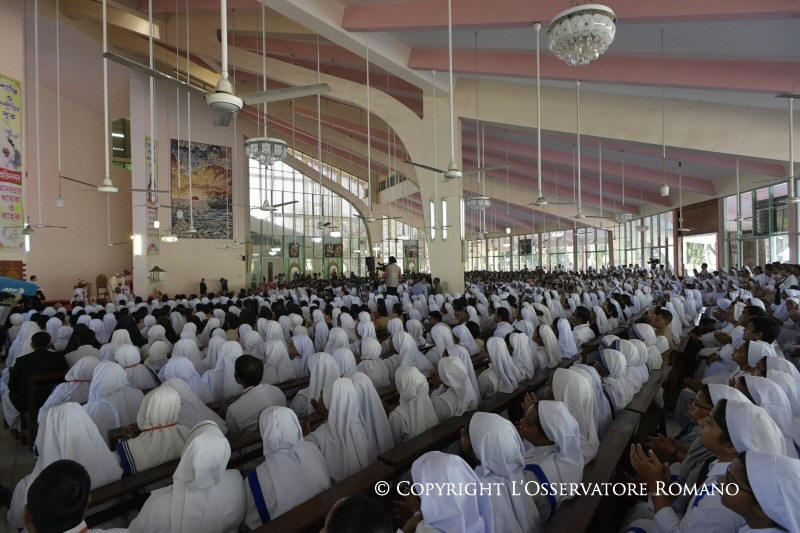
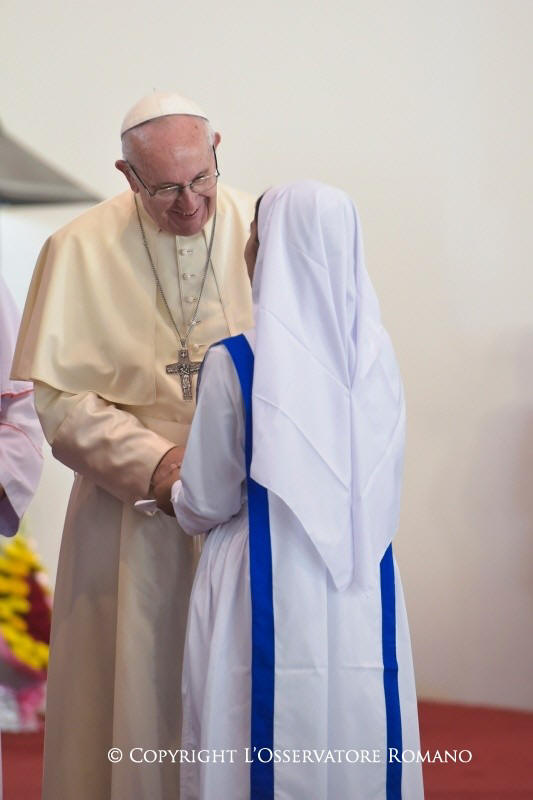

“The Catholic community in Bangladesh is small. But you are like the mustard seed that God brings to fruition in His own time.”
These were the words of Pope Francis on December 2, 2017, to around 1,500 priests, men and women religious, consecrated persons, seminarians and novices in the Holy Rosary Church, the cathedral-Church of the archdiocese of Chittagong.
At the end of the meeting, Francis visited the parish cemetery where many religious are buried, and paused in silent prayer before lighting a candle.

Immediately afterwards the Pope entered the ancient Church of the Holy Rosary, founded by Portuguese missionaries in 1677, and now the Chapel of Perpetual Adoration.
Address of the Holy Father
Dear brothers and sisters,
I am very happy to be with you! I thank Archbishop Moses [Costa] for his warm greeting in your name. I especially thank those who offered testimonies and shared with us their love for God. I also express my gratitude to Father Mintu [Palma] for composing the prayer that we will shortly recite to Our Lady. As the Successor of Peter, it is my task to confirm you in faith. But I want you to know that, through your words and presence here today, you also confirm me in faith and bring me great joy.
The Catholic community in Bangladesh is small. But you are like the mustard seed that God brings to fruition in His own time. I rejoice to see how this seed is growing and to witness first-hand the deep faith which God has given you (cf. Mt 13:31-32). I think of the dedicated and faithful missionaries who planted and tended this seed of faith for almost five hundred years. I will shortly visit the cemetery here and pray for these men and women who so generously served this local Church. As I look out among you, I see missionaries who continue this holy work. I also see many vocations born in this land; they are a sign of the graces with which God is blessing your land. I am particularly pleased by the presence, and the prayers, of the cloistered nuns among us.
It is good that our meeting takes place in this ancient Church of the Holy Rosary. The rosary is a beautiful meditation on the mysteries of faith that are the lifeblood of the Church and a prayer that shapes our spiritual lives and our apostolic service. Whether we are priests, religious, consecrated men or women, seminarians or novices, the prayer of the rosary inspires us, in union with Mary, to give our lives completely to Christ. It invites us to share in Mary’s attentiveness to God at the Annunciation, Christ’s compassion for all humanity as He hangs upon the cross, and the Church’s rejoicing as she receives the Risen Lord’s gift of the Holy Spirit.
Mary’s attentiveness. In all of history, has there ever been anyone as attentive as Mary was at the Annunciation? God prepared her for that moment and she responded in love and trust. So too the Lord has prepared us and called each of us by name. Responding to that call is a lifelong process. Every day we have to learn to be more attentive to the Lord in prayer, meditating on His word and seeking to discern His will. I know that your pastoral work and your apostolates demand much of you and that your days are often long and leave you tired. But we cannot bear Christ’s name, or share in His mission, unless we remain first and foremost men and women rooted in love, fired by love, through a personal encounter with Jesus in the Eucharist and the words of sacred Scripture. Father Abel, you reminded us of this when you spoke of the importance of fostering an intimate relationship with Jesus, for there we experience His mercy and find renewed strength for our service to others.
Attentiveness to the Lord allows us to see the world through His eyes and thus to become more sensitive to the needs of those whom we serve. We begin to understand their hopes and joys, fears and burdens, we see more clearly the many talents, charisms, and gifts they bring to the building up of the Church in faith and holiness. Brother Lawrence, when you spoke of your ashram, you helped us to see the importance of assisting people to satisfy their spiritual thirst. May all of you, in the great variety of your apostolates, be a source of spiritual refreshment and inspiration to those you serve and enable them to share their gifts ever more fully with one another in advancing the mission of the Church.
Christ’s compassion. The rosary draws us into a meditation on the passion and death of Jesus. By entering more deeply into these sorrowful mysteries, we come to know their saving power and are confirmed in our call to share it by our lives of compassion and self-giving. Priesthood and religious life are not a career. They are not a vehicle for personal advancement. They are a service, a share in Christ’s own sacrificial love for His flock. By conforming ourselves daily to that we love, we come to appreciate that our lives are not our own. It is no longer we who live, but Christ who lives in us (cf. Gal 2:20).
We embody this compassion by accompanying people, especially in their moments of suffering and trial, helping them to find Jesus. Father Franco, thank you for drawing this to the fore – each of us is called to be a missionary, bringing Christ’s mercy and love to all, especially those on the peripheries of our society. I am especially grateful for the many ways in which so many of you are engaged in the areas of social outreach, health care, and education, serving the needs of your local communities and of the many migrants and refugees coming to your country. Your service to the wider community, in particular to those most in need, is a precious service to the building of a culture of encounter and solidarity.
The Church’s rejoicing. Lastly, the rosary fills us with joy in Christ’s triumph over death, His ascension to the right hand of the Father and the outpouring of the Holy Spirit upon our world. The whole of our ministry is directed to proclaiming the joy of the Gospel. In our lives and apostolates, we are all too aware of the problems of the world and the sufferings of humanity, but we never lose confidence in the power of Christ’s love to prevail over evil and the Prince of Lies who tries to deceive us. Never be discouraged by your own failures or by the challenges of ministry. If you remain attentive to the Lord in prayer and persevere in offering Christ’s compassion to your brothers and sisters, then the Lord will surely fill your hearts with the comforting joy of His Holy Spirit.
Sister Mary Chandra, you shared with us the joy that flows from your religious vocation and the charism of your religious congregation. Marcelius, you too spoke of the love you and your fellow seminarians have for your vocation to be priests. Both of you reminded us that we are all asked daily to renew and deepen our joy in the Lord by striving to imitate Him ever more fully. In the beginning, this may seem daunting, but it fills our hearts with spiritual joy. For each day becomes an opportunity to begin again, to respond anew to the Lord. Never lose heart, for the Lord’s patience is for our salvation (cf. 2 Pet 3:15)! Rejoice in the Lord always!
Dear brothers and sisters, I thank you for your fidelity in serving Christ and His Church through the gift of your lives. I assure all of you of my prayers, as I ask you to pray for me. Let us now turn to Our Lady, Queen of the Most Holy Rosary, asking that she may obtain for all of us the grace to grow in holiness and to be ever more joyful witnesses of the power of the Gospel to bring healing, reconciliation, and peace to our world.
https://zenit.org/articles/pope-in-bangladesh-you-are-like-the-mustard-seed/
15:20 pm - Ngài gặp gỡ giới trẻ ở Đại Học Đức Bà ở Dhaka
Wisdom and hope. Joy and courage. Dialogue, with children of other religions and with the elderly, and discernment, to “recognize and reject false promises of happiness”. To the young people of Bangladesh, with whom he has chosen to share the last visit of his apostolic journey in Southeast Asia, Pope Francis offers the coordinates to “go forward in life” in the sense of “journeying” and “not to wander around without a goal”.
Around the Pope, on the bleachers of the Notre Dame College sports field in Dhaka, there are seven thousand boys and girls, not only Bengali and not only Catholics, who welcome him with applause, choirs, songs and traditional dances. In this festive atmosphere, Francis does his usual tour aboard the pope-mobile; then, at the end of the meeting, he blessed the first stone of the new building “Notre Dame University Bangladesh” and a commemorative plaque.
Representing all young people - who are more than a third of the country’s population of about 160 million – a girl, Upasana Ruth Gomes and a boy, Anthony Toranga Norek, both students at Notre Dame College, share their testimonies marked by concerns about an uncertain future. “Holy Father, you understand our struggle! We easily get excited but at the same time we find ourselves confused, depressed, frustrated, we no longer know what direction to take and sometimes we lose ourselves. Often we are so unstable and emotionally vulnerable that our life seems to have no meaning. Seeing the world’s injustices, the disrespect for creation, division within families, ill-treatment and the dangers to which women and children are exposed, we feel really discouraged and powerless.”
For its part, Anthony says, “We are committed to living. We try in different ways to act according to justice, to love tenderly and to walk humbly by letting God guide our steps. But the message of peace, salvation and healing that we wish to hear does not always reach our ears.”
Words that offer the Pope a cue for his speech. “There is something unique about young people: you are always full of enthusiasm, and I feel rejuvenated whenever I meet with you” the Pontiff begins. “This youthful enthusiasm is linked to a spirit of adventure”, he added, citing one of the national poets, Kazi Nazrul Islam, who defined the youth of Bangladesh as “fearless” and “used to snatching light out of the womb of darkness”. Young people are always ready to move forward, to make things happen and to take risks. I encourage you to keep moving with this enthusiasm in the good times and the bad times” Francis says. Keep moving, especially in those moments when you feel weighed down by problems and sadness, and when you look out and God seems to be nowhere on the horizon.”
“But as you move forward - he recommends - “make sure that you choose the right way”. What does this mean? It means “journeying” through life, and not “wandering aimlessly”. Our life is not without direction, it has a purpose given to us by God. He guides and directs us with his grace. It is as if he placed within us a computer software, which helps us to discern his divine programme and, in freedom, to respond. But like all software, it too needs constantly to be updated. Keep updating your programme, by listening to God and accepting the challenge of doing his will.” Bergoglio says.
And then he speaks of “wisdom”, which is “The one thing that directs and guides us on to the right path”. Beware, however, “the wisdom born of faith “, not “the false wisdom of this world”. It is the Wisdom that “we see in the eyes of our parents and grandparents who put their trust in God”. To receive this wisdom we have to look at the world, our situations, our problems, everything, with the eyes of God”.
“This wisdom helps us to recognize and reject false promises of happiness. A culture that makes these false promises cannot deliver; it only leads to a self-centredness that fills the heart with darkness and bitterness. The wisdom of God helps us to know how to welcome and accept those who act and think differently than ourselves”. It is sad when we start to shut ourselves up in our little world and become inward-looking. We use the “my way or the highway” principle, and we become trapped, self-enclosed. When a people, a religion or a society turns into a “little world”, they lose the best that they have and plunge into a self-righteous mentality of “I am good and you are bad”.
“The invitation is therefore to open us up to others” and “to look beyond our personal comforts and the false securities which blind us to those grand ideals which make life more beautiful and worthwhile”. In this sense, Francis says to be “happy that, together with Catholics, we also have with us many young Muslim friends and those from other religious backgrounds. In gathering here today you show your determination to foster an environment of harmony, of reaching out to others, regardless of your religious differences” he says.
Then the Pope recall a memory of an experience he had in Buenos Aires, in a new parish in an extremely poor area, “a group of students were building some rooms for the parish and the priest had invited me to visit them - says Bergoglio - So I went, and when I arrived the parish priest introduced them to me one after the other, saying: “This is the architect. He’s Jewish. This one is Communist. This one is a practicing Catholic”. Those students were all different, yet they were all working for the common good. They were open to social friendship and were determined to say no to anything that would detract from their ability to come together and to help one another.”
Finally, Francis, as he often does in his speeches addressed to young people, exhorts us to “respect the elderly” because they “help us to appreciate the continuity of the generations. They bring with them memory and the wisdom of experience, which help us to avoid the repetition of past mistakes”. “Keep talking to your parents and grandparents. Do not spend the whole day playing with your phone and ignoring the world around you!”
Then, looking at the faces of the new generations of this portion of Asia, Francis concludes with a wish: “May God’s wisdom continue to inspire your efforts to grow in love, fraternity and goodness.”. Isshór Bangladeshké ashirbád korún, God bless Bangladesh,” Pope Francis exclaims before moving to Dhaka International Airport and concluding his 21st international apostolic trip to this young country, so poor yet so full of “hope”.
http://www.lastampa.it/2017/12/02/vaticaninsider/eng/the-vatican/pope-young-people-do-not-to-wander-around-without-a-goal-keep-updating-your-software-of-hope-KgrS6pYqeozWrbCwV4fhmK/pagina.html
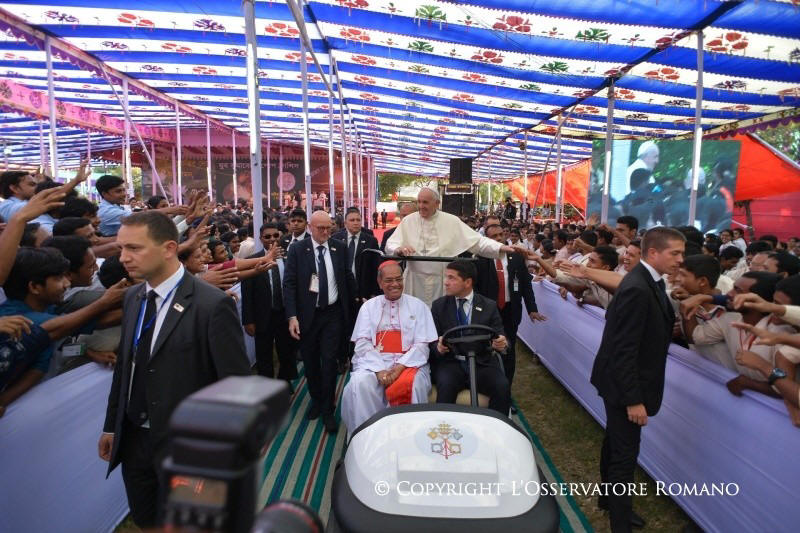
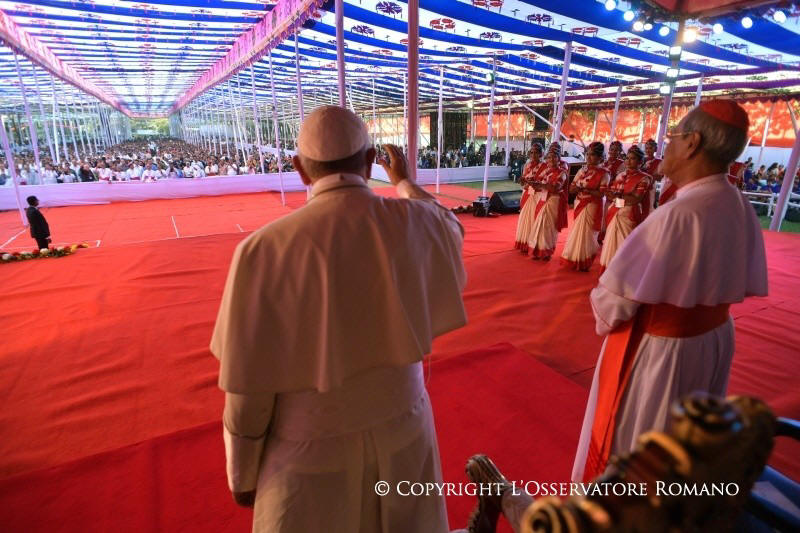
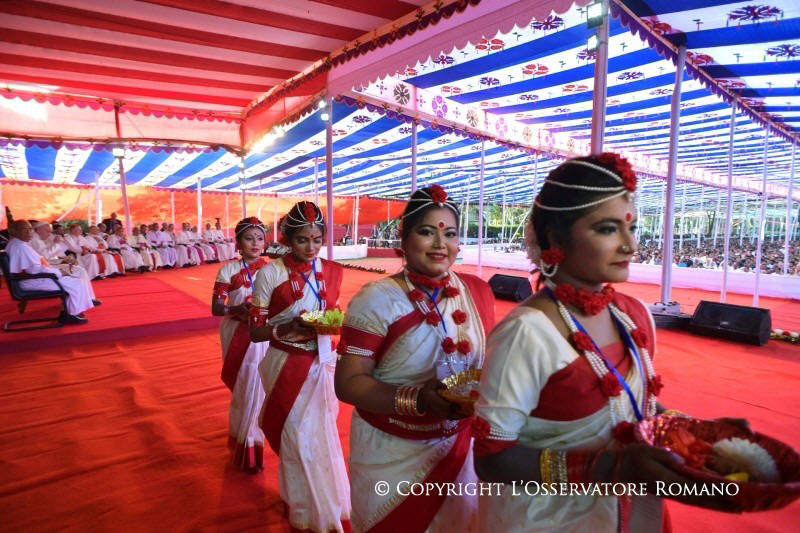
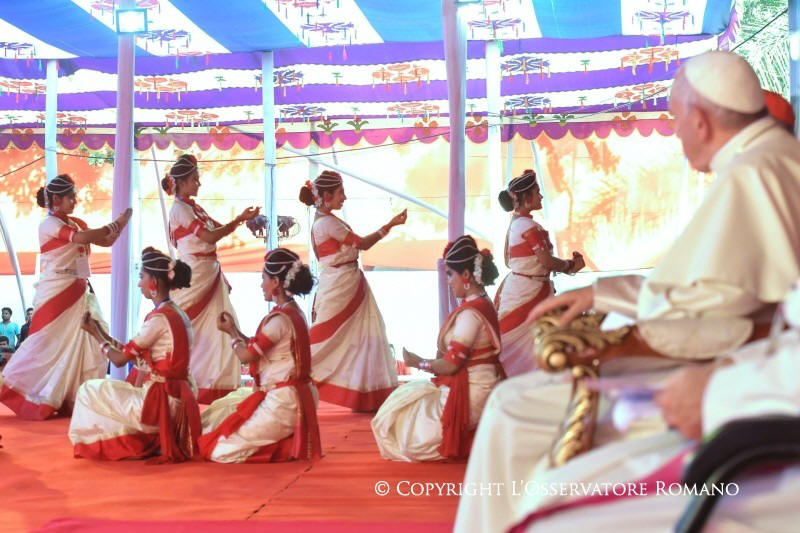
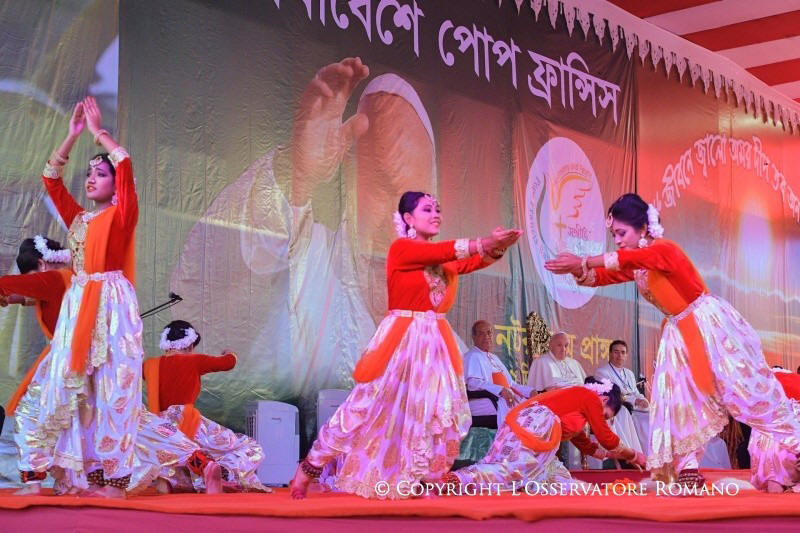
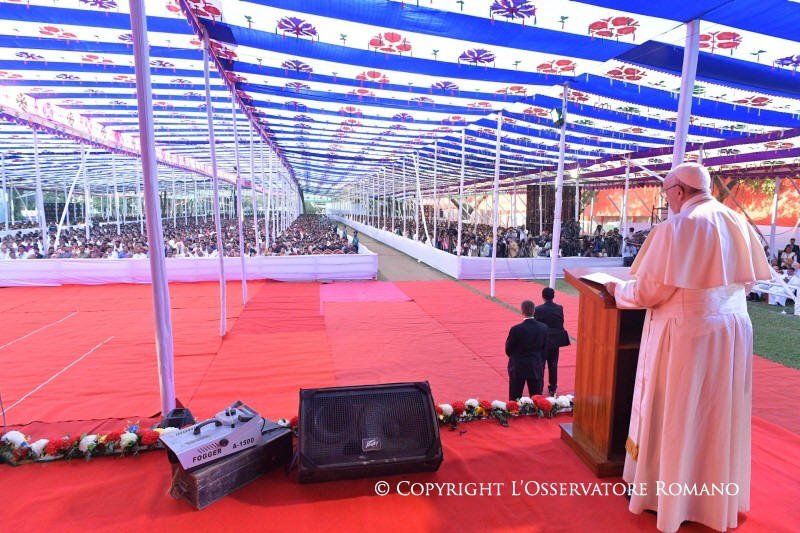

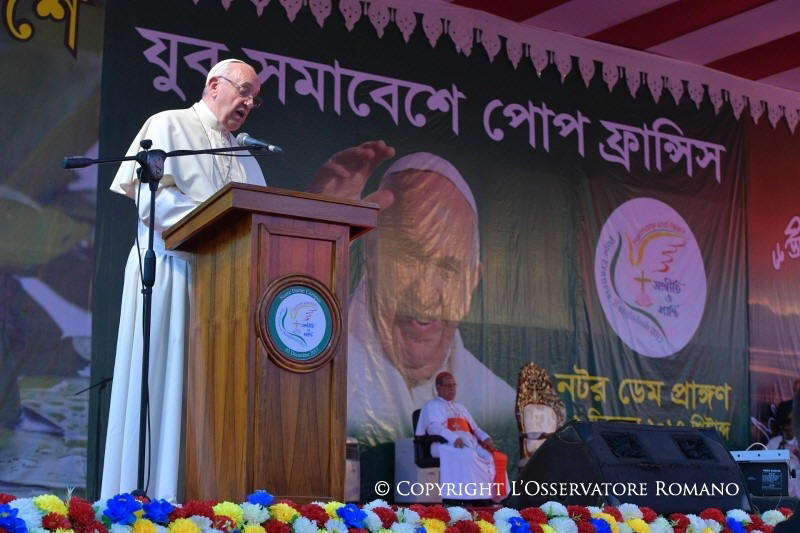
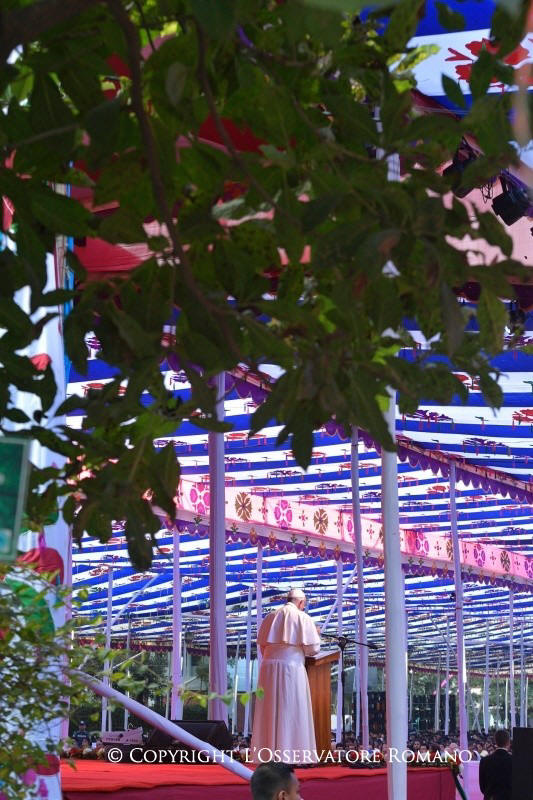
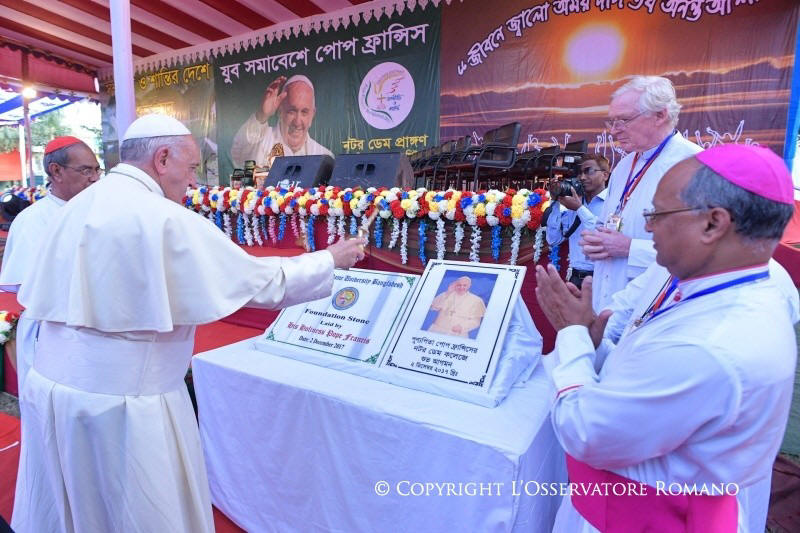
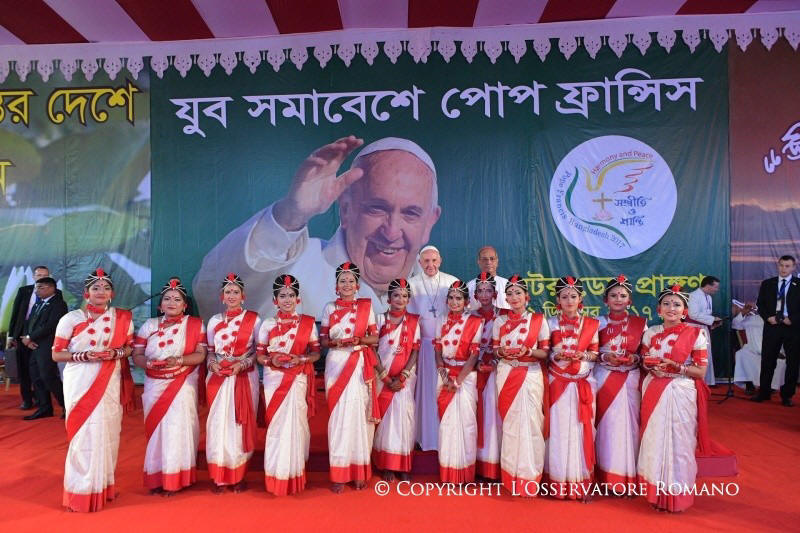

Dear Young Friends, good evening!
Here we are together at last! I am grateful to all of you for your warm welcome. I thank Bishop Gervas [Rozario] for his kind words and Upasana and Anthony for their testimonies. There is something unique about young people: you are always full of enthusiasm, and I feel rejuvenated whenever I meet with you. Upasana, you spoke about this in your testimony; you said you are all “very enthusiastic” and I can see and feel this. This youthful enthusiasm is linked to a spirit of adventure. One of your national poets, Kazi Nazrul Islam, expressed this by referring to the youth of the country as “fearless”, “used to snatching light out of the womb of darkness”. Young people are always ready to move forward, to make things happen and to take risks. I encourage you to keep moving with this enthusiasm in the good times and the bad times. Keep moving, especially in those moments when you feel weighed down by problems and sadness, and when you look out and God seems to be nowhere on the horizon.
But as you move forward, make sure that you choose the right path. What does this mean? It means “journeying” through life, and not “wandering aimlessly”. Our life is not without direction, it has a purpose given to us by God. He guides and directs us with his grace. It is as if he placed within us a computer software, which helps us to discern his divine program and, in freedom, to respond. But like all software, it too needs constantly to be updated. Keep updating your program, by listening to God and accepting the challenge of doing his will.
Anthony, you referred to this challenge in your testimony when you said that you are young men and women who are “growing up in a fragile world that cries out for wisdom.” You used the word “wisdom” and in doing so you gave us the key. Once you move from “journeying” to “wandering aimlessly”, all wisdom is lost! The one thing that directs and guides us on to the right path is wisdom, the wisdom born of faith. It is not the false wisdom of this world. It is the wisdom we see in the eyes of our parents and grandparents who put their trust in God. As Christians, we can see the light of God’s presence in their eyes, the light that they have discovered in Jesus, who is the very wisdom of God (cf. 1 Cor 1:24). To receive this wisdom we have to look at the world, our situations, our problems, everything, with the eyes of God. We receive that wisdom when we start to see things with God’s eyes, listen to others with God’s ears, to love with God’s heart, and to judge things by God’s values.
This wisdom helps us to recognize and reject false promises of happiness. A culture that makes these false promises cannot deliver; it only leads to a self-centeredness that fills the heart with darkness and bitterness. The wisdom of God helps us to know how to welcome and accept those who act and think differently than ourselves. It is sad when we start to shut ourselves up in our little world and become inward-looking. We use the “my way or the highway” principle, and we become trapped, self-enclosed. When a people, a religion or a society turns into a “little world”, they lose the best that they have and plunge into a self-righteous mentality of “I am good and you are bad”. Upasana, you highlighted the consequences of this way of thinking: “We lose direction and get lost” and “life becomes meaningless to us”. The wisdom of God opens us up to others. It helps us to look beyond our personal comforts and the false securities which blind us to those grand ideals which make life more beautiful and worthwhile.
I am happy that, together with Catholics, we also have with us many young Muslim friends and those from other religious backgrounds. In gathering here today you show your determination to foster an environment of harmony, of reaching out to others, regardless of your religious differences. This reminds me of an experience I had in Buenos Aires, in a new parish located in an extremely poor area. A group of students was building some rooms for the parish and the priest had invited me to visit them. So I went, and when I arrived the parish priest introduced them to me one after the other, saying: “This is the architect. He’s Jewish. This one is Communist. This one is a practicing Catholic” (cf. Address to Students, Havana, 20 September 2015). Those students were all different, yet they were all working for the common good. They were open to social friendship and were determined to say no to anything that would detract from their ability to come together and to help one another.
God’s wisdom also helps us to look beyond ourselves to see the goodness in our cultural heritage. Your culture teaches you to respect the elderly. As I said earlier, the elderly help us to appreciate the continuity of the generations. They bring with them memory and the wisdom of experience, which help us to avoid the repetition of past mistakes. The elderly have the “charism of bridging the gap”, in that they ensure that the most important values are passed down to their children and grandchildren. Through their words, love, affection, and presence, we realize that history did not begin with us, but that we are part of an age-old “journeying” and that reality is bigger than we are. Keep talking to your parents and grandparents. Do not spend the whole day playing with your phone and ignoring the world around you!
Upasana and Anthony, you ended your testimonies with expressions of hope. The wisdom of God reinforces the hope in us and helps us to face the future with courage. We Christians find this wisdom in our personal encounter with Jesus in prayer and in the sacraments, and in our concrete encounter with him in the poor, the sick, the suffering and the abandoned. In Jesus, we discover the solidarity of God, who constantly walks by our side.
Dear young friends, when I look at your faces I am filled with joy and hope: joy and hope for you, for your country, for the Church, and for your communities. May God’s wisdom continue to inspire your efforts to grow in love, fraternity, and goodness. As I leave your country today, I assure you of my prayers that all of you may continue to grow in love of God and neighbor. And please, do not forget to pray for me!
God bless Bangladesh! [ Isshór Bangladeshké ashirbád korún! ] [01801-EN.01] [Original text: Italian]
https://zenit.org/articles/pope-tells-youth-of-bangladesh-to-choose-the-right-path/
16:45 pm - Ngài tạ từ Bangladesh

Pope Francis departed Dhaka International Airport on December 2, 2017, completed his apostolic journey to Myanmar and Bangladesh, which started November 26, 2017.
Immediately after his departure by air from Dhaka, the Holy Father Francis sent the following telegram to the President of the Republic of Bangladesh, Mr. Abdul Hamid:
HIS EXCELLENCY ABDUL HAMID
PRESIDENT OF THE PEOPLE’S REPUBLIC OF BANGLADESH
DHAKA
AS I DEPART BANGLADESH FOR MY RETURN TO ROME, I OFFER RENEWED THANKS TO YOUR EXCELLENCY, THE GOVERNMENT AND ALL THE BELOVED PEOPLE OF BANGLADESH FOR YOUR GENEROUS WELCOME AND FOR THE MANY KINDNESSES SHOWN TO ME DURING MY VISIT. WITH THE ASSURANCE OF MY CONTINUED PRAYERS FOR YOU, I INVOKE THE ALMIGHTY’S BLESSINGS OF HARMONY AND PROSPERITY UPON THE NATION.
https://zenit.org/articles/farewell-from-bangladesh-at-dhaka-international-airport/
17:05 pm - Ngài lên đường về Roma và trả lời phỏng vấn truyền thông trên máy bay
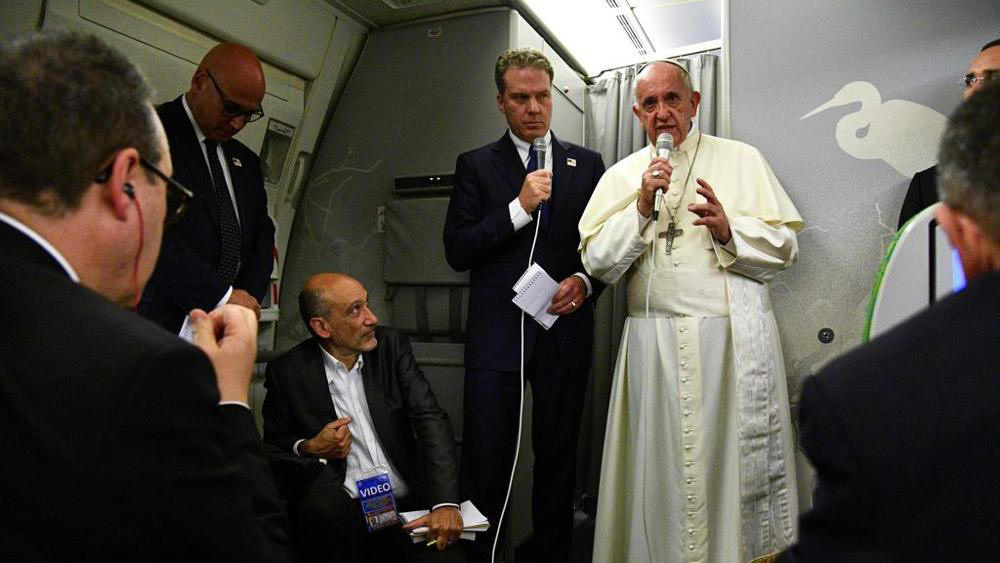
I have not negotiated the truth with the generals. I respected my interlocutors in Myanmar, but the message arrived. Pope Francis met with journalists on the return flight from Bangladesh and spoke at length about the meeting with the Rohingya, telling how he tried to hide his tears. He also explains why he did not pronounce the name of the ethnic group in Myanmar. He asked for questions about the journey, but made an exception to comment on the recent escalation and the growing threat of a nuclear conflict, by saying: “with atomic weapons, we are at the limit, creation is in danger of being destroyed. We are at the limit of lawfulness for possessing and using these weapons, because today, with such a sophisticated nuclear arsenal, we risk the destruction of humanity”
The Rohingya refugee crisis was at the center of the trip. Friday in Bangladesh you said their name. Would you have liked to be able to use that word in Myanmar?
It was not the first time I named the word Rohingya. I have done it several times, in public, in St. Peter’s Square. What I think, and what I said is known. Your question is interesting because it leads me to reflect on how I try to communicate. The most important thing for me is that the message arrives. That is why we must try to say things step by step, and listen to the answers. I was interested that this message came through. If I had said that word in the official speech, it would have been like slamming the door in the face of my interlocutors. But I have described the situation, I have talked about minority rights, so that we can go further in the private talks. I was satisfied with the talks: it is true, I haven’t had the pleasure to slam the door in public, but I was happy to dialogue, to have the other person speak and to say my own. Until the meeting and the words of Friday. It is important to worry that the message arrives: some complaints, in the media, sometimes aggressively spoken, close the dialogue, close the door, and the message does not arrive”.
What did you experience when you met with the refugees?
It wasn’t planned like this, I knew that I would meet the Rohingya, I didn’t know where and how, but this was a set condition of the trip. After so many contacts with the government and Caritas, the government allowed the Rohingya to travel, it is the government that protects them and gives them hospitality, and what Bangladesh does for them is great, it is an example of welcome. A small and poor country that has received 700 thousand people... I think of the countries that close their doors! We must be grateful for the example they give us. In the end they came, the were frightened. Someone told them that they could not tell me anything. The inter-religious encounter had prepared the heart of all of us, and it was time for them to come to greet, they walked up in line, that I did not like. But then they immediately wanted to kick them out of the scene, and I got angry there and got a bit of a grudge: I’m a sinner! I have said many times: respect! And they remained there. Then after listening to them one by one, I began to feel something inside, I couldn’t let them go without saying a word. And I started talking, I asked for forgiveness. At that moment I was crying, I tried to hide it. They cried as well. The message has arrived, not only here. Everyone got it.
Your meeting with General Hlaing, who played a role in the Rakhine crisis, aroused curiosity: why did he ask to see you earlier than expected, was it an attempt to manipulate you? Did you talk to him about the Rohingya?
I would differentiate between two types of meetings, those in which I went to visit people and those where I received people. The general asked, I received him. I’m never shutting the door, there is nothing to lose when talking, there is always a gain. I have not negotiated the truth, but I have made sure that he understood why a path such as that of the past “bad times” today cannot be pursued. It was a civil meeting. He asked to come first because he had to leave for China. If I am able to move the appointment, I do so. His intentions? I do not know. I was interested in dialogue and that it was he to come to me. Dialogue is more important than the suspicion of him wanting to say: I am the one ruling here, and I come first. With him I used words to get to the message and when I saw that the message was accepted, I dared to say everything I wanted to say. Intelligenti pauca.
In Myanmar, you met Aung San Suu Kyi, the president, the monks... What do you take with you from all these meetings?
It will not be easy to move forward in a constructive development, it will not be easy for those who want to go back. Someone has said that the state of Rakhine is very rich in precious stones and would do well if it were without people. I do not know whether this is true, it is a hypothesis that they make. But I think we are at a point where it will not be easy to move forward in a positive way and it will not be easy to go back. The UN has said that the Rohingya are today the most persecuted ethnic-religious minority in the world, it is a burden for those who want to go back. But I’m not losing hope.
You often talk about migrants: did you want to go to the Rohingya refugee camp?
I would have liked to, but it was not possible, for the time, the distance. And also for other factors. But the refugee camp came, as a representation, to me.
On the Rakhine crisis, also Isis and the Jihadists wanted to insert themselves...
There were terrorist groups trying to take advantage of the Rohingya, who are people of peace. There is always a fundamentalist group in religions, we Catholics also have them. The military justify their intervention on the grounds of these groups. I did not choose to speak with these people, but with the victims, with the people who suffered this discrimination on the one hand, and were defended by the terrorists. The Bangladesh Government has campaigned very strongly for zero tolerance of terrorism. Those who enrolled in Isis, although they are Rohingya, are a small fundamentalist group. This is what extremists do: they justify the intervention that has destroyed good and bad people.
Aung San Suu Kyi was criticized for not talking about the Rohingya...
I heard that: they criticized her for not going to the Rakhine state, then she went there for half a day. But in Myanmar, it is difficult to evaluate a criticism without first asking: was this possible, how will it be possible to do so? Myanmar is a politically growing nation, the political situation is of transition, and for this reason, possibilities are to be evaluated also in this perspective.
John Paul II said in 1982 that nuclear deterrence was “morally acceptable”. You recently said that the possession of nuclear weapons must also be condemned. Why this change? Did the tensions and threats between President Trump and Kim Jong Un had an effect?
What has changed? Irrationality. I think of the encyclical Laudato si’, the custody of creation. Many years have passed since the time of John Paul II, and nuclear power has gone beyond that. Today we are at the limit. This can be discussed, but it is my convinced opinion: we are on the limit of lawfulness of having and using nuclear weapons. Because today, with such a sophisticated nuclear arsenal, we are in danger of destroying humanity, or at least a large part of humanity. This has changed: the growth of armaments, the most sophisticated weapons, capable of destroying people without touching the structures. We are at the limit, and I ask myself this question. It is not pontifical magisterium, but it is the question that a Pope asks himself: is it permissible to keep these nuclear arsenals as they are today? Or shouldn’t be necessary to go back to save creation and humanity? Let’s think of Hiroshima and Nagasaki, it happened seventy years ago. And let’s think about what happens when atomic energy is not in control. Think about the accident in Ukraine. For this reason, about the weapons that serve to win by destroying, I say: we are at the limit of lawfulness.
We know that you want to visit India, why couldn’t you go there? They expect you in 2018, millions of Indians are waiting for you…
The first plan was to go to India and Bangladesh, but then the mediations were delayed, time was pressing and I chose these two countries: Bangladesh remained but we added Myanmar. It was providential, because it takes one trip alone to visit India, you have to go to the south, to the center, to the north, for the different cultures. I hope to be able to do so in 2018, if I live.
Some people oppose interreligious dialogue and evangelization. What is the priority, evangelizing or dialogue for peace? Evangelizing means arousing conversions, which provoke tensions between believers.
First distinction: evangelizing is not proselytizing. The Church grows not by proselytism but by attraction, that is by baring witness, as Benedict XVI explained. What is evangelization? Living the Gospel and witnessing how the Gospel is lived: the beatitudes, Chapter 25th of Matthew, baring witnessing to the Good Samaritan, forgiveness seventy times seven. And in this witness, the Holy Spirit works and there are conversions. But we are not very enthusiastic about having undergone conversions: if they come, we speak, to try to find the answer to something that the Spirit has moved in our hearts before the witness of the Christian. A young man at WYD in Krakow asked me, what should I tell a university mate, who is atheist, to convert him? I replied: the last thing you have to do is “say” something. You live your gospel and if he asks you why you do this, then explain it, and let the Holy Spirit attract him. This is the strength and meekness of the Holy Spirit in conversions. Not by mentally convincing with apologetic explanations, we are witnesses of the Gospel. And the Greek word is “martyr”, the daily martyrdom, and also that of blood, when it arrives. What is a priority? When we live with witness and respect, peace is achieved. Peace begins to break when proselytism begins.
You were in Korea, the Philippines, now in Myanmar and Bangladesh, it looks like a tour around China. Is a trip to China in preparation?
The trip to China is not in preparation, relax. I have already said that I would like to visit China. It’s no secret. Negotiations with China are of high cultural level, there is an exhibition of the Vatican museums in China. Then there is the political dialogue especially for the Chinese Church: one must go step by step with delicacy, slowly and patiently. The doors of the heart are open and I believe that a trip to China will do everyone well, I would love to do it!
Were the priests you ordained on Friday afraid of becoming priests in a Muslim country?
I always have the habit of speaking to priests whom I ordain, five minutes in private. They seemed serene, calm, conscious of their mission, normal! I asked them: do you play soccer? Everyone replied: yes. I have perceived no fear.
23:00 pm - Ngài về đến Roma.
Ngày 1/12
Trong ngày gần cuối của chuyến tông du 7 ngày hôm nay, cũng là ngày thứ nhì ở nước Bangladesh, sinh hoạt mục vụ, tôn giáo và ngoại giao ĐTC Phanxicô đưoọc diễn tiến thự tự như sau:
10:00 am - Ngài dâng lễ truyền chức ở Công Viên Suhrawardy Udyan
15:20 pm - Ngài thăm Vị Thủ Tướng ở Tòa Khâm Sứ
16:00 pm - Ngài viếng thăm Vương Cung Thánh Đường
16:15 pm - Ngài gặp gỡ các vị Giám Mục ở Nhà Hưu Dưỡng Các Linh Mục
17:00 pm - Ngài tham dự cuộc Gặp Gỡ Đại Kết và Liên Tôn cho Hòa Bình ở Khu Vườn Tư Dinh Tổng Giám Mục
10:00 am - Ngài dâng lễ truyền chức ở Công Viên Suhrawardy Udyan
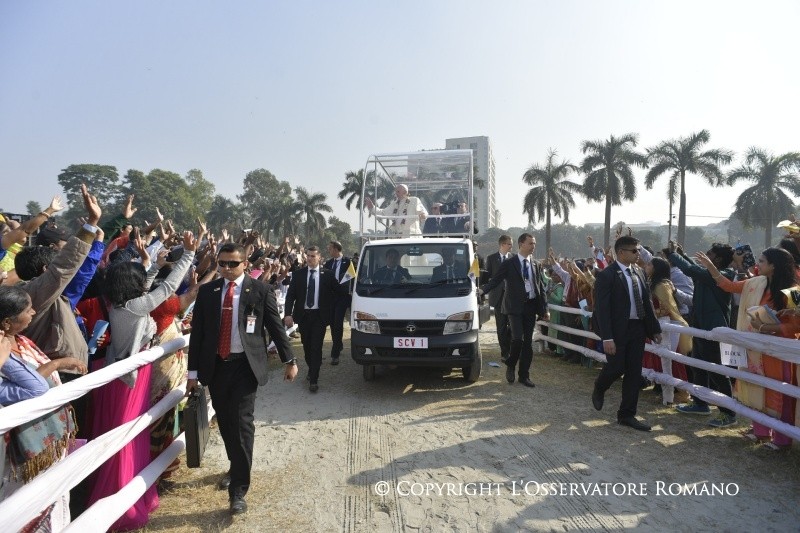

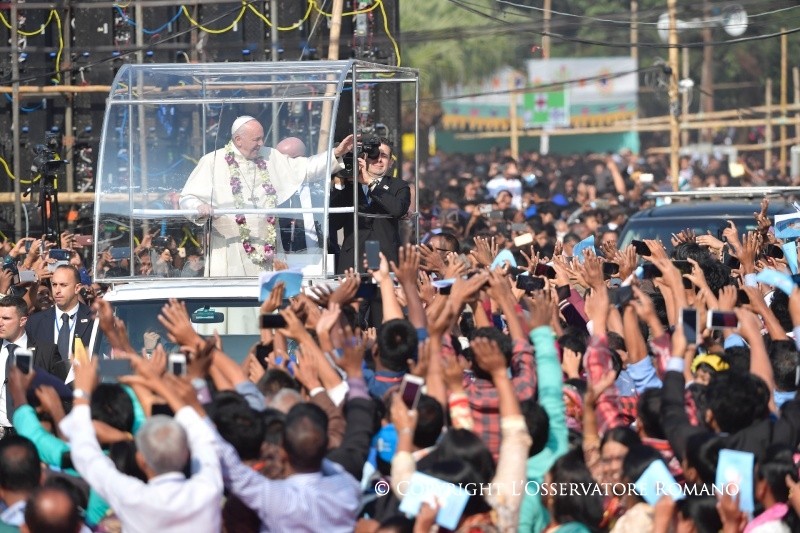
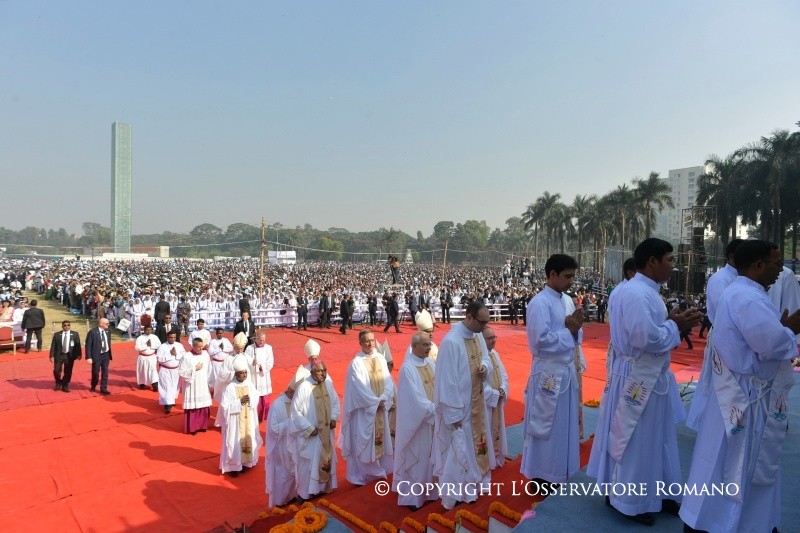
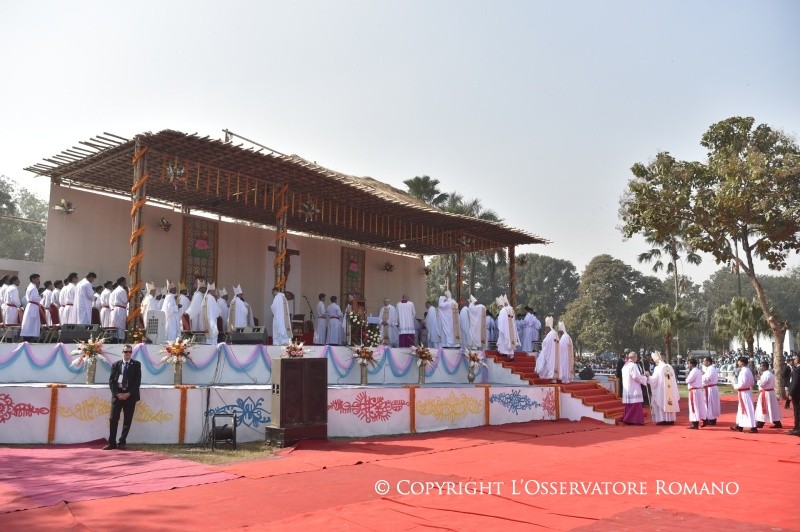
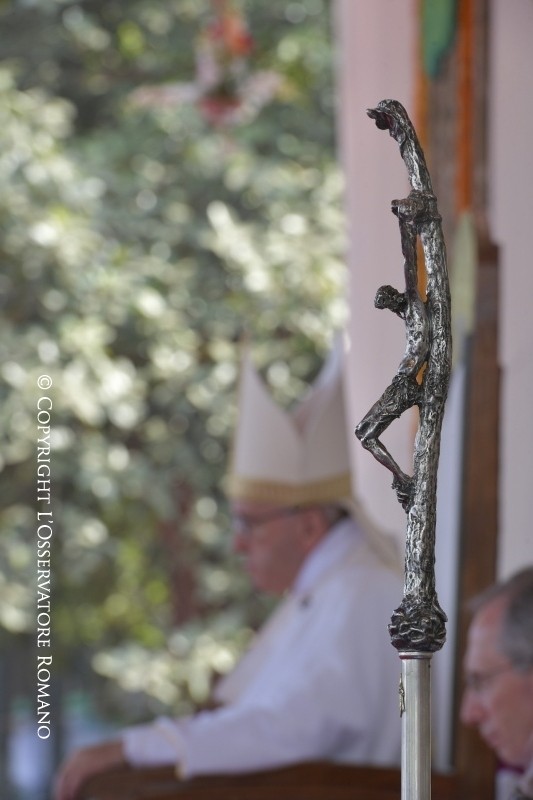
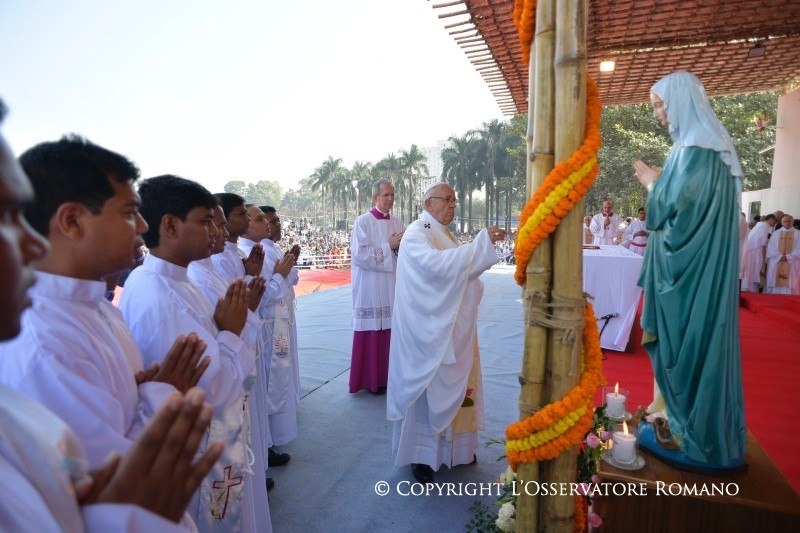
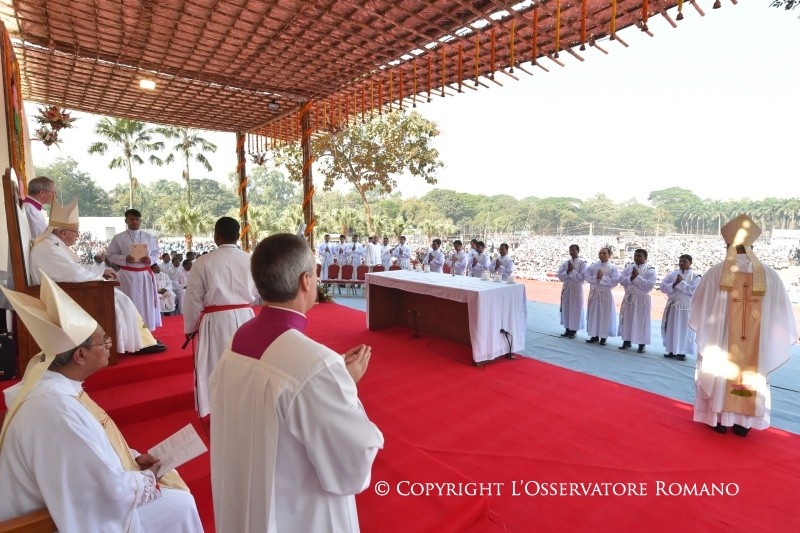
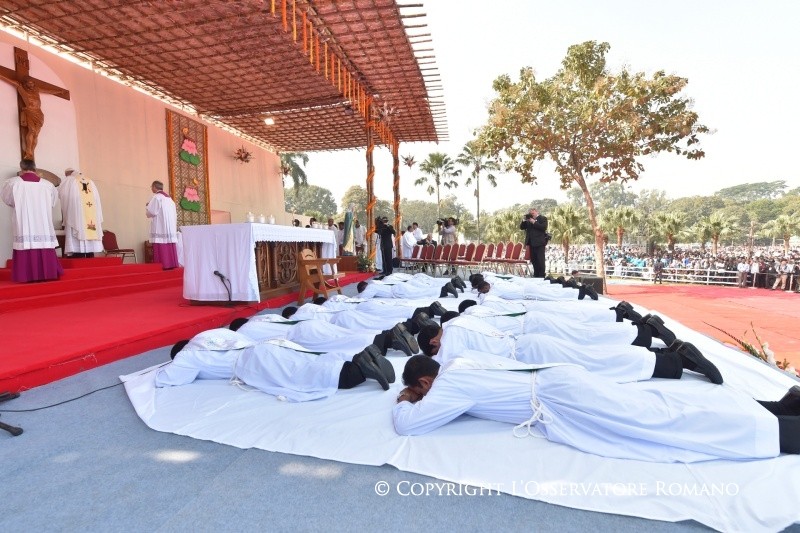
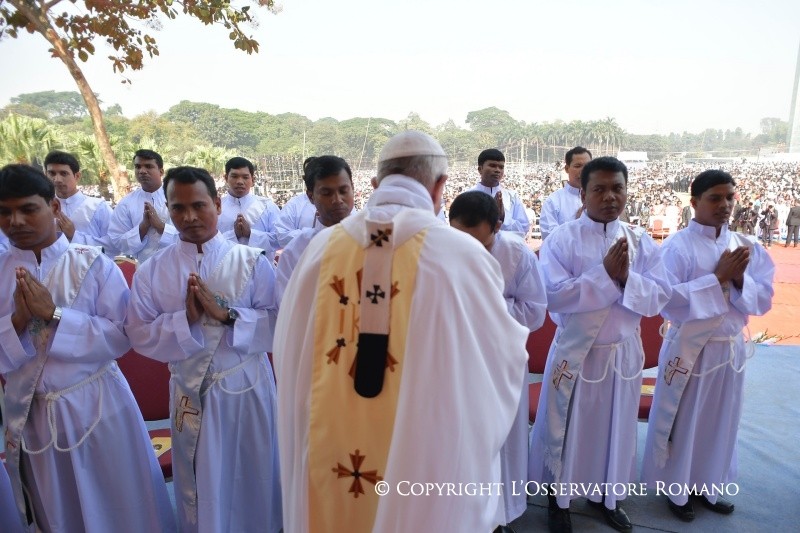
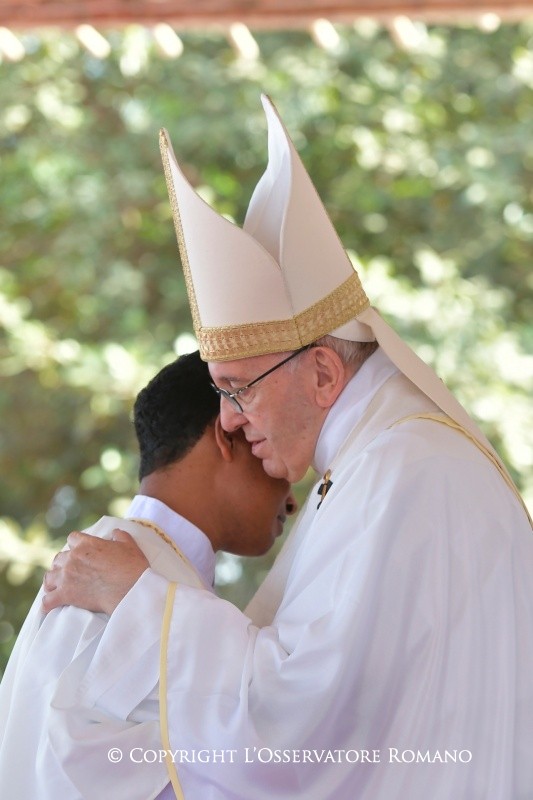
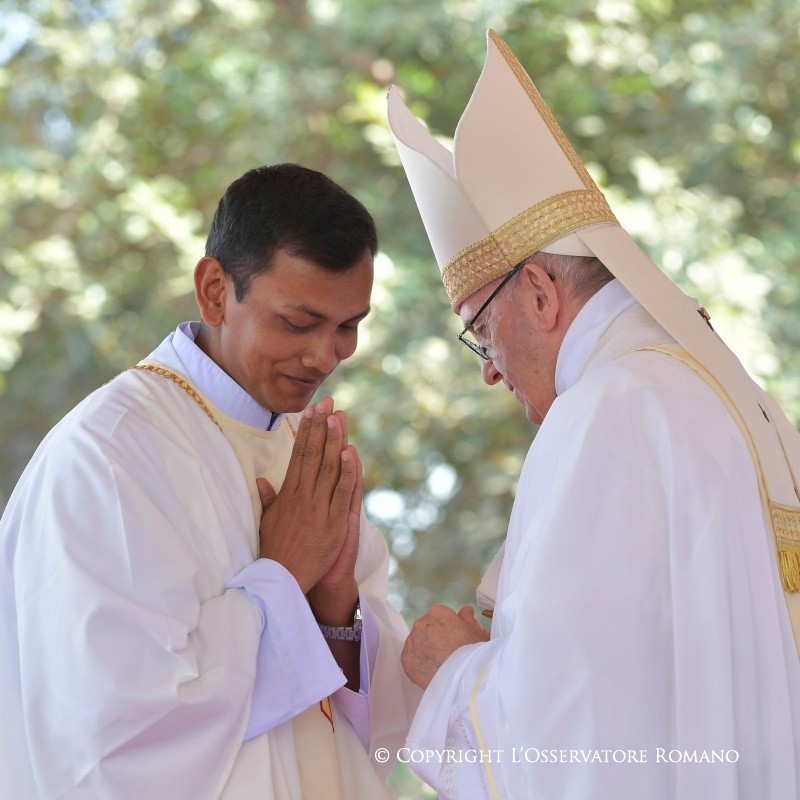
HOLY MASS AND PRIESTLY ORDINATION
HOMILY OF HIS HOLINESS POPE FRANCIS
Beloved brothers and sisters: because these our sons, who are your relatives and friends, are now to be advanced to the Order of priests, consider carefully the nature of the rank in the Church to which they are about to be raised. It is true that God has made his entire holy people a royal priesthood in Christ. Nevertheless, our great Priest himself, Jesus Christ, chose certain disciples to carry out publicly in his name, and on behalf of mankind, a priestly office in the Church. For Christ was sent by the Father and he in turn sent the Apostles into the world, so that through them and their successors, the Bishops, he might continue to exercise his office of Teacher, Priest, and Shepherd. Indeed, priests are established co-workers of the Order of Bishops, with whom they are joined in the priestly office and with whom they are called to the service of the people of God.
After mature deliberation, these, our brothers, are now to be ordained to the priesthood in the Order of the presbyterate, so as to serve Christ the Teacher, Priest, and Shepherd, by whose ministry his body, that is, the Church, is built and grows into the people of God, a holy temple.
Now, dear sons, you are to be raised to the Order of the Priesthood. For your part, you will exercise the sacred duty of teaching in the name of Christ the Teacher. Impart to everyone the word of God which you have received with joy. Meditating on the law of the Lord, see that you believe what you read, that you teach what you believe, and that you practice what you teach.
In this way, let what you teach be nourishment for the people of God. Let the holiness of your lives be a delightful fragrance to Christ’s faithful, so that by word and example you may build up the house which is God’s Church.
Likewise you will exercise in Christ the office of sanctifying. For by your ministry the spiritual sacrifice of the faithful will be made perfect, being united to the sacrifice of Christ, which will be offered through your hands in an unbloody way on the altar, in union with the faithful, in the celebration of the sacraments. Understand, therefore, what you do and imitate what you celebrate. As celebrants of the mystery of the Lord’s death and resurrection, strive to put to death whatever in your members is sinful and to walk in newness of life.
Remember, when you gather others into the people of God through Baptism, and when you forgive sins in the name of Christ and the Church in the sacrament of Penance; when you comfort the sick with holy oil and celebrate the sacred rites, when you offer prayers of praise and thanks to God throughout the hours of the day, not only for the people of God but for the world – remember then that you are taken from among men and appointed on their behalf for those things that pertain to God. Therefore, carry out the ministry of Christ the Priest with constant joy and genuine love, attending not to your own concerns but to those of Jesus Christ.
Finally, dear sons, exercising for your part the office of Christ, Head and Shepherd, while united with the Bishop and subject to him, strive to bring the faithful together into one family, so that you may lead them to God the Father through Christ in the Holy Spirit. Keep always before your eyes the example of the Good Shepherd who came not to be served but to serve, and who came to seek out and save what was lost.
I would now like to say a word to you, my dear brothers and sisters who have come to this celebration, this great celebration of God in the ordination of these priests, our brothers. I know that many of you have come a great distance, a journey of over two days… thank you for your generosity! This is a sign of the love you have for the Church, a sign of the love you have for Jesus Christ. Thank you very much! Thank you for your generosity, thank you for your fidelity. Carry on, in the spirit of the Beatitudes.
I also encourage you, today, to keep praying for your priests, especially for these who will now receive the sacrament of Holy Orders. The people of God support their priests by prayer. It is your duty to support your priests. Some of you may ask me, “But Father, how do we go about supporting priests?” Trust in your generosity. The generosity of your heart will tell you how to support your priests. But the primary support of priests is prayer. The people of God – all of us, every one of us – support priests by our prayers. Never tire of praying for your priests. I know you will do this. Thank you! Now, let us continue with the rite of ordination of these deacons who will be your priests. Thank you.
http://w2.vatican.va/content/francesco/en/homilies/2017/documents/papa-francesco_20171201_omelia-viaggioapostolico-bangladeshdhaka.html
15:20 pm - Ngài thăm Vị Thủ Tướng ở Tòa Khâm Sứ

Pope Francis met with Sheikh Hasina, the Prime Minister of Bangladesh, at the Apostolic Nunciature of Dhaka, on December 1, 2017.
Sheikh Hasina is the daughter of Sheikh Mujibur Rahman, “Father of the Nation” and first president of the Republic of Bangladesh, assassinated in 1975. Pope Francis visited his grave the day before, a few hours after landing on Bangladeshi soil.
He also quoted him moments later, during his first official speech, before the authorities of the country: “President Sheikh Mujibur Rahman imagined a modern, pluralistic and inclusive society in which each person and community could live in freedom, peace, and security, with respect for the innate dignity and equality of the rights of all. ”
16:15 pm - Ngài gặp gỡ các vị Giám Mục ở Nhà Hưu Dưỡng Các Linh Mục
Pope Francis reminded the bishops of Bangladesh of the importance of the “option for the poor” and commended the “communion” at the heart of the “farsighted” Pastoral Plan of 1985.
The Holy Father’s comments came December 1, 2017, in a meeting with the bishops at home for elderly priests in the Cathedral complex in Dhaka. Before the meeting, the Pope visited the Cathedral for blessings and prayers.
In his introduction of the Pope, Cardinal Patrick D’Rozario, Archbishop of Dhaka, described the key elements of the Pastoral Plan:(a) Healing of Injustices in our option for the poor; (b) Communion with People of other Religions and Ecclesial Communities; (c) Communion among Priests, Religious and Lay faithful within the Church; (d) Inculturation and Evangelization, (e) Formation to spiritual and missionary Discipleship and (J) Care for Creation.
The Cardinal said the pastoral priorities are: family, basic communities, and spirituality of communion.
Pope Francis noted that communion “finds expression in the seriousness with which you, in your dioceses, engage in pastoral visitations and demonstrate practical concern for the welfare of your people…I ask you to persevere in this ministry of presence, which can only strengthen the bonds of communion uniting you to your priests…”
“At the same time, I would ask you to show ever greater pastoral closeness to the lay faithful,” the Holy Father continued. “There is a need to promote their effective participation in the life of your particular Churches, not least through the canonical structures that provide for their voices to be heard and their experiences acknowledged.”
https://zenit.org/articles/bangladesh-pope-urges-option-for-the-poor/
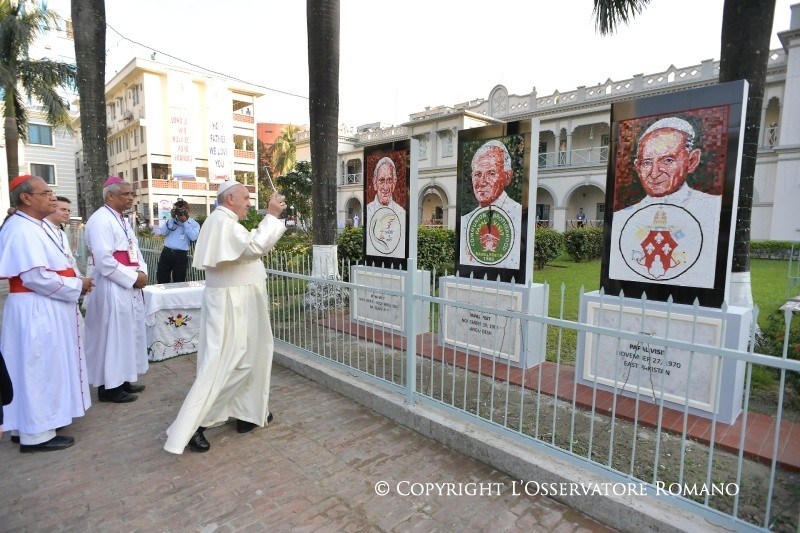
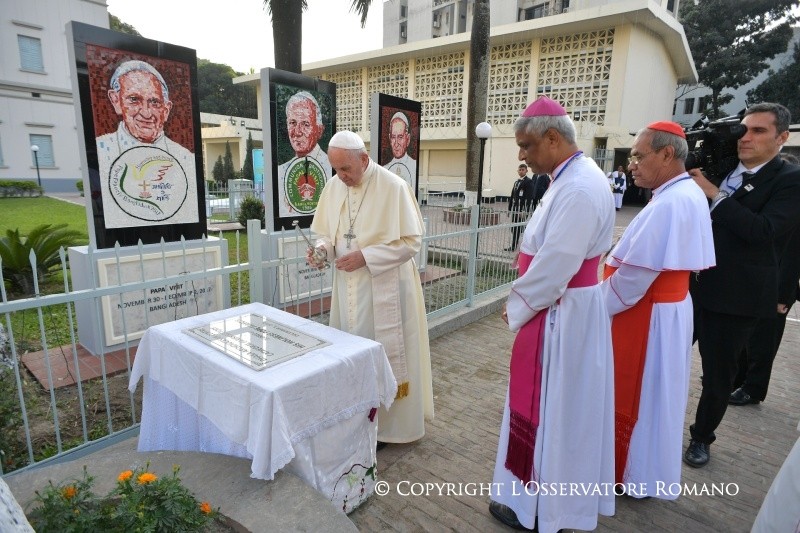
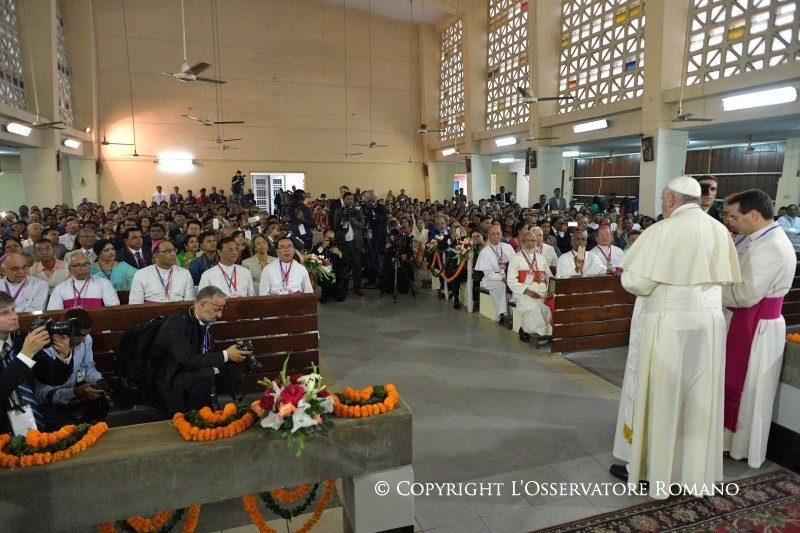


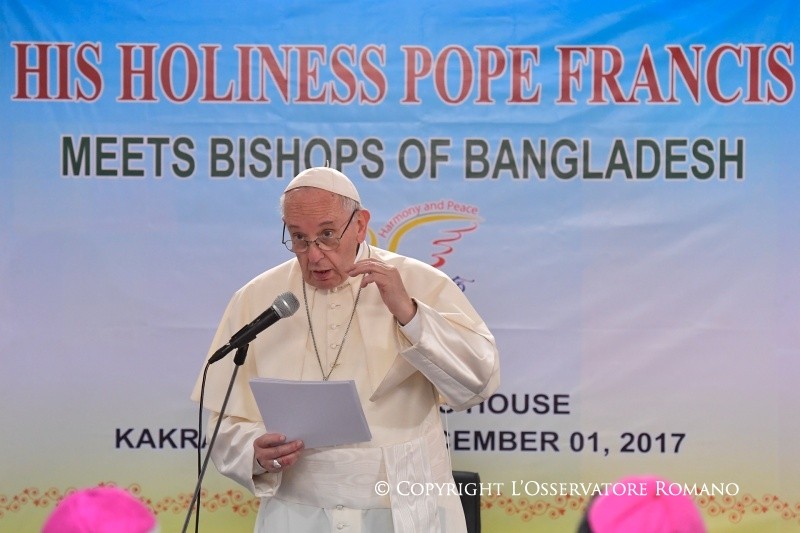
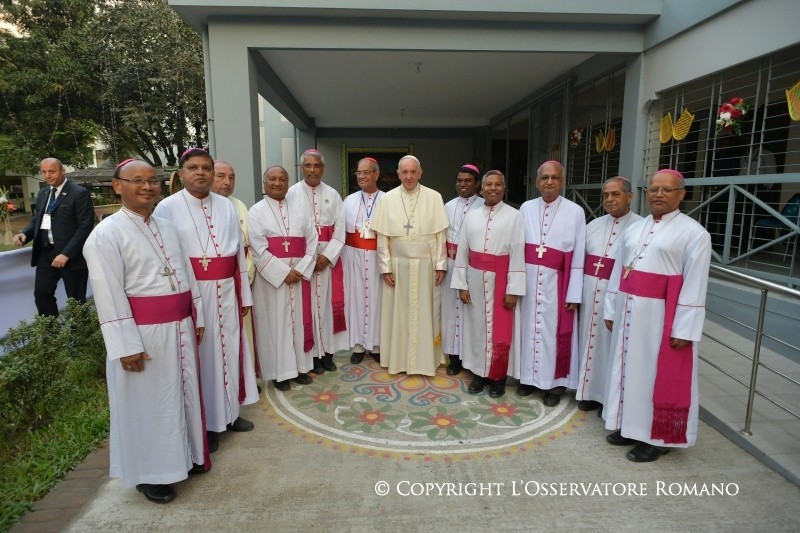
17:00 pm - Ngài tham dự cuộc Gặp Gỡ Đại Kết và Liên Tôn cho Hòa Bình ở Khu Vườn Tư Dinh Tổng Giám Mục
Francis arrives aboard a rickshaw led by a young Bengali, under the large tent set up in the garden of the Archbishopric of Dhaka. The inter-religious and ecumenical meeting is the last appointment of the day that ends with the Pope’s embrace with some refugees Rohingya. Francis’ message is an invitation to build peace and to live among the different faiths not only with a “mere tolerance”, but with an authentic “openness of heart”.
The meeting was attended by Muslim, Hindu, Buddhist and Christian-Catholic and Anglican leaders. Almost everyone in their greetings mentions the tragedy of the Rohingya and utters strong words against fundamentalist terrorism. When he takes the floor, Bergoglio is visibly tired after the busy day. He says that the purpose of the meeting is “to deepen our friendship” and “ express our shared desire for the gift of genuine and lasting peace”. He mentions the songs and dances that enlivened the assembly as a sign of “harmony, fraternity and peace embodied in the teachings of the world’s religions.”
“May our meeting this afternoon - Francis adds - be a clear sign of the efforts of the leaders and followers of the religions present in this country to live together in mutual respect and good will. In Bangladesh, where the right to religious freedom is a founding principle, this commitment stands as a subtle yet firm rebuke to those who would seek to foment division, hatred and violence in the name of religion”.
This entails more “than mere tolerance”, and “it challenges us to reach out to others in mutual trust and understanding, and so to build a unity that sees diversity not as a threat, but as a potential source of enrichment and growth. It challenges us to cultivate an openness of heart that views others as an avenue, not a barrier. This openness of heart, Bergoglio explains, is the condition for a culture of encounter and has three characteristics: “first, it is a door. It is not an abstract theory but a lived experience. It enables us to embark on a dialogue of life, not a mere exchange of ideas. It calls for good will and acceptance, yet it is not to be confused with indifference or reticence in expressing our most deeply held convictions. To engage fruitfully with another means sharing our distinct religious and cultural identity, but always with humility, honesty and respect.
“Openness of heart is also like a ladder that reaches up to the Absolute. By recalling this transcendent dimension of our activity, we realize the need for our hearts to be purified, so that we can see all things in their truest perspective”. And finally, Openness of heart is likewise a path that leads to the pursuit of goodness, justice and solidarity.
Francis recalls that the different religious communities in Bangladesh “have embraced this path in a particular way by their commitment to the care of the earth, our common home, and by their response to the natural disasters that have beset the nation in recent years.” He then cites “the common manifestation of pain, prayer and solidarity that accompanied the tragic collapse of Rana Plaza, which remains impressed on everyone’s mind”. A reference to the terrible collapse of an eight-storey commercial building in Savar in April 2013, a district in the large area of Dhaka, where 1129 people lost their lives working in a textile factory who were forced to work despite the cracks in the building.
The Pope concludes by invoking a “spirit of openness, acceptance and cooperation between believers”, which “ does not simply contribute to a culture of harmony and peace” but “it is its beating heart”. How much our world needs this heart to beat strongly - Francis says - to counter the virus of political corruption, destructive religious ideologies, and the temptation to turn a blind eye to the needs of the poor, refugees, persecuted minorities, and those who are most vulnerable”.
http://www.lastampa.it/2017/12/01/vaticaninsider/eng/the-vatican/the-pope-diversity-is-not-a-threat-let-us-build-peace-with-confidence-Ut9BcAPuOHejnaOj3d9O9L/pagina.html
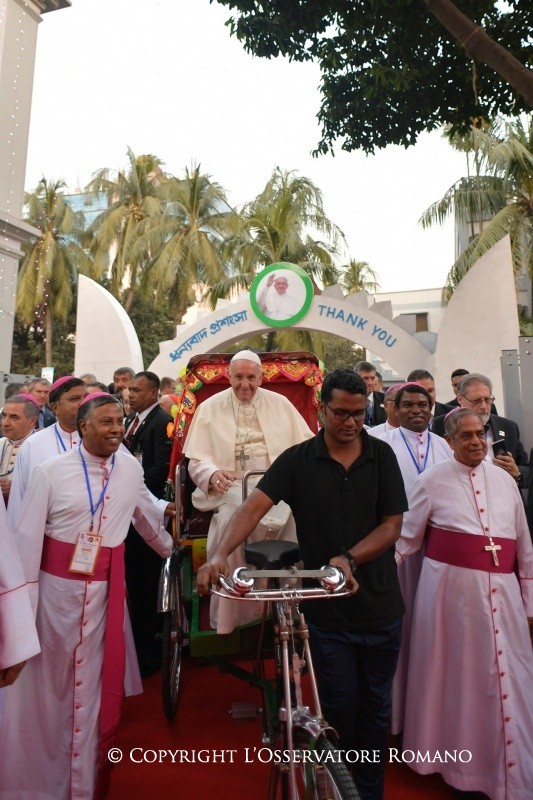
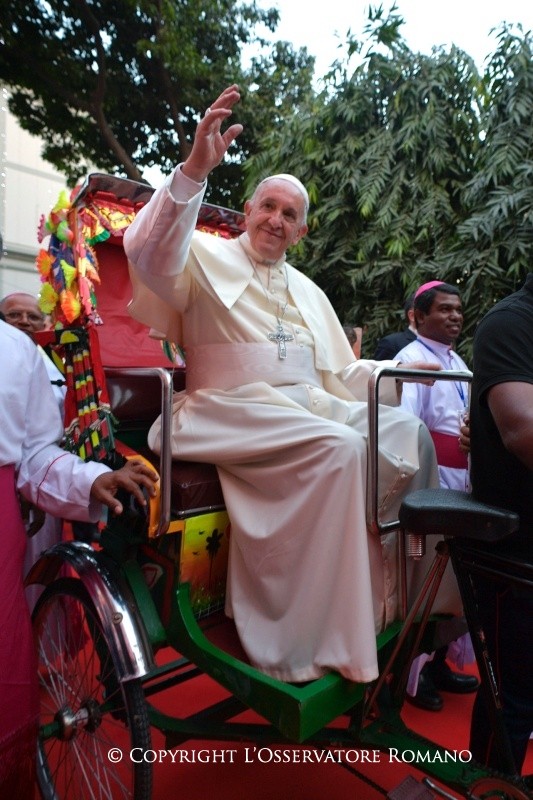
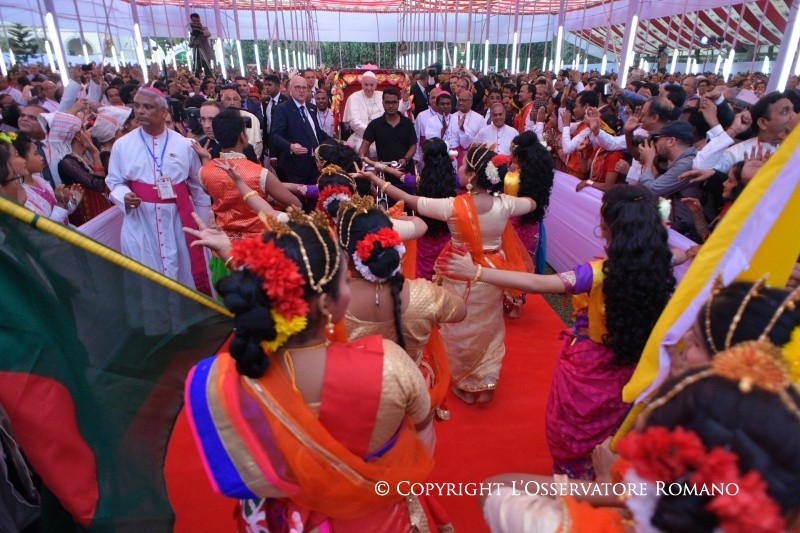

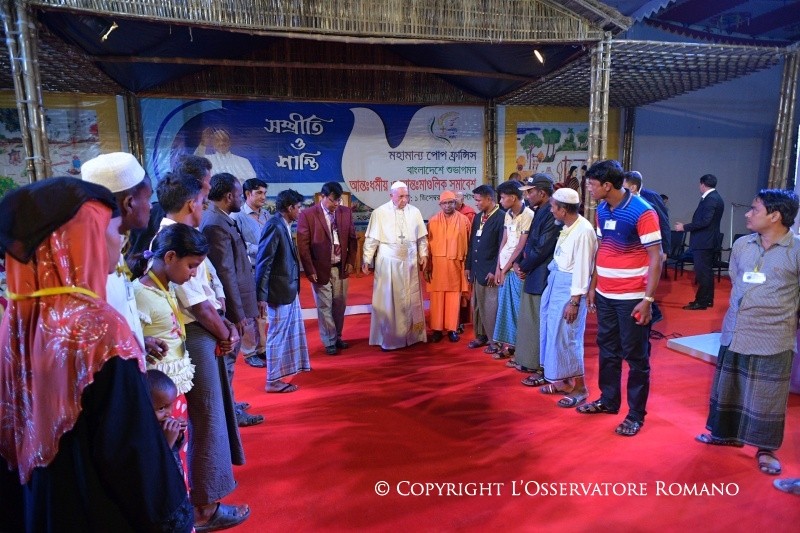
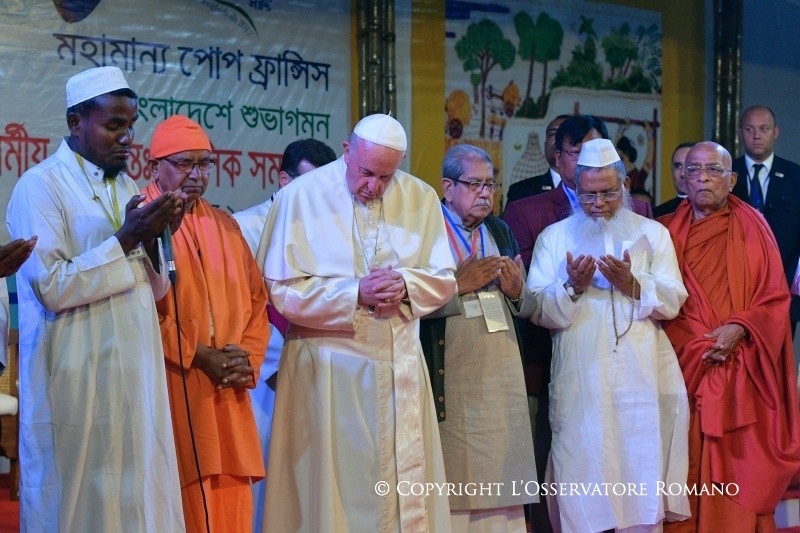


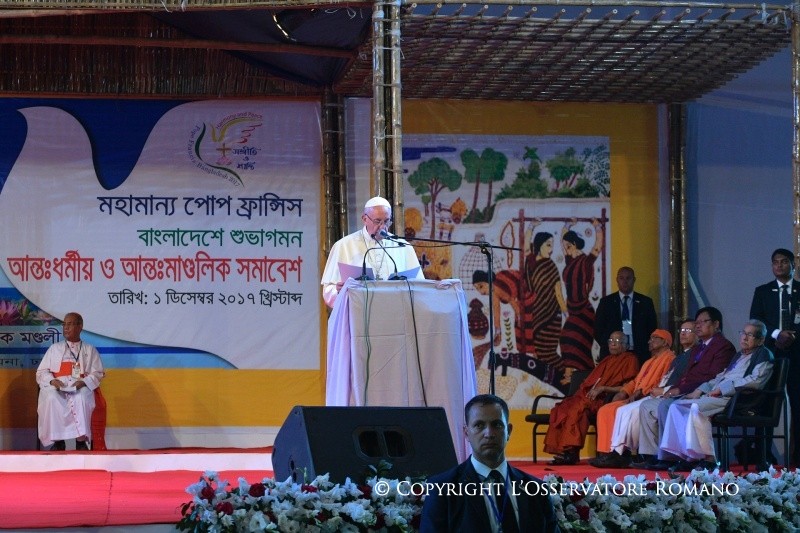
ECUMENICAL AND INTERRELIGIOUS MEETING FOR PEACE
ADDRESS OF THE HOLY FATHER
Distinguished Guests,
Dear Friends,
Our meeting, which brings together representatives of the various religious communities present in this country, represents a highly significant moment in my Visit to Bangladesh. For we have gathered to deepen our friendship and to express our shared desire for the gift of genuine and lasting peace.
My thanks go to Cardinal D’Rozario for his kind words of welcome, and to those who have greeted me warmly on behalf of the Muslim, Hindu, Buddhist and Christian communities, and in the name of civil society. I am grateful to the Anglican bishop of Dhaka for his presence, to the various Christian communities, and to all those whose have helped to make this gathering possible.
The words we have heard, but also the songs and dances that have enlivened our assembly, have spoken to us eloquently of the yearning for harmony, fraternity and peace embodied in the teachings of the world’s religions. May our meeting this afternoon be a clear sign of the efforts of the leaders and followers of the religions present in this country to live together in mutual respect and good will. In Bangladesh, where the right to religious freedom is a founding principle, this commitment stands as a subtle yet firm rebuke to those who would seek to foment division, hatred and violence in the name of religion.
It is a particularly gratifying sign of our times that believers and all people of good will feel increasingly called to cooperate in shaping a culture of encounter, dialogue and cooperation in the service of our human family. This entails more than mere tolerance. It challenges us to reach out to others in mutual trust and understanding, and so to build a unity that sees diversity not as a threat, but as a potential source of enrichment and growth. It challenges us to cultivate an openness of heart that views others as an avenue, not a barrier.
Allow me to explore with you briefly some essential features of this “openness of heart” that is the condition for a culture of encounter.
First, it is a door. It is not an abstract theory but a lived experience. It enables us to embark on a dialogue of life, not a mere exchange of ideas. It calls for good will and acceptance, yet it is not to be confused with indifference or reticence in expressing our most deeply held convictions. To engage fruitfully with another means sharing our distinct religious and cultural identity, but always with humility, honesty and respect.
Openness of heart is also like a ladder that reaches up to the Absolute. By recalling this transcendent dimension of our activity, we realize the need for our hearts to be purified, so that we can see all things in their truest perspective. As with each step our vision becomes clearer, we receive the strength to persevere in the effort to understand and value others and their point of view. In this way, we will find the wisdom and strength needed to extend the hand of friendship to all.
Openness of heart is likewise a path that leads to the pursuit of goodness, justice and solidarity. It leads to seeking the good of our neighbours. In his letter to the Christians in Rome, Saint Paul urged his hearers: “Do not be overcome by evil, but overcome evil with good” (Rom 12:21). This is a sentiment that all of us can echo. Religious concern for the welfare of our neighbour, streaming from an open heart, flows outward like a vast river, to quench the dry and parched wastelands of hatred, corruption, poverty and violence that so damage human lives, tear families apart, and disfigure the gift of creation.
Bangladesh’s different religious communities have embraced this path in a particular way by their commitment to the care of the earth, our common home, and by their response to the natural disasters that have beset the nation in recent years. I think too of the common outpouring of grief, prayer and solidarity that accompanied the tragic collapse of Rana Plaza, which remains fresh in the minds of all. In these various ways, we see how the path of goodness leads to cooperation in the service of others.
A spirit of openness, acceptance and cooperation between believers does not simply contribute to a culture of harmony and peace; it is its beating heart. How much our world needs this heart to beat strongly, to counter the virus of political corruption, destructive religious ideologies, and the temptation to turn a blind eye to the needs of the poor, refugees, persecuted minorities, and those who are most vulnerable. How much, too, is such openness needed in order to reach out to the many people in our world, especially the young, who at times feel alone and bewildered as they search for meaning in life!
Dear friends, I thank you for your efforts to promote the culture of encounter, and I pray that, by demonstrating the common commitment of believers to discerning the good and putting it into practice, they will help all believers to grow in wisdom and holiness, and to cooperate in building an ever more humane, united and peaceful world.
I open my own heart to all of you, and I thank you once more for your welcome. Let us remember one another in our prayers.
http://w2.vatican.va/content/francesco/en/speeches/2017/december/documents/papa-francesco_20171201_viaggioapostolico-bangladesh-pace.html
It is a moving encounter, made of glances, gestures and tears, more than words. A group of Rohingya refugees climbed on the stage at the end of the inter-religious encounter. After the ecumenical prayer presided over by the Anglican bishop, who kneeled in front of the Pontiff and asked to be blessed, the Rohingya approached. They are a group of sixteen, 12 men, two women and two girls. The two women are wearing the veil as well as the niqab on their faces, but they eventually lower it. Thousands of people welcome them with applause and after the first greetings, when Bergoglio speaks briefly to them, the images and audio are cut off.
They parade one by one to greet the Pope, who decided to stay with them even after the end of the public event. Francis rests his hand on the head of some of them, he listened with a serious face and heartfelt participation to their stories and their requests. Bergoglio launched a strong public appeal in their favor last August, he spoke about minority’rights to the Burmese authorities, and yesterday, he asked the international community to intervene in this humanitarian emergency and finally today, he made visible his closeness and sharing in their suffering.
The Pope told them, “We are close to you, your situation is very harsh. In the name of all those who hurt you, for the indifference of the world, I ask for forgiveness. Dear brothers and sisters - added Bergoglio - all of us are created in God’s image, we are all images of the living God. Your religion teaches us that at first God took a bit of salt and threw it into the water that is the soul of all men, and each one of us carries some of this salt. These brothers and sisters carry within the salt of God “.
Some Rohingya cry. “Dear brothers and sisters, just let the world see what the egoism of the world does with the image of God. Let us continue to do good to them, to help them, let us continue to move so that their rights are recognized, let us not close our hearts. We shall not look away. The presence of God today is also called Rohingya. Each of us shall give their own answer. Then Francis finally assured that he will do “all I can to help you”.
Ngày 30/11
Ngày thứ bốn trong chuyến tông du này của ĐTC Phanxicô là ngày chuyển tiếp giữa Miến Điện và Bangladesh. Sáng ngài từ giã Miến Điện và chiều ngài ở Bangladesh. Sinh hoạt mục vụ của ngài ở cả hai nước hôm nay bao gồm thứ tự như sau:
10:15 am - Ngài dâng Lễ với Giới Trẻ Miến Điện ở Vương Cung Thánh Đường Thánh Maria
12:45 pm - Ngài tạ từ Miến Điện ở phi trường Yangon
15:00 pm - Ngài được nghênh đón ở phi trường Dhaka Nước Bangladesh
16:00 pm - Ngài đến thăm Đài Tưởng Niệm Tử Đạo Savar Quốc Gia Bangladesh
16:45 pm - Ngài đến Bảo Tàng Viện Tưởng Niệm Vị Quốc Tổ Bangabandhu
17:30 pm - Ngài đến thăm Vị Quốc Trưởng Banladesh ở Dinh Tổng Thống
18:00 pm - Ngài gặp gỡ Các Vị Thẩm Quyền Chính Trị và Dân Sự cùng Ngoại Giáo Đoàn của nước này ở Dinh Tổng Thống
10:15 am - Ngài dâng Lễ với Giới Trẻ Miến Điện ở Vương Cung Thánh Đường Thánh Maria



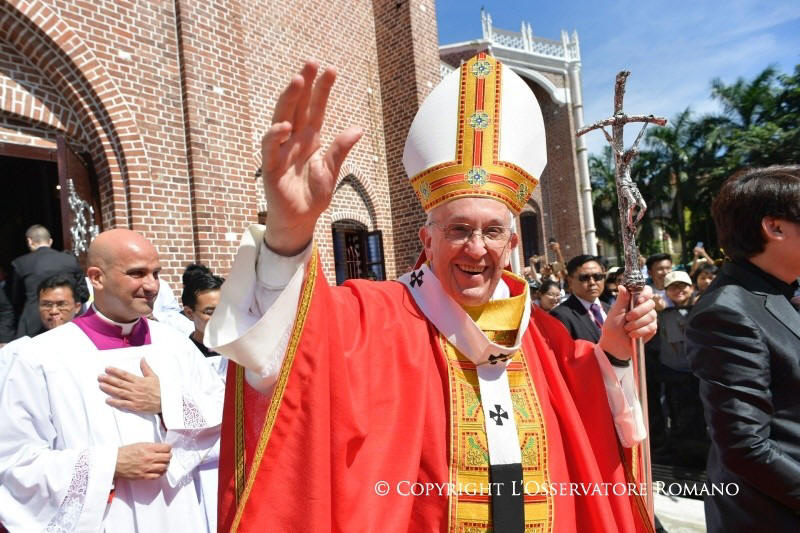
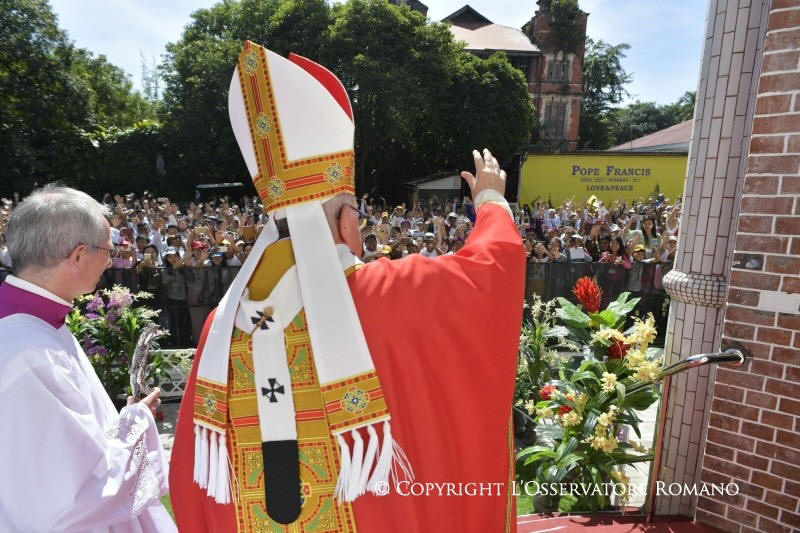
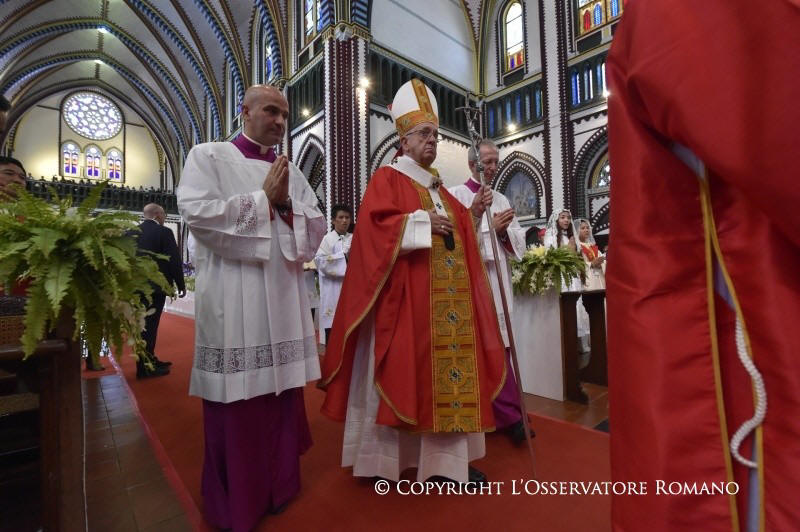
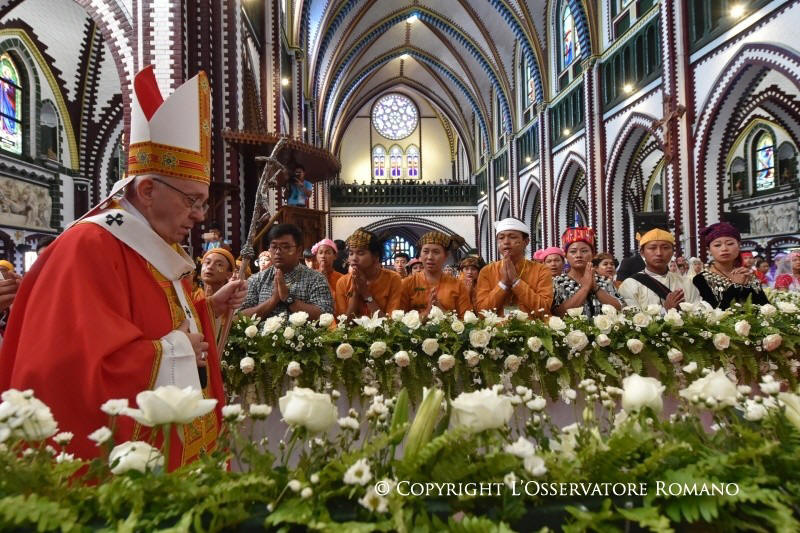
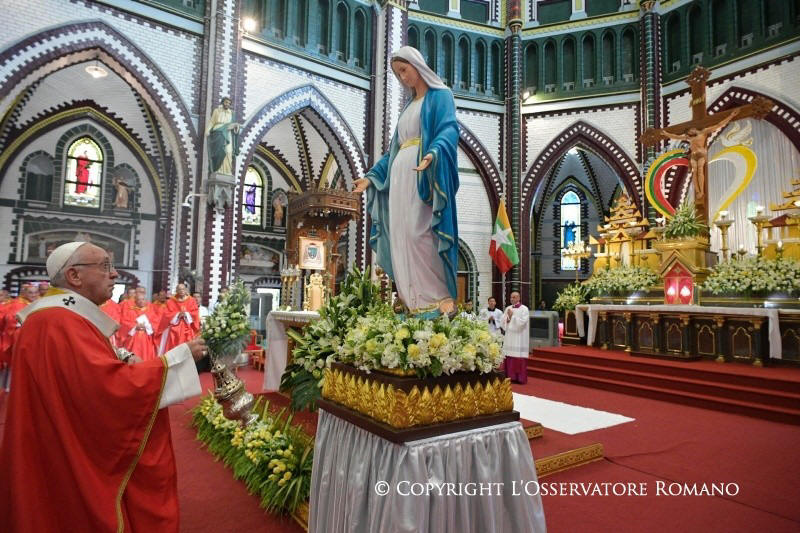
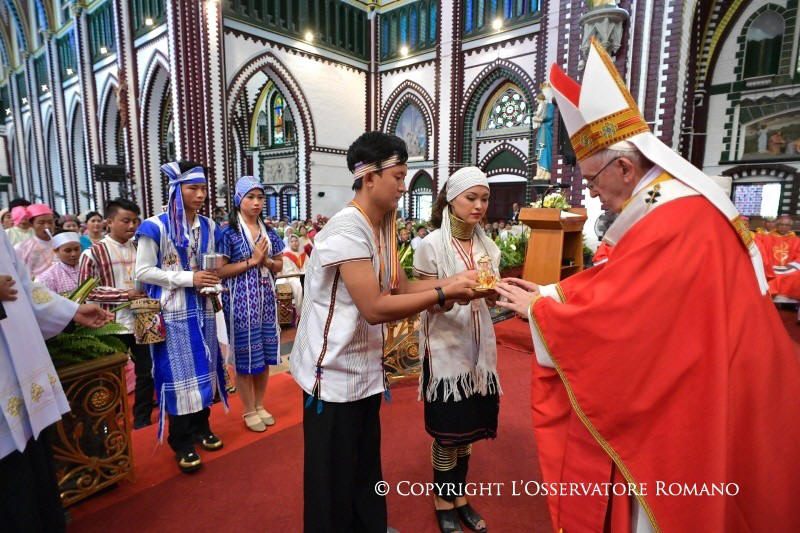
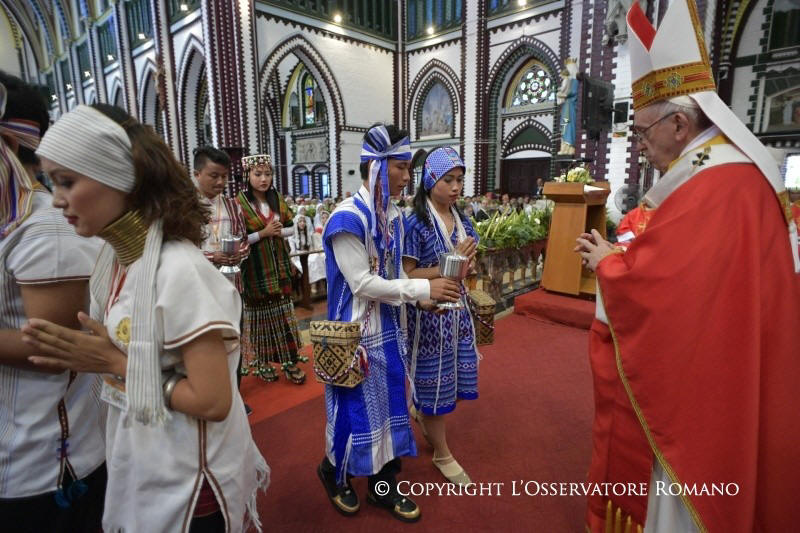
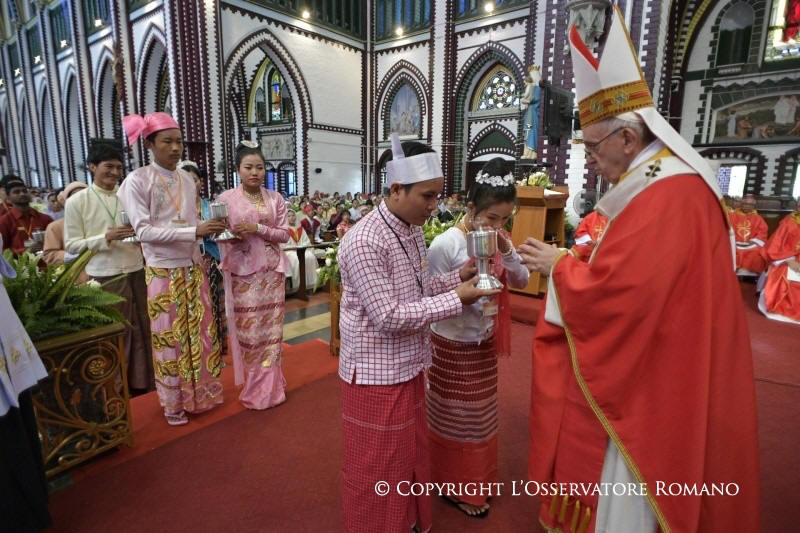
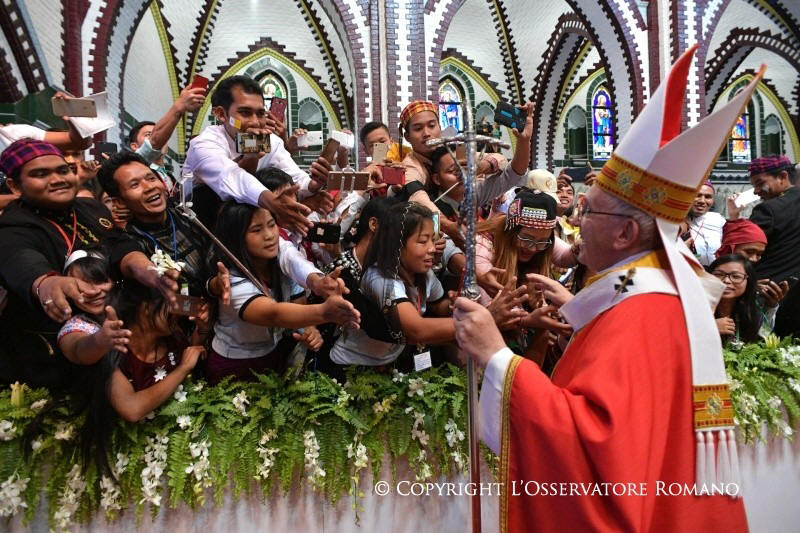
HOMILY OF HIS HOLINESS POPE FRANCIS
St Mary’s Cathedral (Yangon)
Thursday, 30 November 2017
As my visit to your beautiful country draws to a close, I join you in thanking God for the many graces we have received in these days. Looking out at you, the young people of Myanmar, and all those who are united with us outside this cathedral, I want to share with you a phrase from today’s first reading that resonates within me. Taken from the prophet Isaiah, it was echoed by Saint Paul in his letter to the young Christian community in Rome. Let us listen once again to those words: “The footsteps of those who bring good news are a welcome sound” (Rom 10:15; cf. Is 52:7).
Dear young people of Myanmar, hearing your young voices and listening to you sing today, I want to apply those words to you. Yes, you are “a welcome sound”; you are a beautiful and encouraging sight, for you bring us ‘good news’, the good news of your youth, your faith and your enthusiasm. Indeed, you are good news, because you are concrete signs of the Church’s faith in Jesus Christ, who brings us a joy and a hope that will never die.
Some people ask how it is possible to speak of good news when so many people around us are suffering? Where is the good news when so much injustice, poverty and misery cast a shadow over us and our world? But I want a very clear message to go out from this place. I want people to know that you, the young men and women of Myanmar, are not afraid to believe in the good news of God’s mercy, because it has a name and a face: Jesus Christ. As messengers of this good news, you are ready to bring a word of hope to the Church, to your own country, and to the wider world. You are ready to bring good news for your suffering brothers and sisters who need your prayers and your solidarity, but also your enthusiasm for human rights, for justice and for the growth of that “love and peace” which Jesus brings.
But I also have a challenge to set before you. Did you listen carefully to the first reading? There Saint Paul repeats three times the word unless. It is a little word, but it asks us to think about our place in God’s plan. In effect, Paul asks three questions, and I want to put them to each of you personally. First, how are people to believe in the Lord unless they have heard about him? Second, how are people to hear about the Lord unless they have a messenger, someone to bring the good news? And third, how can they have a messenger unless one is sent?” (Rom 10:14-15).
I would like all of you to think deeply about these questions. But don’t be worried! As a loving “father” (or better, a “grandfather”!), I don’t want you to wrestle with these questions alone. Let me offer a few thoughts that can guide you on your journey of faith, and help you to discern what it is that the Lord is asking of you.
Saint Paul’s first question is: “How are people to believe in the Lord unless they have heard about him?” Our world is full of many sounds, so many distractions, that can drown out God’s voice. If others are to hear and believe in him, they need to find him in people who are authentic. People who know how to listen! That is surely what you want to be! But only the Lord can help you to be genuine, so talk to him in prayer. Learn to hear his voice, quietly speaking in the depths of your heart.
But talk also to the saints, our friends in heaven who can inspire us. Like Saint Andrew, whose feast we keep today. Andrew was a humble fisherman who became a great martyr, a witness to the love of Jesus. But before he became a martyr, he made his share of mistakes, and he needed to be patient, and to learn gradually how to be a true disciple of Christ. So do not be afraid to learn from your own mistakes! Let the saints lead you to Jesus and teach you to put your lives in his hands. You know that Jesus is full of mercy. So share with him all that you hold in your hearts: your fears and your worries, as well as your dreams and your hopes. Cultivate your interior life, as you would tend a garden or a field. This takes time; it takes patience. But like a farmer who waits for the crops to grow, if you wait the Lord will make you bear much fruit, a fruit you can then share with others.
Paul’s second question is: “How are they to hear about Jesus without a messenger?” Here is a great task entrusted in a special way to young people: to be “missionary disciples”, messengers of the good news of Jesus, above all to your contemporaries and friends. Do not be afraid to make a ruckus, to ask questions that make people think! And don’t worry if sometimes you feel that you are few and far between. The Gospel always grows from small beginnings. So make yourselves heard. I want you to shout! But not with your voices. No! I want you to shout with your lives, with your hearts, and in this way to be signs of hope to those who need encouragement, a helping hand to the sick, a welcome smile to the stranger, a kindly support to the lonely.
Paul’s last question is: “How can people have a messenger unless one is sent?” At the end of this Mass we will all be sent forth, to take with us the gifts we have received and to share them with others. This can be a little daunting, since we don’t always know where Jesus may be sending us. But he never sends us out without also walking at our side, and always just a little in front, leading us into new and wonderful parts of his kingdom.
How does our Lord send Saint Andrew and his brother Simon Peter in today’s Gospel? “Follow me!”, he tells them (Mt 4:19). That is what it means to be sent: to follow Christ, and not to charge ahead on our own! The Lord will invite some of you to follow him as priests, and in this way to become “fishers of men”. Others he will call to become religious or consecrated men and women. And yet others he will call to the married life, to be loving fathers and mothers. Whatever your vocation, I urge you: be brave, be generous and, above all, be joyful!
Here in this beautiful cathedral dedicated to Our Lady’s Immaculate Conception, I encourage you to look to Mary. When she said “yes” to the message of the angel, she was young, like yourselves. Yet she had the courage to trust in the “good news” she had heard, and to express it in a life of faithful dedication to her vocation, total self-giving, and complete trust in God’s loving care. Like Mary, may all of you be gentle but courageous in bringing Jesus and his love to others.
Dear young people, with great affection I commend all of you, and your families, to her maternal intercession. And I ask you, please, to remember to pray for me.
God bless Myanmar! [ Myanmar pyi ko Payarthakin Kaung gi pei pa sei ]
XIN XEM BẢN DỊCH TIẾNG VIỆT SAU. TỪ NAY TỚI HẾT THỨ BẢY, NGƯỜI DỊCH BẬN NHIỀU SINH HOẠT KHÔNG THỂ TIẾP TỤC CHUYỂN DỊCH NHƯ 3 NGÀY ĐẦU, HY VỌNG SẮP XẾP ĐƯỢC GIỜ ĐỂ TRỞ LẠI DỊCH SAU. XIN THÔNG CẢM. TRONG KHI CHỜ ĐỢI XIN TẠM XEM HÌNH ẢNH VÀ BẢN TIẾNG ANH . HẾT LÒNG ĐA TẠ.
15:00 pm - Ngài được nghênh đón ở phi trường Dhaka Nước Bangladesh

Pope Francis arrived in Dhaka, capital of Bangladesh, becoming the second Pontiff to visit the country, after Saint John Paul II in 1986.
The Pope’s plane landed at Dhaka’s International Airport at 3:00 pm (10:00 am in Rome).
The President of the Republic of Bangladesh, Abdul Hamid, welcomed the Holy Father on his arrival.
During the welcome ceremony, two children dressed in the country’s typical costumes gave the Pontiff flowers and a jar of earth, which the Pope blessed.
Some political and civil Authorities of Bangladesh were present, as well as a group of faithful and 40 children who danced a traditional dance.
As is usual in the Pontiff’s Apostolic Journeys, he was given military honors and hymns were played. Then the respective delegations were introduced.
At the end of the meeting, the Pope took his leave amid traditional dances. He then went to the Monument of National Martyrs of Savar.
16:00 pm - Ngài đến thăm Đài Tưởng Niệm Tử Đạo Savar Quốc Gia Bangladesh
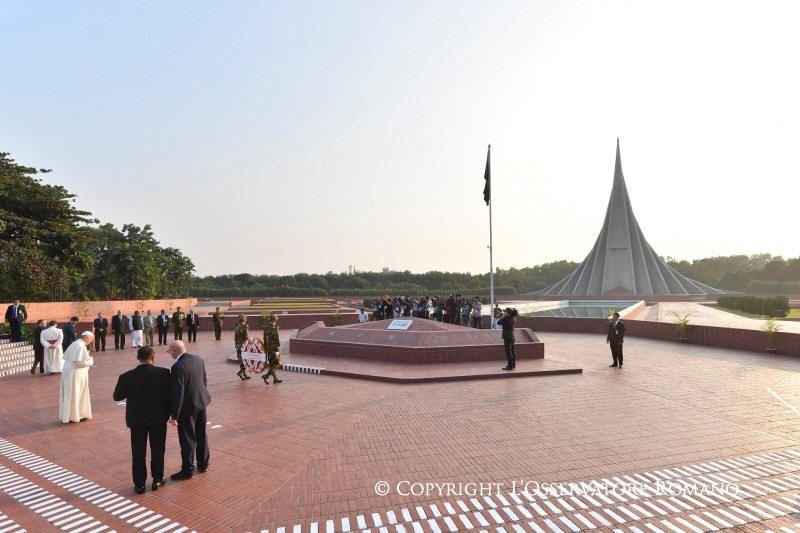
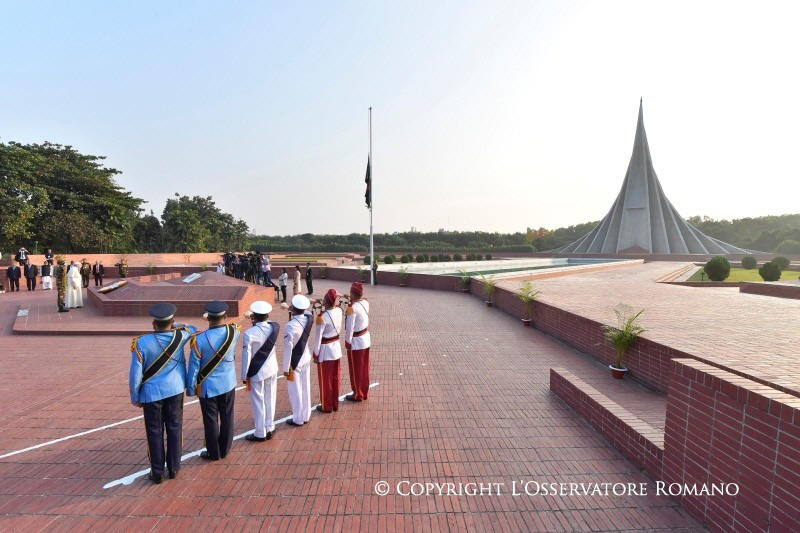
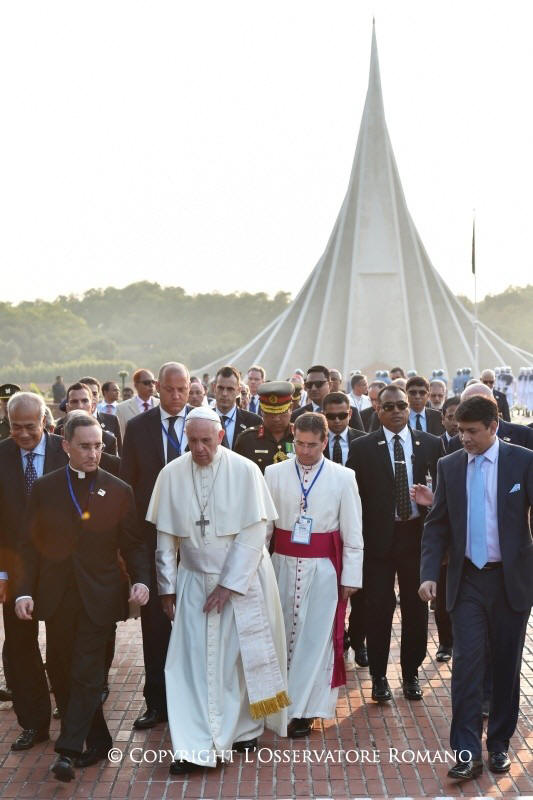
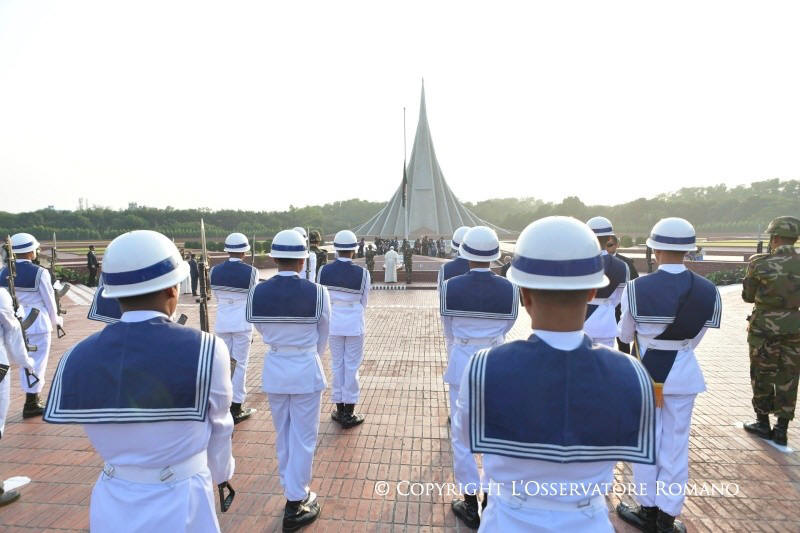
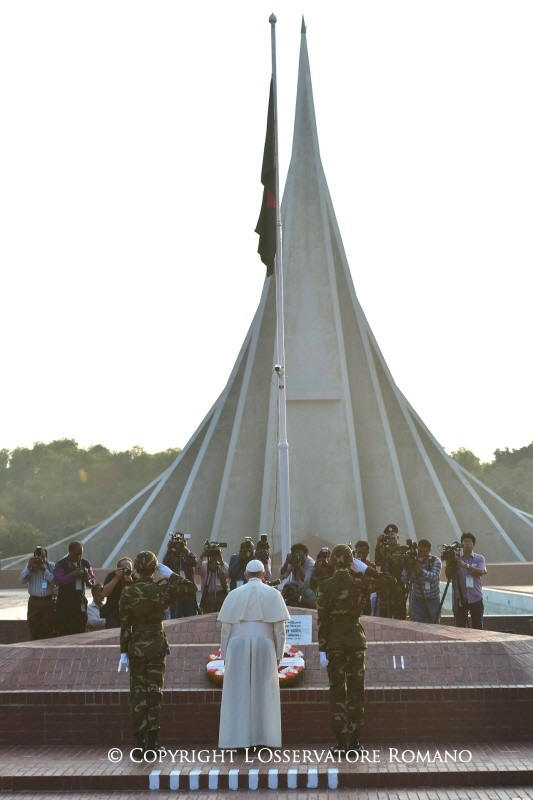
16:45 pm - Ngài đến Bảo Tàng Viện Tưởng Niệm Vị Quốc Phụ Bangabandhu
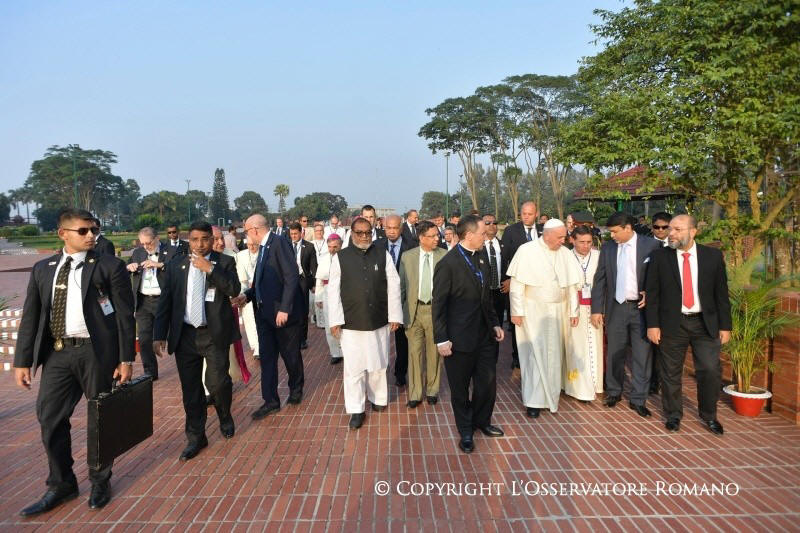

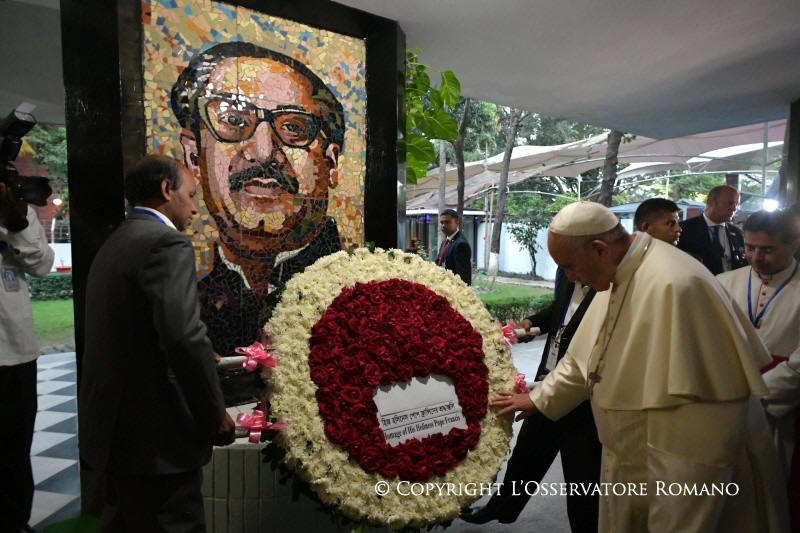
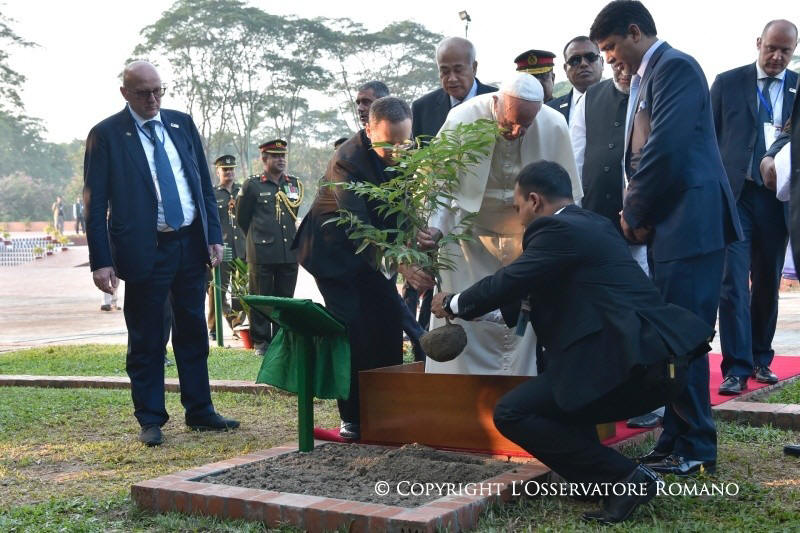
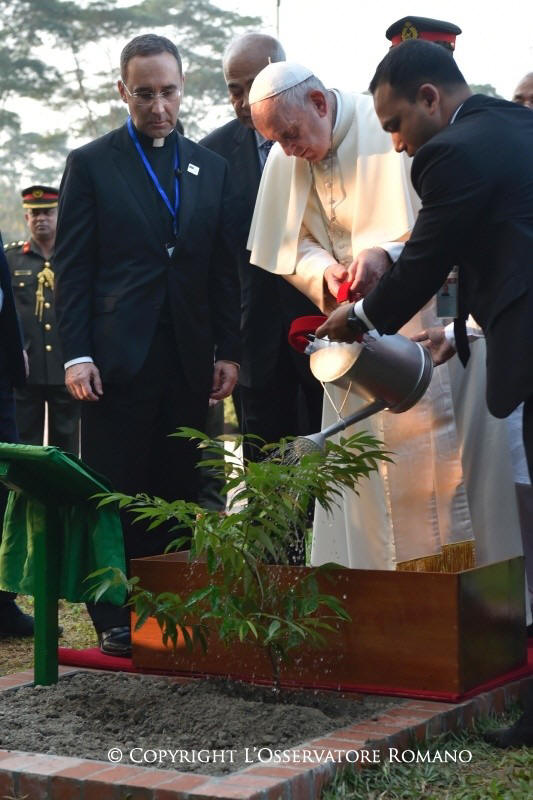
With the temperature soaring to almost 30 degrees centigrade, Pope Francis went by car to the National Monument of Martyrs of Savar, a few kilometers from the capital, at around 4:00 pm local time (11:00 am in Rome), after the welcome ceremony in Dhaka’s International Airport.
At the Monument, erected in memory of all those who fought for independence from Pakistan in 1971, during the “War of Liberation,” the Holy Father placed a floral wreath.
On his arrival, Civil Authorities received the Pontiff and accompanied him to the Monument, where the Guard of Honour was present.
Mujibur Rahman, Father of the Nation
The Holy Father signed the Book of Honour and planted a tree in the “Garden of Peace,” before going to the Commemorative Museum of Bangabandhu to pay homage to the “Father of the Nation,” Sheikh Mujibur Rahman.
Francis arrived there at 4:45 pm local time ((11:45 in Rome), and was received by members of Sheikh Mujibur Rahman’s family, who was assassinated in 1975.
Mujibur Rahman, father of the present Prime Minister, Sheikh Hasina, known popularly as “Banganbandhu” or friend of the Bengalis, assumed a distinguished political role in what was then the Eastern region of Pakistan, shortly after the partition of the Indian Sub-Continent in 1947, reported the newspaper “La Vanguardia.”
Rahman, whose face is on bills [notes] and in every corner of Bangladesh, is considered by the majority the principal figure of Independence, although in polarized Bangladesh, the Opposition Nationalist Party (BNP) defends the role of its founder, former President Ziaur Rahman, the General who read the Declaration of Independence.
17:30 pm - Ngài đến thăm Vị Quốc Trưởng Banladesh ở Dinh Tổng Thống


Pope Francis talked privately with Abul Hamid, President of the Republic of Bangladesh, a few hours after his arrival in the country, on November 30, 2017.
The President himself received the Pope at the airport of Dhaka, the Bangladeshi capital, where military honors took place in the afternoon. Then their second interview was held in the Presidential Palace, around 5:30 pm local time (12:30 in Rome). When he got out of the car, the Military Secretary received the Holy Father and accompanied him to the Entrance of Honour, where Abdul Hamid was waiting for him.
The Pontiff and the President talked in private in the Credentials Hall, before the traditional exchange of gifts. The Pope gave the President a manuscript of the Apostolic Vatican Library dated 1472. The work in membrane, of a large format (597×427 mm.)
tains the eight books of the Geography of Claudio Tolomeo (2nd century AD, in the Latin translation by Iacopo Angeli da Scarperia. One finds there, notably, a description of Asia.
After this interview, the Holy Father met with the country’s Authorities, with representatives of the civil society and of the Diplomatic Corps, to whom he gave an address. In the course of this visit, Pope Francis signed the Visitors’ Book, wishing in English “that the Almighty bless all the beloved people of Bangladesh with gifts of peace and joy.”
President Abdul Hamid takes the floor, “Our government has given refuge to one million Rohingya who have been forced to leave their ancient homeland in the state of Rakhine in Myanmar. Thousands of them, including women and children, were brutally killed and the women raped.” The President thanked the Pope for “the position he has taken in favor of the suffering Rohingya” and how his “your passionate voice against this brutality gives us hope for a solution to the crisis.” “Your closeness to them, your appeal to help them and grant them full rights tasks the international community to act promptly.”
18:00 pm - Ngài gặp gỡ Các Vị Thẩm Quyền Chính Trị và Dân Sự cùng Ngoại Giáo Đoàn của nước này ở Dinh Tổng Thống
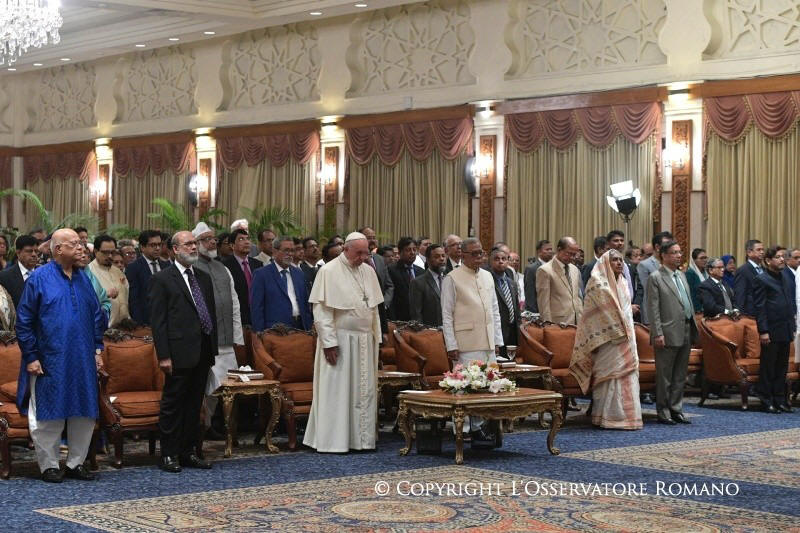
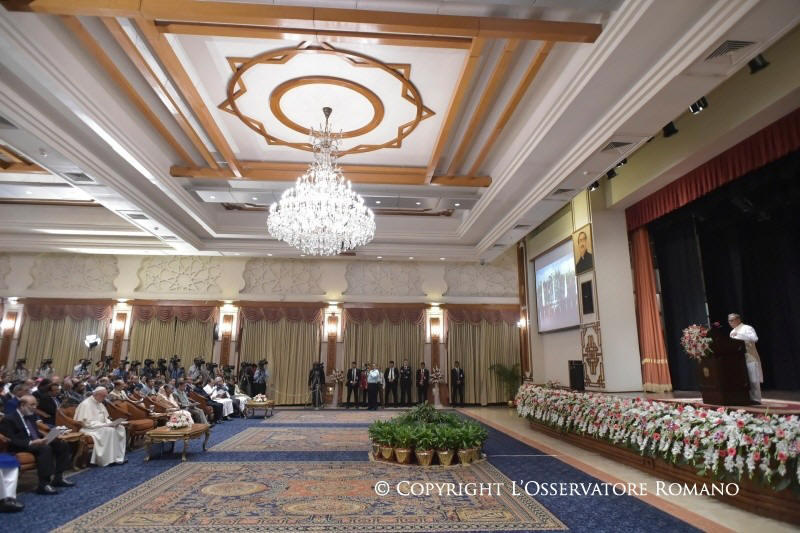
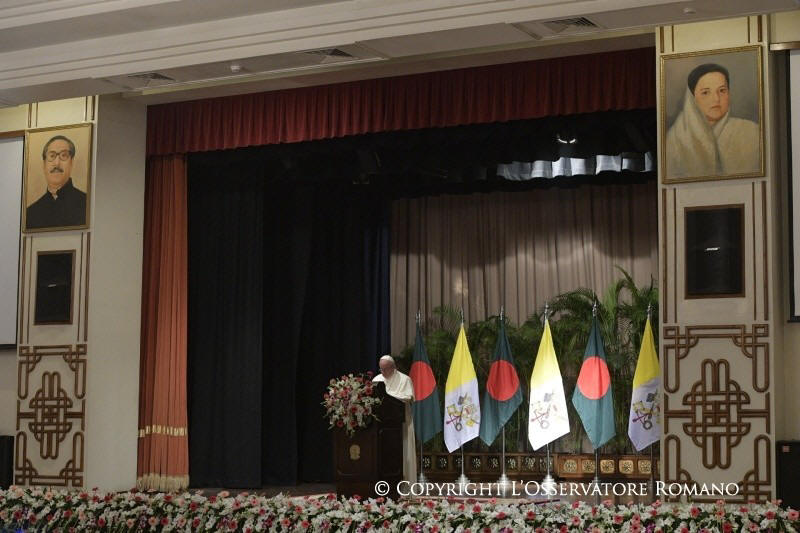

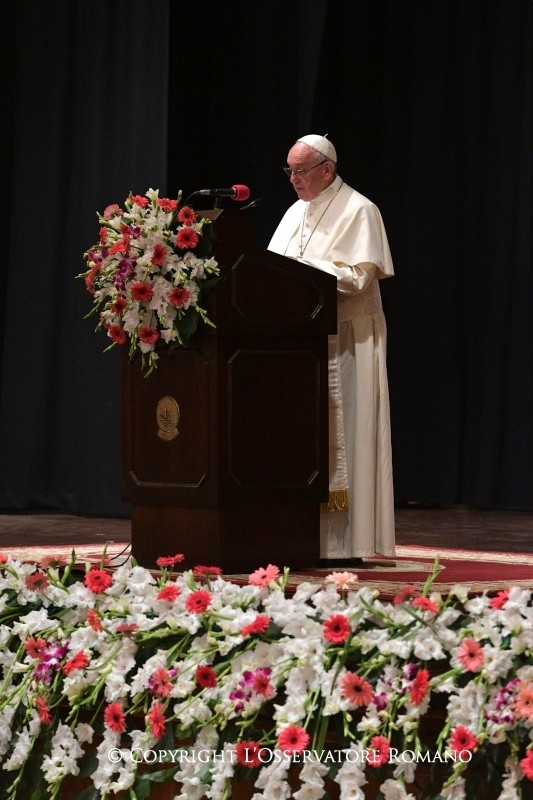
Mr. President,
Honorable State and Civil Authorities,
Your Eminence, My Brother Bishops,
Distinguished Members of the Diplomatic Corps,
Ladies and Gentlemen,
At the beginning of my stay in Bangladesh, I would like to thank you, Mr. President, for the kind invitation to visit this country and for your gracious words of welcome. I come here in the footsteps of two of my predecessors, Pope Paul VI and Pope John Paul II, to pray with my Catholic brothers and sisters, and to offer them a message of affection and encouragement. Bangladesh is a young state, yet it has always had a special place in the heart of the Popes, who from the start have expressed solidarity with its people, sought to accompany them in overcoming initial adversities and supported them in the demanding task of nation-building and development. I am grateful for the opportunity to address this assembly, which brings together men and women with particular responsibilities for shaping the future of Bangladeshi society.
During my flight here, I was reminded that Bangladesh – “Golden Bengal” – is a country united by a vast network of rivers and waterways, great and small. That natural beauty is, I think, symbolic of your particular identity as a people. Bangladesh is a nation that strives to join unity of language and culture with respect for the different traditions and communities which, like so many streams, draw from, and return to enrich, the great current of the political and social life of the country.
In today’s world, no single community, nation or state can survive and make progress in isolation. As members of the one human family, we need one another and are dependent on one another. President Sheikh Mujibur Rahman understood and sought to embody this principle in the national Constitution. He envisioned a modern, pluralistic and inclusive society in which every person and community could live in freedom, peace, and security, with respect for the innate dignity and equal rights of all. The future of this young democracy and the health of its political life are essentially linked to fidelity to that founding vision. For only through sincere dialogue and respect for legitimate diversity can a people reconcile divisions, overcome unilateral perspectives, and recognize the validity of differing viewpoints. Because true dialogue looks to the future, it builds unity in the service of the common good and is concerned for the needs of all citizens, especially the poor, the underprivileged and those who have no voice.
In recent months, the spirit of generosity and solidarity which is a distinguishing mark of Bangladeshi society has been seen most vividly in its humanitarian outreach to a massive influx of refugees from Rakhine State, providing them with temporary shelter and the basic necessities of life. This has been done at no little sacrifice. It has also been done before the eyes of the whole world. None of us can fail to be aware of the gravity of the situation, the immense toll of human suffering involved, and the precarious living conditions of so many of our brothers and sisters, a majority of whom are women and children, crowded in the refugee camps. It is imperative that the international community take decisive measures to address this grave crisis, not only by working to resolve the political issues that have led to the mass displacement of people but also by offering immediate material assistance to Bangladesh in its effort to respond effectively to urgent human needs.
Although my visit is primarily addressed to Bangladesh’s Catholic community, a privileged moment will be my meeting tomorrow in Ramna with ecumenical and interreligious leaders. Together we will pray for peace and reaffirm our commitment to work for peace. Bangladesh is known for the harmony that has traditionally existed between followers of the various religions. This atmosphere of mutual respect and a growing climate of interreligious dialogue enables believers to express freely their deepest convictions about the meaning and purpose of life. In this way, they can contribute to promoting the spiritual values that are the sure basis for a just and peaceful society. In a world where religion is often – scandalously – misused to foment division, such a witness to its reconciling and unifying power is all the more necessary. This was seen in a particularly eloquent way in the common reaction of indignation that followed last year’s brutal terrorist attack here in Dhaka, and in the clear message sent by the nation’s religious authorities that the most holy name of God can never be invoked to justify hatred and violence against our fellow human beings.
Bangladesh’s Catholics, though relatively few in number, nonetheless seek to play a constructive role in the development of the country, particularly through their schools, clinics, and dispensaries. The Church appreciates the freedom to practice her faith and to pursue her charitable works, which benefit the entire nation, not least by providing young people, who represent the future of society, with a quality education and a training in sound ethical and human values. In her schools, the Church seeks to promote a culture of encounter that will enable students to take up their responsibilities in the life of society. Indeed, the vast majority of the students and many of the teachers in these schools are not Christians, but from other religious traditions. I am confident that, in accordance with the letter and the spirit of the national Constitution, the Catholic community will continue to enjoy the freedom to carry out these good works as an expression of its commitment to the common good.
Mr. President, dear friends:
I thank you for your attention and I assure you of my prayers that in your lofty responsibilities, you will always be inspired by the high ideals of justice and service to your fellow citizens. Upon you, and upon all the people of Bangladesh, I willingly invoke the Almighty’s blessings of harmony and peace.
https://zenit.org/articles/bangladesh-a-special-place-in-the-heart-of-popes/
Ngày 29/11
Trong ngày thứ 3 ở Myanmar, ĐTC Phanxicô có 3 cuộc gặp gỡ: với tín hữu Công giáo Myanmar nói chung nơi một Thánh Lễ vào lúc 8:30 sáng ở khu Kyanikkasan Ground, chiều, vào lúc 4:15, ngài gặp Hội Đồng Tối Cao "Sangha" của Các Nhà Sư Phật Giáo ở Kaba Aye Centre, và vào lúc 5:15 ngài gặp gỡ các vị Giám Mục Myanmar ở Sảnh Đường của Vương Cung Thánh Đường Thánh Maria.
8:30 sáng - Dâng Thánh Lễ ở khu Kyanikkasan Ground



"Chúng ta có một cái la-bàn bảo đảm (a sure compass) trước mắt chúng ta, ở nơi Vị Chúa tử giá"
"Chúng ta cần nhớ rằng chúng ta có một cái la-bàn bảo đảm (a sure compass) trước mắt chúng ta, ở nơi Vị Chúa tử giá. Nơi thánh giá, chúng ta thấy được sự khôn ngoan là những gì có thể hướng dẫn đời sống của chúng ta theo ánh sáng xuất phát từ Thiên Chúa. Sự chữa lành cũng xuất phát từ cây thánh giá. Ở đó, Chúa Giêsu đã dâng các thương tích của Người lên Chúa Cha cho chúng ta, những thương tích đã chữa lành chúng ta. Chớ gì chúng ta luôn có được sự khôn ngoan này để tìm thấy nơi các thương tích của Chúa Kitô nguồn mạch của tất cả mọi sự chữa lành!...
"Tôi biết rằng nhiều người ở Myanmar mang những vết thương gây ra bởi bạo lực, những vết thương hữu hình lẫn vô hình. Chước cám dỗ ở đây là đáp trả những thương tích này bằng một thứ khôn ngoan thế gian, một thứ khôn ngoan, như thứ khôn ngoan của vị vua trong bài đọc 1 hôm nay, thật là dở. Chúng ta nghĩ rằng sự chữa lành có thể xuất phát từ nỗi giận dữ và trả thù. Tuy nhiên đường lối trả thù không phải là đường lối của Chúa Giêsu. Đường lối của Chúa Giêsu hoàn toàn khác hẳn. Đường lối của Chúa Giêsu hoàn toàn khác hẳn. Khi lòng hận thù và việc loại trừ dẫn Người tới cuộc khổ nạn và tử nạn của Người thì Người đã đáp trả bằng lòng thứ tha và cảm thương....
"Tôi biết rằng Giáo Hội ở Myanmar đang thực hiện rất nhiều việc việc mang thứ dầu chữa lành của lòng thương xót Chúa đến cho những người khác, nhất là những người cần đến nó nhất. Có các dấu hiệu rõ ràng cho thấy rằng ngay cả khi rất hạn chế phương tiện mà nhiều cộng đồng vẫn đang loan báo Phúc Âm cho những thành phần thiểu số thuộc bộ tộc khác, không bao giờ gây áp lực hay ép buộc mà là luôn mời gọi và đón nhận...
"Gặp nhiều nghèo khổ và khó khăn vậy mà nhiều người trong anh chị em lại đang thực hiện việc trợ giúp cụ thể và tình đoàn kết với người nghèo và khổ đau. Qua thừa tác vụ của các vị giám mục, linh mục, tu sĩ và các giáo lý viên, nhất là qua hoạt động đáng ca ngợi của Catholic Karuna Myarmar và sự trợ giúp rộng lượng của Các Hội Truyền Giáo của Tòa Thánh, mà Giáo Hội ở xứ sở này đang giúp cho rất nhiều con người nam nữ và trẻ em, bất kể tôn giáo hay chủng tộc...
"Tôi có thể thấy được Giáo Hội ở nơi đây đang sống động, Chúa Kitô đang sống động và ở nơi đây với anh chị em cũng như với anh chị em thuộc các cộng đồng Kitô hũu khác của anh chị em. Tôi phấn khích anh chị em hãy tiếp tục chia sẻ với những người khác sự khôn ngoan vô giá mà anh chị em đã nhận được, chia sẻ tình yêu của Thiên Chúa bùng lên nơi trái tim của Chúa Giêsu".
4:15 chiều - Gặp Hội Đồng Tối Cao "Sangha" của Các Nhà Sư Phật Giáo ở Kaba Aye Centre

Cuộc gặp gỡ giữa ĐTC Phanxicô và Hội Đồng Tối Cao "Sangha" Các Sư Phật Giáo diễn ra ở Trung Tâm Kaba Aye, một trong những đền chùa Phật giáo được tôn kính nhất ở Đông Nam Á. Ngôi đền chùa này được xây vào năm 1952, được vươn lên bằng một cái vòm bằng vàng có 6 cột tượng trưng cho 6 Hội Đồng của Phật giáo, mà hội đồng cuối cùng ở đây từ năm 1954 tới 1956.
ĐTC Phanxicô được nghênh đón và chào mừng bởi vị Chủ Tịch Ủy Ban Nhà Nước Sangha Maha Nayaka là Bhaddanta Kymarabhivamsa. Cũng như mọi người, khi bước vào bên trong ngài phải bỏ giầy ra và chỉ mang vớ đen thôi.
Các Nhà Sư ngôi ở những chiếc ghế gỗ trạm trỗ ở một bên sảnh đường, trong khi ĐTC Phanxicô cùng đoàn tùy tùng của ngài ngồi đối diện phía bên kia.
Trong lời ngỏ của mình, vị sư đại diện chia sẻ: "Trong thế giới hiện nay của chúng ta thật là ô nhục khi thấy 'nạn khủng bố và cực đoan quá khích' thực hiện nhân danh niềm tin tôn giáo. Vì tất cả tín lý của tôn giáo chỉ dạy về 'sự thiện của nhân loại', chúng ta không thể chấp nhận nạn khủng bố và cực đoan quá khích xuất phát từ một niềm tin tưởng đạo giáo như thế. Chúng tôi tin rằng nạn khủng bố và cực đoan quá khích là hậu quả của việc dẫn giải sai lầm về những giáo huấn nguyên thủy của tôn giáo của mình, vì có một số tín đồ thêm thắt những tu chính vào các điều giáo huấn nguyên thủy bị áp lực bởi các ước muốn, bản năng, sợ hãi và bất mãn của họ - bốn cái trở ngại cho việc suy nghĩ chính đáng".
"Giúp dân chúng biết hướng về siêu việt thể"
Khi tới phiên mình phát biểu, ĐTC Phanxicô cho biết cuộc gặp gỡ này "cũng là một cơ hội cho chúng ta để khẳng định việc dấn thân cho hòa bình, tôn trọng nhân quyền và công lý cho hết mọi con người nam nữ. Chẳng những ở Myanmar mà còn khắp thế giới nữa, dân chúng cần đến chứng từ chung này nơi các vị lãnh đạo tôn giáo. Vì khi chúng ta cùng chung tiếng nói để khẳng định các thứ giá trị vô hạn về công lý, hòa bình và phẩm vị căn bản của từng con người, là chúng ta cống hiến một thứ ngôn từ hy vọng. Chúng ta giúp cho các tín đồ Phật giáo, Công giáo và tất cả mọi người biết nỗ lực cho việc hòa hợp lớn lao hơn nữa trong cộng đồng của mình".
ĐTC nhắc lại các thứ bất công và xung đột "dường như trở thành hiện tỏ một cách đặc biệt trong thời của chúng ta đây", nhưng ngài xin đừng thoái lui mà hãy theo đuổi "đường lối dẫn đến việc chữa lành, tương kiến và tương kính. Một đường lối theo lòng cảm thương và từ bi ưu ái". Ngài bày tỏ "lòng quí mến đối với tất cả những ai ở Myanmar sống theo các truyền thống Phật giáo. Qua giáo huấn của Phật tổ, cũng như qua chứng từ dấn thân của rất nhiều tu sĩ nam nữ, nhân dân của mảnh đất này đã được hình thành theo các giá trị về sự nhẫn nại, khoan dung và tôn trọng sự sống, cũng như một sự chú trọng thiêng liêng và thật là tôn trọng môi trường thiên nhiên của chúng ta. Như chúng ta đều biết, những thứ giá trị ấy là những gì thiết yếu cho việc phát triển toàn diện của xã hội".
Cái thách đố lớn lao của thời đại chúng ta, ngài tiếp tục, "đó là giúp dân chúng biết hướng về siêu việt thể. Nhờ đó họ có thể nhìn vào một cách sâu xa để biết bản thân mình nhờ đó họ thấy được mối tương liên với tất cả mọi người", khi nhận ra rằng "chúng ta không thể tách mình khỏi nhau". Ngài đã trích dẫn lời của Phật tổ và của Thánh Phanxicô Khó Khăn. "Nếu chúng ta muốn được liên kết như là mục đích của chúng ta thì chúng ta cần thắng vượt tất cả mọi hình thức hiểu lầm, bất khoan dung, thành kiến và hận thù ghen ghét. Chúng ta làm điếu ấy thế nào? Những lời của Phật tổ mở đường cho chúng ta: 'Hãy chế ngự niềm giận dữ bằng nỗi bất giận, hãy chế ngự cái gian ác bằng thiện hảo; hãy chế ngự cái nhỏ mọn bằng lòng quảng đại; hãy chế ngự cái dối trá bằng sự thật'. Những cảm thức ấy cũng được vang lên trong một lời nguyện được cho là của Thánh Phanxicô: 'Lạy Chúa, xin hãy làm cho con trở nên khí cụ bình an của Chúa. Ở đâu ghen ghét thì con gieo yêu thương. Ở đâu tổn thương thì con mang lại tha thứ... Đâu tối tăm thì con chiếu sáng, và đâu buồn sầu thì con mang lại niềm vui".
Ngài hy vọng rằng "sự khôn ngoan này tiếp tục thúc đẩy hết mọi nỗ lực trong việc nuôi dưỡng lòng nhẫn nại và cảm thông, tiếp tục chữa lành các vết thương gây ra bởi xung đột qua những năm tháng đã chia rẽ dân chúng thuộc các nền văn hóa khác nhau, của các chủng tộc khác nhau và của các niềm tin tôn giáo khác nhau. Những nỗ lực như thế không bao giờ chỉ là nhãn quan của các vị lãnh đạo tôn giáo, hoặc thuộc phạm vi của một mình nhà nước. Trái lại, nó thuộc về toàn thể xã hội, tất cả những ai hiện diện trong cộng đồng này, những con người cần phải tham dự vào việc thắng vượt những gì là xung khắc và bất công. Tuy nhiên, trách nhiệm riêng biệt của những ai lãnh đạo về dân sự và tôn giáo đó là bảo đảm rằng hết mọi tiếng nói đều được lắng nghe".
Để thực hiện được như vậy thì "cần các vị lãnh đạo tôn giáo phải hợp tác với nhau hơn nữa... Quí vị biết rằng Giáo Hội Công giáo là một người đồng bạn tự nguyện. Chớ gì các tín đồ Phật giáo và Công giáo cùng bước đi trên con đường chữa lành này, và sát cánh hoạt động cho thiện ích của hết mọi người sống ở mảnh đất này".
5:15 - Gặp các vị Giám Mục Myanmar ở Sảnh Đường của Vương Cung Thánh Đường Thánh Maria
ĐTC Phanxicô đã gặp 22 vị giám mục Myanmar. Giáo Hội Công Giáo ở Myanmar có 3 Tổng Giáo Phận và 13 Giáo Phận, thua Giáo Hội Công Giáo ở Việt Nam 13 giáo phận, trong khi Giáo Hội Công Giáo ở Việt Nam có gần 10 triệu Công giáo, 7% dân số, còn ở Myanmar chưa đầy 1 triệu, 1% dân số. Sau đây là trọn bài chia sẻ của ngài với các vị:
"Chữa lành, phù trợ và ngôn sứ"
Trọng Kính Chư Huynh Giám Mục,
Đối với tất cả chúng ta thì đây là một ngày bận bịu, nhưng cũng là một ngày rất vui! Sáng hôm nay chúng ta đã cùng cử hành Thánh Lễ với tín hữu khắp Myanmar, chiều hôm nay chúng ta gặp gỡ các vị lãnh đạo cộng đồng đa số Phật giáo. Tôi muốn cuộc gặp gỡ của chúng ta tối hôm nay phải là một thời điểm âm thầm tri ân cho những phúc lành này cũng như cho việc âm thầm phản tỉnh về các niềm vui và những thách đố nơi thừa tác vụ của chư huynh là những mục tử của đàn chiên Chúa Kitô nơi xứ sở đây. Tôi xin cám ơn Đức Giám Mục Felix (Lian Khen Thang) về những lời chào mừng thay cho chư huynh và tôi liên kết với tất cả chư huynh bằng niềm cảm mến sâu xa trong Chúa.
Tôi muốn tóm gọn các tư tưởng của tôi vào 3 chữ: chữa lành, phù trợ và ngôn sứ.
Trước hết là chữa lành. Phúc Âm chúng ta rao giảng trên hết là một sứ điệp chữa lành, hòa giải và bình an. Nhờ máu của thập giá Chúa Kitô, Thiên Chúa đã hòa giải thế gian với chính mình Ngài, và đã sai chúng ta làm thành phần sứ giả của ơn chữa lành ấy. Ở Myanmar đây, sứ điệp ấy có một tác dụng đặc biệt, vì xứ sở này đang hoạt động để thắng vượt những chia rẽ đã sâu xa đâm rễ cũng như để xây dựng mối hiệp nhất quốc gia. Đối với chư huynh, những vị chư huynh có một đàn chiên đang mang các vết sẹo của cuộc xung khắc này, và cho thấy chứng từ dũng cảm cho niềm tin của họ cùng các truyền thống cổ xưa của họ, thì việc giảng dạy Phúc Âm chẳng những phải là một nguồn an ủi cùng sức mạnh, mà còn là một hiệu triệu trong việc nuôi dưỡng mối hiệp nhất, lòng bác ái và việc chữa lành trong đời sống của quốc gia đây. Vì mối hiệp nhất chúng ta chia sẻ và cử hành xuất phát từ tính cách đa dạng. Nó trân trọng những cái khác biệt của dân chúng như là lý do cùng nhau thăng hóa và tăng trưởng. Nó mời gọi dân chúng đến với nhau trong một nền văn hóa gặp gỡ và liên kết.
Trong thừa tác vụ giáo phẩm của mình, chớ gì chư huynh liên lỉ cảm thấy được việc hướng dẫn và trợ giúp của Chúa nơi các nỗ lực của chư huynh trong việc nuôi dưỡng sự chữa lành và mối hiệp thông ở mọi tầng lớp nơi đời sống của Giáo Hội, để nhờ gương tha thứ và tình yêu hòa giải của mình, dân thánh Chúa mới trở thành muối đất và là ánh sáng cho các cõi lòng mong mỏi thứ bình an mà thế gian không thể cống hiến. Cộng đồng Công giáo ở Myanmar có thể hãnh diện về chứng từ ngôn sứ của mình trong việc kính mến Thiên Chúa và yêu thương tha nhân, như được thể hiện nơi việc họ vươn đến với người nghèo, với thành phần mất quyền công dân, nhất là trong những ngày này, với nhiều người di tản thật sự đang bị thương nằm đó bên đường. Tôi xin chư huynh hãy chuyển lời cám ơn của tôi đến với tất cả những ai, như người Samaritano nhân lành, hoạt động một cách rất quảng đại để mang dầu chữa lành cho những con người ấy, những người cận nhân của họ đang cần giúp đỡ, bất kể tôn giáo hay chủng tộc.
Thừa tác vụ chữa lành đặc biệt được diễn tả nơi việc chư huynh dấn thân đối thoại đại kết và hợp tác liên tôn. Tôi nguyện xin cho các nỗ lực liên tục của chư huynh trong việc thiết lập những chiếc cầu đối thoại cũng như trong việc hợp với các môn đồ thuộc các tôn giáo khác đan kết những mối liên hệ bình an sẽ sinh hoa trái dồi dào cho vấn đề hòa giải đời sống của quốc gia này. Hội nghị hòa bình liên đức tin được tổ chức ở Yangon vào mùa xuân vừa rồi là một chứng từ mạnh mẽ trước thế giới về tính cách quyết liệt của các tôn giáo trong việc sống hòa bình và loại trừ hết mọi hành động bạo lực và hận thù bị lạm dụng nhân danh tôn giáo.
Lời thứ hai xin ngỏ cùng chư huynh tối hôm nay là phù trợ. Một vị mục tử nhân lành thì liên lỉ hiện diện với đàn chiên của mình, hướng dẫn họ khi ngài bước đi bên họ. Như tôi thích nói, vị mục tử mang xông mùi chiên. Trong thời điểm của chúng ta đây, chúng ta được kêu gọi trở thành "một Giáo Hội xông pha" để mang ánh sáng Chúa Kitô đến tới hết mọi biên cương bờ cõi (xem Tông Huấn Niềm Vui Phúc Âm - 20). Là giám mục, đời sống và thừa tác vụ của chư huynh được kêu gọi nêu gương tình thần xông pha truyền giáo này, nhất là bằng việc thường xuyên thăm viếng mục vụ ở các giáo xứ và cộng đồng là những nơi làm nên Giáo Hội địa phương của chư huynh. Đó là một cách thức đặc biệt đối với chư huynh, với tư cách là một người cha yêu thương, hỗ trợ các linh mục của chư huynh trong các nỗ lực hằng ngày của họ để xây dựng đàn chiên thánh đức, trung thành và một tinh thần phục vụ.
Nhờ ơn Chúa, Giáo Hội ở Myanmar đã được thừa hưởng một đức tin vững chắc và một tinh thần truyền giáo hăng say từ lao công của những ai mang Phúc Âm đến mảnh đất này. Trên nền tảng vững vàng ấy, và trong tinh thần hiệp thông với các linh mục và tu sĩ, chư huynh hãy tiếp tục làm cho thành phần tín hữu giáo dân thấm nhiễm tinh thần làm môn đệ thừa sai thực sự và tìm cách khôn khéo hội nhập sứ điệp Phúc Âm vào đời sống hằng ngày cũng như vào các truyền thống ở những cộng đồng địa phương của chư huynh. Về vấn đề này thì việc góp phần của các giáo lý viên là những gì thiết yếu, việc đào luyện và trau đồi của họ cần phải là một trong những ưu tiên chính của chư huynh.
Trên hết, tôi xin chư huynh hãy thực hiện một nỗ lực đặc biệt trong việc hỗ trợ giới trẻ. Hãy quan tâm đến việc đào luyện họ theo các nguyên tắc luân lý lành mạnh là những gì sẽ hướng dẫn họ trong việc đối đầu với các thách đố của một thế giới mau chóng biến chuyển. Thượng Nghị Giám Mục tới đây sẽ không chỉ đề cập tới những vấn đề này mà còn trực tiếp bao gồm cả giới trẻ, lắng nghe các tích truyện của họ và cho họ tham phần vào việc nhận thức chung của chúng ta về cách thức tốt nhất trong việc làm sao loan báo Phúc Âm vào những năm tới đây. Một trong những phúc lành lớn lao của Giáo Hội ở Myanmar là thành phần giới trẻ của mình, nhất là, con số chủng sinh và tu sĩ trẻ. Theo tinh thần của Thượng Nghị này, xin bao gồm họ và nâng đỡ họ trong cuộc hành trình đức tin của họ, vì bởi lý tưởng và nhiệt tình của họ mà họ được kêu gọi trở thành những người truyền bá phúc âm hóa hân hoan và thuyết phục cho những người đương thời của họ.
Lời thứ ba của tôi muốn ngỏ cùng chư huynh là ngôn sứ. Giáo Hội ở Myanmar hằng ngày làm chứng cho Phúc Âm bằng các hoạt động giáo dục và bác ái, việc Giáo Hội bênh vực nhân quyền, việc Giáo Hội hỗ trợ qui luật về dân chủ. Xin chư huynh giúp cho cộng đồng Công giáo này có thể tiếp tục đóng một vai trò xây dựng trong đời sống của xã hội, bằng việc lên tiếng về các vấn đề ích quốc lợi dân, nhất là bằng việc nhấn mạnh đến vấn đề tôn trọng phẩm giá và quyền lợi của tất cả mọi người, đặc biệt là những ai nghèo khổ nhất và những ai mềm yếu dễ bị tổn thương nhất. Tôi tin tưởng rằng chính sách mục vụ ngũ niên mà Giáo Hội này đã phác họa trong một bối cảnh bao rộng hơn về việc xây dựng quốc gia sẽ mang lại dồi dào hoa trái cho tương lai, chẳng những của các cộng đồng địa phương của chư huynh mà còn cho toàn xứ sở nữa. Đến đây tôi đặc biệt nghĩ đến việc cần phải bảo vệ môi sinh và cần phải bảo đảm việc sử dụng chính đáng các tài nguyên thiên nhiên phong phú của đất nước cho lợi ích của các thế hệ tương lai. Việc bảo về tặng ân thiên nhiên của Thiên Chúa không thể nào tách khỏi thứ môi sinh về nhân bản và xã hội. Thật vậy, "việc chăm sóc đích thực cho mối liên hệ của chúng ta với thiên nhiên bất khả tách rời khỏi tình huynh đệ, công lý và tin tưởng người khác" (Thông Điệp Laudato Si', 70).
Chư huynh giám mục thân mến, tôi xin tạ ơn Chúa cho giây phút hiệp thông này và tôi nguyện cầu việc chúng ta cùng nhau hiện diện nơi đây sẽ kiên cường chúng ta trong việc chúng ta dấn thân làm những mục tử trung tín và là những người tôi tớ của đàn chỉên Chúa Kitô đã ký thác cho việc chăm sóc của chúng ta. Tôi biết rằng thừa tác vụ của chư huynh thì gay go và, cùng với các linh mục của mình, chư huynh thường lao nhọc dưới cái nóng và gánh nặng của ngày sống (xem Mt 20:12). Tôi xin chư huynh hãy giữ quân bình giữa sức khỏe thiêng liêng và thể lý, và hãy chứng tỏ cho thấy mối quan tâm phụ thân đối với sức khỏe nơi thành phần linh mục của chư huynh. Nhất là tôi phấn khích chư huynh hằng ngày hãy gia tăng việc cầu nguyện cùng với cảm nghiệm về tình yêu hòa giải của Thiên Chúa, vì đó là căn bản cho căn tính linh mục của chư huynh, là bảo đảm cho tính cách lành mạnh của việc chư huynh giảng dạy, và là nguồn mạch của đức ái mục vụ nhờ đó chư huynh dẫn dắt dân Chúa trên con đường thánh thiện và chân lý. Với tất cả tấm lòng cảm mến, tôi xin ân sủng của Chúa xuống trên chư huynh, trên hàng giáo sĩ và tu sĩ, cũng như trên thành phần tín hữu giáo dân nơi Giáo Hội địa phương của chư huynh. Và tôi xin chư huynh là làm ơn đừng quên cầu nguyện cho tôi.
http://www.news.va/en/news/pope-urges-myanmar-bishops-to-continue-to-provide

Trong lời ngỏ chào mừng ĐTC đại diện anh em giám mục, Đức Hồng Y TGM Charles Mauing Bo đã bày tỏ cảm nhận của ngài về việc ĐTC Tông Du đến Miến Điện nói chung và đến với đàn chiên nhỏ bé Công giáo Miến Điện nói riêng như sau:
"Mới một năm trước đây ý nghĩ đàn chiên nhỏ bé này sẽ được cử hành lễ với Đức Thánh Cha Phanxicô mới chỉ là một giấc mơ. Chúng con là một đàn chiên nhỏ bé. Chúng con như Giakêu. Giữa các dân nước, chúng con không thể thấy được vị mục tử của mình. Như Giakêu, chúng con được gọi xuống máu, Ta muốn đến nhà của anh. Đó là Đức Thánh Cha. Đức Thánh Cha Phanxicô: một Vị Mục Tử Nhân Lành đi theo những ai nhỏ bé và những ai ở ngoại biên.
"Ngày hôm nay sẽ còn ở trong tâm can con người nơi đây. Đức Thánh Cha chí ái của chúng con! Mọi tín đồ Công giáo ở nơi đây hết lòng tri ân cảm tạ lòng quảng đại của Đức Thánh Cha. Một phép lạ đã xẩy ra hôm nay đây. Tất cả chúng con trở về như là một phép lạ của Thiên Chúa. Chúng con xin cám ơn Đức Thánh Cha và đoàn chiên nhỏ bé này xin cầu nguyện cho Đức Thánh Cha".
(Xin mời xem thêm tin tức từ các đài BBC Anh quốc, RFI Pháp quốc và VOA cùng RFA Mỹ quốc ở cái link dưới đây:)
Đức Giáo Hoàng Phanxicô thăm Miến Điện và Bangladesh
Ngày 28/11
Ngày 28/11, ngày thứ nhì trong chuyến tông du 4 ngày ở Miến Điện, theo lịch trình, có thể nói là ngày quan trọng nhất và chính yếu nhất của lý do ngài quyết định đến Miến Điện thay cho Ấn Độ, đó là việc ngài gặp gỡ cả giới lãnh đạo chính quyền lẫn giới lãnh đạo tôn giáo.
ĐỨC THÁNH CHA PHANXICÔ GẶP GỠ GIỚI LÃNH ĐẠO CÁC TÔN GIÁO

ĐTC Phanxicô đã gặp gỡ 17 vị lãnh đạo các tôn giáo ở Miến Điện (Phật giáo, Hồi giáo, Ấn giáo, Do Thái giáo và Kitô giáo). Cuộc gặp gỡ bắt đầu từ 10 giờ sáng (4:30 am ở Roma), và kéo dài 40 phút. Vị nào cũng được vắn tắt ngỏ mấy lời.
Trong bài huấn từ của mình, ĐTC Phanxicô nói bằng tiếng Tây Ban Nha, nhất mạnh đến câu Thánh Vinh 119:105: "Tốt đẹp biết bao khi anh em liên kết... Liên kết không có nghĩa là đồng nhất. Hiệp nhất không có nghĩa là đồng dạng, bao gồm trong cùng một Niềm Tin. Mỗi người có các thứ giá trị của mình, những cái phong phú cũng như những điều thiếu hụt... Tất cả chúng ta đều khác nhau và mỗi một Niềm Tin đều có những cái phong phú của mình, có các truyền thống của mình, những cái phong phú của nó cần phải được ban tặng, cần phải được chia sẻ... Và điều này chỉ có thể xẩy ra khi người ta sống trong bình an. Mà hòa bình lại được tạo nên bằng một ban hợp xướng của những khác biệt. Mối hiệp nhất bao giờ cũng xẩy ra ở những gì khác biệt...
"Khuynh hướng đồng dạng toàn cầu, làm cho hết mọi sự đồng nhất: nó sát hại nhân loại... Nó là một thứ thuộc địa hóa về văn hóa (a cultural colonization)... Chúng ta cần phải hiểu được tính chất phong phú nơi những gì khác biệt của chúng ta (về sắc tộc, tôn giáo, dân chúng); chính ở nơi những khác biệt này mới có chuyện đối thoại với nhau. Chính từ những cái khác biệt đó người ta mới học nơi người khác là anh em của mình... Ở Myanmar, bản chất rất ư là phong phú nơi những cái khác biệt. Chúng ta đừng sợ những khác biệt! Chỉ có một Người Cha duy nhất của chúng ta. Chúng ta hãy sống với nhau như anh em. Và nếu giữa chúng ta xẩy ra bất đồng chớ gì chúng ta biết hòa giải với nhau ngay như là những người anh em của nhau. Chúng ta hãy luôn bắt đầu lại như là những người anh em của nhau. Tôi tin rằng đó là đường lối duy nhất tạo nên hòa bình.... Hãy đi làm hòa bình. Đừng để mình bị đồng dạng bởi việc thực dân hóa các nền văn hóa. Sự hòa hợp thần linh khả thực được tạo nên bởi những gì khác biệt. Những cái khác biệt là một thứ phong phú cho hòa bình".
Sau khi gặp chung giới lãnh đạo các tôn giáo, ĐTC Phanxicô còn gặp riêng vị lãnh đạo Phật giáo là Sitadaw Sayadaw, về "nỗ lực cổ võ hòa bình và việc chung sống huynh đệ như là một đường lối đặc biệt cần phải theo đuổi".
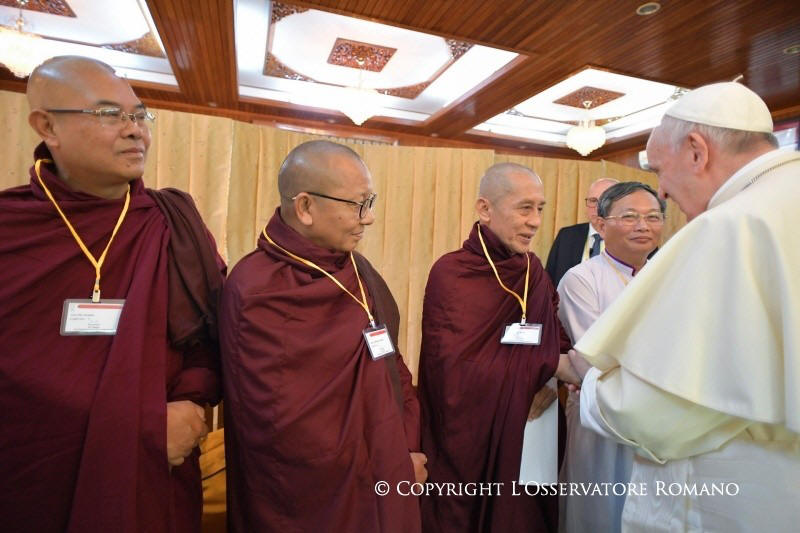
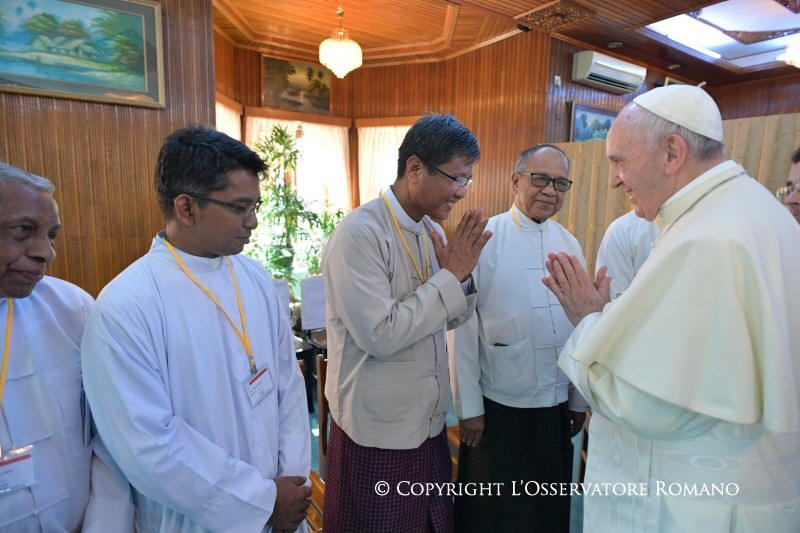
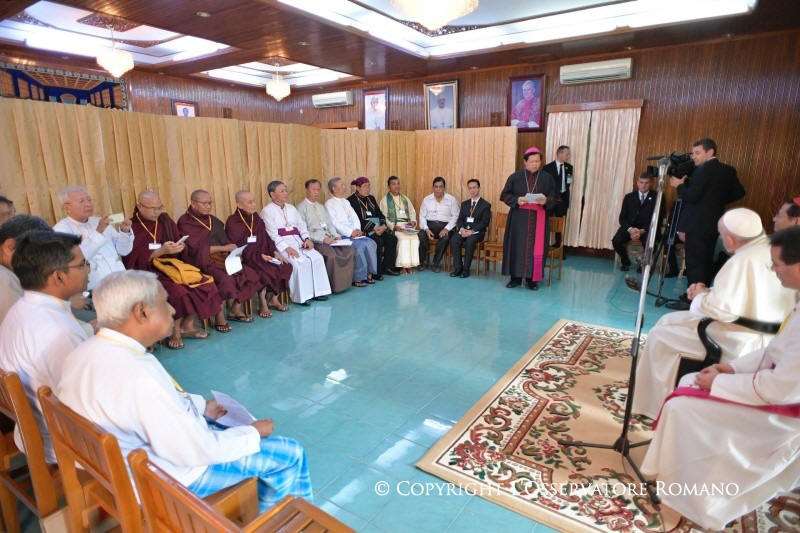
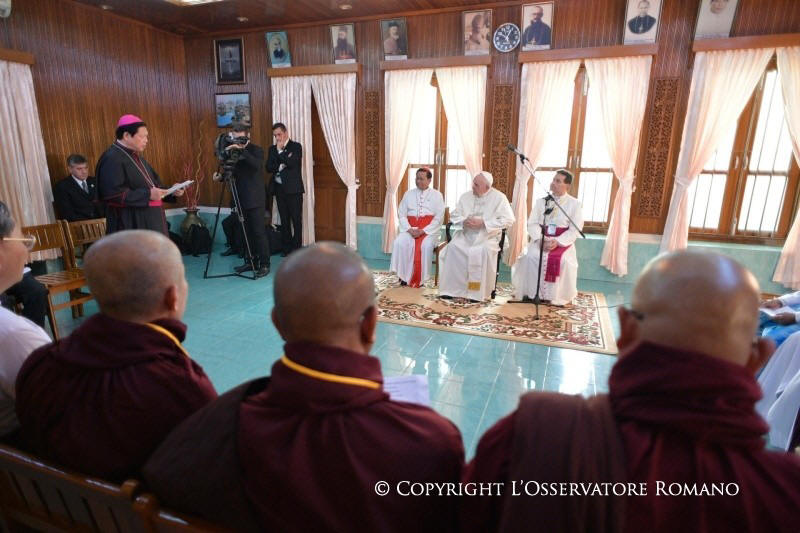
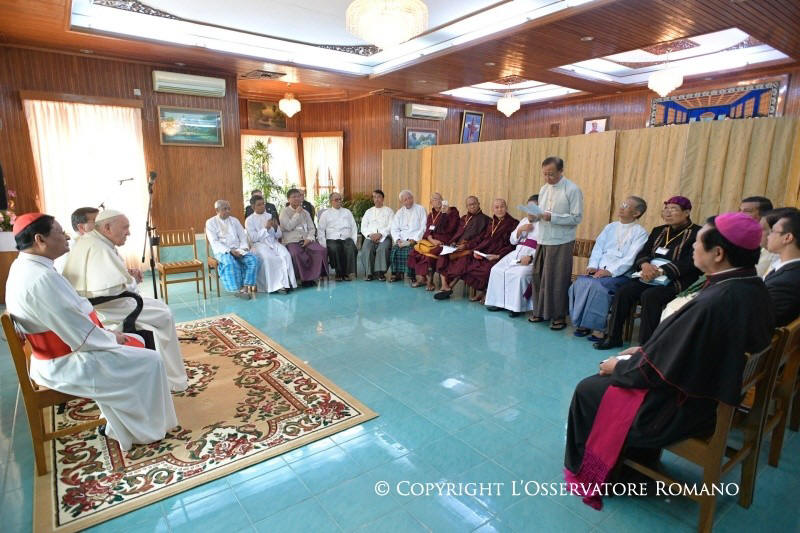
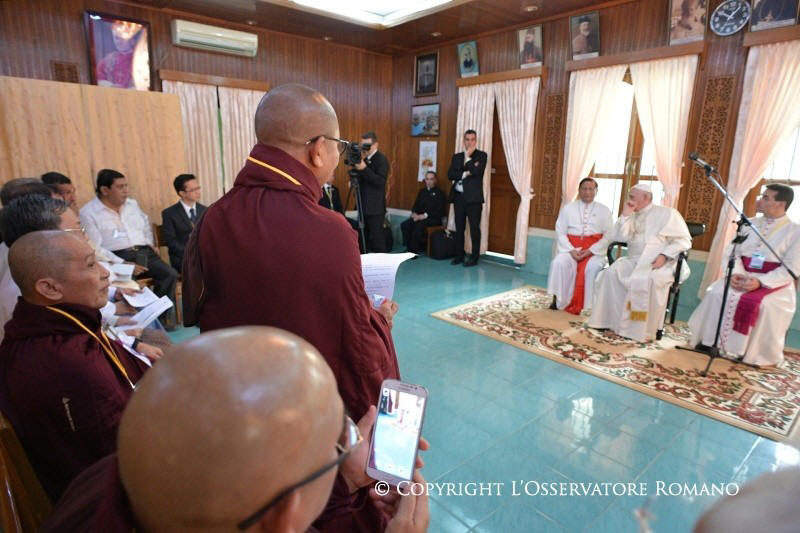
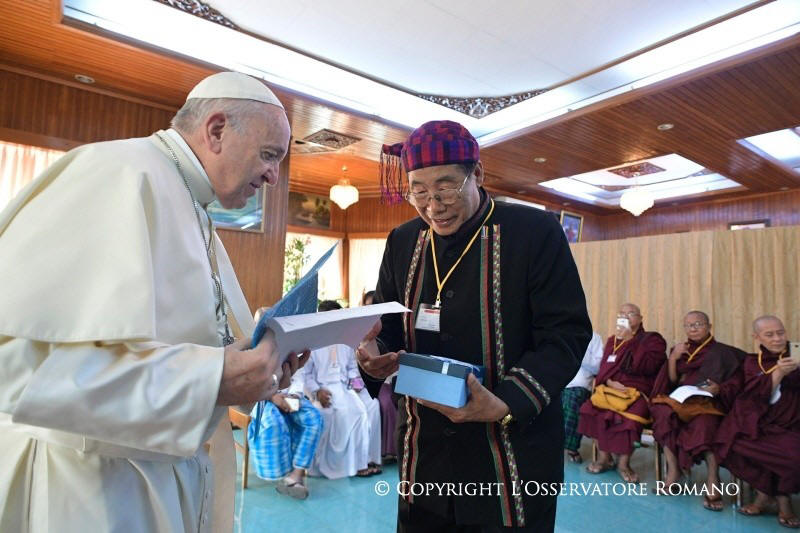
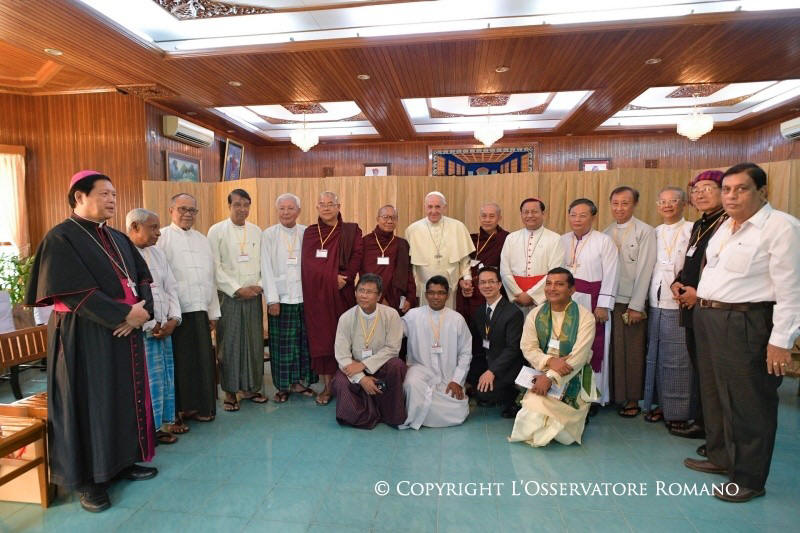
Sau khi gặp gỡ các vị lãnh đạo tôn giáo khác nhau ở Miến Điện, tại Tòa Tổng Giám Mục Thủ Đô Yangon, ĐTC Phanxicô đã dâng Thánh Lễ.

ĐỨC THÁNH CHA PHANXICÔ GẶP GỠ GIỚI CHÍNH QUYỀN
Sau bữa trưa, ngài được xe chở đến phi trường Yangon để vào lúc 2 giờ chuyến bay B737 của hãng hàng không MAI. Sau 1 tiếng bay, ngài đưoọc đón ở phi trường để xe chở ngài đến Dinh Tổng Thống, là nơi ngay trước tiền đường ngài được nghênh đón theo nghi thức vào lúc 3:50 pm (10:20 am ở Roma).
Sau đó ngài gặp riêng Tổng Thống Miến Điện là Htin Kyaw ở Sảnh Đường "Credentials Hall", nơi ngài đã ký vào cuốn giành cho khách hàng chữ tiếng Anh rằng: "Tôi xin phúc lành thần linh của công lý, bình an và hiệp nhất xuống trên toàn thể nhân dân Myanmar thân yêu".

Tiếp theo cuộc gặp gỡ tiêng vị tổng thống, ngài đã gặp riêng Vị Đoạt Giải Hòa Bình Aung San Suu Kyi, đương kim Cố Vấn Quốc Gia kiêm Ngoại Trưởng, trước khi ngài gặp các vị có thẩm quyền về chính trị, về xã hội và ngoại giao đoàn ở Trung Tâm Hội Nghị Quốc Tế Miến Điện.
Sau đây là bài chào mừng của Bà Cố Vấn Quốc Gia kiêm Ngoại Trưởng Aung San Suu Kyi ngỏ cùng Đức Giáo Hoàng Phanxicô cùng Quan Khách:

"Ngài mang đến cho chúng tôi sức mạnh và niềm hy vọng nơi việc ngài thông cảm với nhu cầu của chúng tôi, niềm mong đợi của chúng tôi,
đối với hòa bình, với việc hòa giải quốc gia cũng như với việc hòa hợp xã hội"
Trọng Kính Đức Thánh Cha Giáo Hoàng Phanxicô (Holy Father Pope Francis),
Cùng Quí Quan Khách,
Thật là một niềm vui lớn lao và là một đại vinh dự cho tôi được nghênh đón quí vị đến cuộc hội ngộ này để tái khẳng định niềm tin tưởng của chúng tôi vào quyền năng và khả thể của hòa bình cũng như của lòng nhân hậu yêu thương. Xin cho tôi được bắt đầu bằng việc cám ơn Đức Thánh Cha Giáo Hoàng ở với chúng tôi hôm nay đây. Grazie per essere arrivato qui da noi.
Trọng Kính Đức Thánh Cha Giáo Hoàng, ngài mang đến cho chúng tôi sức mạnh và niềm hy vọng nơi việc ngài thông cảm với nhu cầu của chúng tôi, niềm mong đợi của chúng tôi, đối với hòa bình, với việc hòa giải quốc gia cũng như với việc hòa hợp xã hội. Bản quốc ca của chúng tôi, được công nhận ngay vào thời điểm độc lập của chúng tôi, đã mở đầu bằng những lời: "Không bao giờ lạc mất tự do chân chính", là những gì phản ảnh niềm xác tín mảnh liệt của cha ông đất nước chúng tôi là tự do chân thực không thể nào sống còn nếu không có công lý. Những lời này âm vang nơi chúng tôi hôm nay đây, như chúng từng tác động nơi những ai đã tranh đấu cho một nền độc lập mà nhân dân chúng tôi đã có thể hiện thực tất cả khả năng của mình. Đó là phận sự của chúng tôi trong việc tiếp tục công việc xây dựng một quốc gia trên luật pháp và các cơ cấu để làm sao bảo đảm công lý, tự do và an ninh cho mỗi người và mọi người trong đất nước của chúng tôi. Bởi vậy những lời của Ngài về những vị tiên tri xưa đã thấy công lý như là nền tảng của tất cả nền hòa bình chân thật và bền vững đang âm vang nơi chúng tôi, và trở thành lời nhắc nhở chúng tôi rằng trong việc tìm cầu hòa bình chúng tôi cần phải được hướng dẫn bởi sự khôn ngoan và niềm ước vọng của các vị cha ông chúng tôi.
Trọng Kính Đức Thánh Cha Giáo Hoàng, Myanmar đang phải đối diện đương đầu với nhiều thách đố, và mỗi một thách đố đều cần đến sức mạnh, sự nhẫn nại và lòng can đảm. Quốc gia của chúng tôi là một tấm thảm được làm nên bởi các dân tộc khác nhau, các ngôn ngữ khác nhau và các tôn giáo khác nhau, được đan quyện lại trên một bức phông đầy những năng lực tự nhiên. Mục đích chính quyền của chúng tôi là làm sáng tỏ vẻ đẹp nơi tính cách đa dạng của mình và biến nó thành sức mạnh của chúng tôi, bằng cách bảo vệ các quyền lợi, duy trì việc khoan nhượng, bảo đảm an ninh cho tất cả mọi người. Nỗ lực vui thú nhất của chúng tôi đó là đẩy mạnh tiến trình hòa bình theo Hiệp Định Ngừng Bắn Toàn Quốc đã được khởi xướng bởi Chính Quyền trước đây. Con đường dẫn đến hòa bình không phải bao giờ cũng trơn tru, nhưng nó lại là con đường duy nhất dẫn nhân dân của chúng tôi đến những gì họ mơ tưởng về một mảnh đất công chính và thịnh vượng, nơi sẽ trở thành chỗ trú ngụ của họ, niềm hãnh diện của họ, niềm vui của họ. Việc tìm cầu hòa bình cần phải được củng cố bằng việc đạt tới việc phát triển bền bỉ, để bảo đảm cho tương lai của các thế hệ mai hậu.
Chính phủ của chúng tôi đang phải đối đầu với một trong nhiều thách đố, đó là trường hợp ở Rakhine từng được thế giới chú trọng mạnh mẽ nhất. Trong khi chúng tôi đang giải quyết các vấn đề đã lâu đời về xã hội, kinh tế và chính trị, những vấn đề đã làm tiêu tan mất niềm tin tưởng và cảm thông, mất đi sự hòa hợp và hợp tác, giữa những cộng đồng khác nhau ở Rakhine, thì việc hỗ trợ của nhân dân chúng tôi cũng như của những người bạn tốt chỉ muốn thấy chúng tôi thành đạt nơi các nỗ lực của chúng tôi, là những gì vô giá. Trọng kính ngài, những tặng ân của lòng cảm thương và sự phấn khích ngài mang đến cho chúng tôi sẽ được trân quí, và chúng tôi lưu giữ trong lòng những lời ngài nói trong sứ điệp cử hành Ngày Thế Giới lần thứ 50 mùng 1/1/2017. (Biệt chú của người dịch: Sứ Điệp Ngày Thế Giới Hòa Bình 1/1/2017 là "Bất Bạo Động: Một Kiểu Cách Chính Trị cho Hòa Bình" "Nonviolence: a Style of Politics for Peace"):
"Chính Chúa Giêsu cống hiến một thứ 'cẩm nang' cho chính sách kiến tạo hòa bình này ở Bài Giảng Trên Núi. Tám Mối Phúc Thật (xem Mathêu 5:3-10) là những gì cống hiến cho thấy chân dung của một con người chúng ta có thể nói là có phúc, tốt lành và chính gốc. Phúc cho người hiền lành, Chúa Giêsu bảo chúng ta như thế, cho ai biết thương xót và cho ai kiến tạo bình an, cho những ai có lòng thanh sạch và những ai đói khát công lý.
"Đó cũng là một chương trình và là một thách đố cho các nhà lãnh đạo chính trị và tôn giáo, cho các vị thủ lãnh các tổ chức quốc tế, cũng như cho các hành sự viên thương mại và truyền thông, ở chỗ áp dụng những mối Phúc Đức này vào việc thực hành các trách nhiệm của họ. Nó là một thách đố trong việc xây dựng xã hội, cộng đồng và mậu dịch bằng cách tác hành như là những con người kiến thiết hòa bình. Chính việc chứng tỏ lòng thương xót bằng việc không chịu loại trừ dân chúng, không chịu tác hại môi trường, hay không tìm thắng lợi với bất cứ giá nào". (Biệt chú của người dịch, hai đoạn được trích ở đây từ một phần của khoản 6 trong sứ điệp hòa bình 2017 có 7 khoản của ĐTC Phanxicô)
Trọng Kính Đức Thánh Cha Giáo Hoàng, chúng tôi cảm thấy hãnh diện và sung sướng khi ngài đến với xứ sở của chúng tôi chỉ sau 6 tháng xẩy ra việc thiết lập mối liên hệ ngoại giao giữa Tòa Thánh và Miến Điện. Đó không phải chỉ là chuyện mở màn cho một kỷ nguyên mới về các mối liên hệ chặt chẽ, nó cũng cấu tạo nên một sự hồi sinh những liên hệ cũ, mà tôi, cũng như những người khác thuộc thế hệ của tôi, vẫn còn nhung nhớ với lòng cảm mến và biết ơn. Tôi đã bắt đầu việc học vấn của mình tại Tu Viện Thánh Phanxicô ở Rangoon, nơi điểm tô cho tôi để tôi có quyền lãnh nhận các phúc lành đặc biệt từ ngài. Thế nhưng tất cả các phúc lành ngài ban sẽ được tất cả chúng tôi chia sẻ, để chúng tôi có thể lan truyền thiện chí và niềm hân hoan ra khắp đất nước của chúng tôi.
Trọng Kính Đức Thánh Cha Giáo Hoàng, mỗi một thế hệ trong đời sống của một quốc gia đều cưu mang trách nhiệm riêng của mình, cũng như nó cần phải cưu mang các di sản của quá khứ vậy. Hôm nay đây, chúng tôi, những con người được ban cho cơ hội để thực hiện các đổi thay để có thể mở ra những nhãn giới mới về việc tiến bộ cho quốc gia của chúng tôi, sẽ cố gắng thi hành nhiệm vụ của mình một cách trung trực và khiêm tốn. Chúng tôi muốn lưu lại cho tương lai một mảnh đất được cẩn thận và trân trọng chăm sóc, một mảnh đất lành mạnh, một mảnh đất mỹ miều. Chúng tôi muốn lưu lại cho tương lai một dân tộc hiệp nhất và bình an, có khả năng tăng trưởng và thịnh vượng trong một thế giới xoay vần, một dân tộc biết cảm thương và quảng đại, luôn sẵn sàng ra tay giúp đỡ những ai thiếu thốn; một dân tộc mạnh mẽ về năng khiếu và lành mạnh về tinh thần.
Trọng Kính Đức Thánh Cha Giáo Hoàng, con cái thuộc Giáo Hội của ngài ở xứ sở này cũng là con cái của Miến Điện, được yêu thương và quí mến. Chúng tôi xin cám ơn họ, như chúng tôi cám ơn ngài, vì đã cầu nguyện cho xứ sở của chúng tôi cũng như cho tất cả mọi dân tộc trên thế giới. Con đường trước mặt còn dài, thế nhưng chúng tôi sẽ bước đi trên con đường này một cách tin tưởng, tin vào quyền năng của hòa bình, yêu thương và niềm vui.
Trân Trọng Ngài,
Continuiamo a camminare insieme con fiducia.
Xin cám ơn tất cả quí vị.
https://zenit.org/articles/aung-san-suu-kyi-welcomes-pope-francis/

Diễn Từ của Đức Giáo Hoàng Phanxicô ngỏ cùng Giới Lãnh Đạo đất nước Myanmar Miến Điện
"Kho tàng lớn nhất của Myanmar là dân chúng"
Kính Bà Cố Vấn Quốc Gia,
Cùng Quí Vị Thẩm Quyền Chính Phủ và Dân Sự,
Cùng Quí Huynh Giám Mục Đáng Kính,
Cùng Quí Vị Quan Khách Ngoại Giao Đoàn,
Cùng Quí Vị Nữ Nhân và Nam Nhân,
Tôi xin cám ơn về lời mời thân ái đến thăm Myanmar, và tôi xin cám ơn Bà Cố Vấn Quốc Gia về những lời tốt đẹp của bà. Tôi rất biết ơn tất cả những ai đã làm việc khó nhọc để việc thăm viếng này trở thành hiện thực. Tôi đến đây, trước hết, là để cầu nguyện với cộng đồng Công giáo nhỏ bé nhưng nhiệt thành của đất nước này, để củng cố đức tin của họ, và để phấn khích họ nỗ lực góp phần vào thiện ích của quốc gia đây. Tôi biết ơn nhất là chuyến viếng thăm này xẩy ra mau chóng sau việc thiết lập mối liên hệ ngoại giao chính thức giữa Myanmar và Tòa Thánh. Tôi muốn coi quyết định này như là một dấu hiệu cho thấy việc quốc gia đây đang dấn thân theo đuổi vấn đề đối thoại và hợp tác xây dựng trong cộng đồng quốc tế, ngay lúc nó đang cố gắng canh tân đổi mới cơ cấu xã hội dân sự.
Tôi cũng muốn chuyến viếng thăm của tôi bao gồm toàn thể dân nhân Myanmar, và cống hiến đôi lời phấn khích cho tất cả những ai đang hoạt động trong việc xây dựng một trật tự xã hội công bằng, hòa giải và bao gồm. Myanmar đã được chúc phúc bởi vẻ đẹp cao cả và các nguồn lợi thiên nhiên, thế nhưng kho tàng lớn nhất của Myanmar là dân chúng của nó, thành phần đã chịu khổ rất nhiều, và vẫn còn tiếp tục chịu đựng, vì cuộc xung khắc và hận thù về dân sự đã kéo dài quá lâu và đã gây ra những chia rẽ trầm trọng. Trong khi đất nước này giờ đây đang thực hiện việc phục hồi hòa bình, thì việc chữa lành những thương tích ấy cần phải trở thành một thứ ưu tiên tối hậu về chính trị và tinh thần. Tôi chỉ biết bày tỏ lòng cảm nhận của tôi về những nỗ lực của Chính Phủ trong việc chấp nhận cái thách đố ấy, nhất là qua Hội Nghị Hòa Bình Pangiong, một hội nghị qui tụ các đại biểu thuộc các nhóm khác nhau để cố gắng chấm dứt bạo lực, để xây dựng lòng tin tưởng và để bảo đảm việc tôn trọng các quyền lợi của tất cả những ai gọi đất nước này là nhà của họ.
Thật vậy, tiến trình cực nhọc để xây dựng hòa bình và việc hòa giải quốc gia chỉ có thể tiến triển bằng một cuộc dấn thân cho công lý và tôn trọng nhân quyền. Cái khôn ngoan cổ xưa đã định nghĩa công bằng chính là một ý muốn kiên trì trong việc cống hiến cho từng người những gì xứng hợp với họ, trong khi các vị tiên tri xưa đã thấy công lý như là căn bản của tất cả nền hòa bình chân thật và bền vững. Những minh thức này, được xác nhận bởi cuộc trải nghiệm thảm thương từ hai thế chiến, đã dẫn đến việc thành lập tổ chức Liên Hiệp Quốc và bản tuyên ngôn chung về nhân quyền như là nền tảng cho các nỗ lực của cộng đồng quốc tế trong việc cổ võ công lý, hòa bình và phát tiển con người khắp thế giới, cũng như trong việc giải quyết các xung khắc bằng đối thoại, chứ không phải bằng việc sử dụng bạo lực. Theo chiều hướng ấy thì việc hiện diện của các phái đoàn ngoại giao ở giữa chúng ta đây chẳng những chứng tỏ cho thấy vị trí của Myanmar nơi dàn nhạc chư quốc mà còn cho thấy việc dấn thân của xứ sở này trong việc tán thành và theo đuổi những nguyên tắc nền tảng ấy. Tương lai của Myanmar cần phải bình an, một thứ bình an đặt trên việc tôn trọng phẩm giá và quyền lợi của mỗi một phần tử trong xã hội, tôn trọng từng nhóm sắc dân cùng căn tính của họ, tôn trọng qui tắc luật lệ, và tôn trọng một trật tự dân chủ giúp cho từng người và mọi nhóm - không trừ ai - có thể cống hiến việc góp phần hợp lý của mình vào công ích.
Trong công cuộc cao cả hòa giải và hội nhập của quốc gia như thế, các cộng đồng tôn giáo của Myanmar đóng một vai trò đặc biệt. Những sự khác biệt về tôn giáo cần phải làm sao không trở thành cớ chia rẽ và bất tin tưởng, trái lại thành một quyền lực cho mối hiệp nhất, tha thứ, khoan dung và việc khôn ngoan xây dựng quốc gia. Các tôn giáo có thể đóng một vai trò quan trọng trong việc chữa các vết thương về cảm xúc, tinh thần và tâm lý của những ai đã chịu khổ trong những năm xung đột. Kín múc được các thứ giá trị được sâu xa xác tín, họ có thể giúp vào việc nhổ tận rễ những căn nguyên gây ra xung đột, xây những cây cầu đối thoại, tìm kiếm công lý và trở thành một tiếng nói ngôn sứ cho tất cả những ai đang chịu khổ. Thật là một dấu hiệu hy vọng lớn lao khi những vị lãnh đạo thuộc các truyền thống tôn giáo khác nhau ở xứ sở này đang nỗ lực làm việc với nhau, trong tinh thần hòa hợp và tương kính, cho hòa bình, cho việc giúp đỡ người nghèo cũng như cho việc giáo dục về các thứ giá trị đích thực về tôn giáo và nhân bản. Trong việc tìm kiếm để xây dựng một thứ văn hóa gặp gỡ và đoàn kết, họ góp phần vào công ích cũng như vào việc đặt nền tảng về luân lý bất khả thiếu cho một tương lai hy vọng và thịnh vượng cho các thế hệ mai sau.
Tương lai ấy thậm chí ngay lúc này đây đã ở trong tay của giới trẻ của quốc gia này. Giới trẻ là một tặng ân cần được quí chuộng và phấn khích, một đầu tư sẽ mang lại dồi dào lợi ích nếu họ được cống hiến cho các cơ hội thực sự về công ăn việc làm và giáo dục tốt đẹp. Đó là một đòi hỏi khẩn trương của vấn đề công lý liên thế hệ. Tương lai của Myanmar trong một thế giới biến chuyển mau chóng và liên kết sẽ lệ thuộc vào việc huấn luyện giới trẻ của mình, chẳng những về phương diện kỹ thuật, mà nhất là về các thứ giá trị đạo đức như chân thành, liêm khiết và đoàn kết nhân bản là những gì có thể bảo toàn việc củng cố nền dân chủ và việc tăng trưởng của mối hiệp nhất và bình an ở hết mọi lãnh vực trong xã hội. Cũng thế, vấn đề công lý liên thế hệ đòi hỏi rằng các thế hệ tương lai phải được thừa hưởng một môi trưởng tự nhiên không bị hư hỏng bằng lòng tham lam và việc phá hoại của con người. Vấn đề thiết yếu ở đây là giới trẻ của chúng ta không bị cướp mất niềm hy vọng cùng cơ hội sử dụng lý tưởng cùng các tài năng của chúng trong việc hình thành tương lai xứ sở của chúng mà thật sự là toàn thể gia đình nhân loại chúng ta.
Kính Bà Cố Vấn Quốc Gia, cùng các bạn thân mến,
Trong những ngày này, tôi muốn phấn khích anh chị em Công giáo của tôi trong việc kiên trì với đức tin của họ, và tiếp tục bày tỏ sứ điệp đức tin về sự hòa giải và tình huynh đệ bằng các hoạt động bác ái và nhân đạo mang lại thiện ích cho xã hội nói chung. Tôi hy vọng rằng, bằng việc trân trọng hợp tác với những tín đồ thuộc các tôn giáo khác, cũng như với tất cả những người thiện tâm, họ sẽ giúp mở ra một kỷ nguyên mới của sự hòa hợp và tiến bộ cho nhân dân của đất nước này. "Myanmar muôn năm!" Tôi xin cám ơn quí vị đã lắng nghe, và bằng những lời nguyện chúc tốt đẹp cho việc quí vị phục vụ công ích, tôi xin phúc lành thần linh ban ơn khôn ngoan, sức mạnh và bình an xuống trên tất cả quí vị.
http://www.news.va/en/news/pope-francis-addresses-myanmars-leaders-full-text


Hình ảnh tiêu biểu trên đây cho thấy thủ đô mới của Miến Điện là Nay Pyi Taw, nơi Đức Thánh Cha đã tới hôm Thứ Ba 28/11/2017 để gặp thành phần lãnh đạo quốc gia, chẳng khác gì như một thành trì (fortress), một thành trì được xây cất để bảo vệ cho thành phần quyền lực của đất nước, và giúp cho họ thoát thân dễ dàng khi xẩy ra biến sự. Chẳng hạn ở chung quanh dinh tổng thống có con đường 20 hàng xe chạy (lanes), và hầu như chỗ nào trực thăng cũng có thể lên xuống dễ dàng. Các dinh thực quyền lực năm ở trên đồi cao và được bao quanh bằng các hào lũy rộng lớn ở bên trên có những cây cầu bằng sắt băng ngang qua. Thủ đô này, theo thống kê có trên 1 triệu dân cư, được ví như một phố ma (a ghost town), bởi có rất ít xe cộ chạy trên những con đường rộng lớn, hoàn toàn trái ngược với thủ đô Yangon 2 năm trước đây, nơi suốt ngày bị kẹt xe. Bởi thế, chẳng lạ gì mà các xe buýt chở đoàn phóng viên truyền thông tháp tùng Đức Giáo Hoàng trong chuyến tông du lần này, cho dù được cảnh sát dẫn đường mở lối thế mà vẫn bị trục trặc kẹt xe trên đường ra phi trường.
Ngày 27/11
Vào lúc 9:30 tối hôm qua, Chúa Nhật 26/11, (đúng hơn bị trễ mất 35 phút), ĐTC Phanxicô mới lên chiếc Alitalia Airbus từ Roma cho chuyến tông du 1 tuần lễ của ngài ở Á Châu, tuyến tông du thứ ba ở châu lục hiếm Kitô hữu nhất thế giới này (2014 Đại Hàn 2014; 2015 Tích Lan và Phi Luật Tân; 2017: Miến Điện và Bangladsh).
Sau 10 tiếng rưỡi bay, ngài đã tới Thủ Đô Miến Điện là Yangon (cho tới năm 2005) vào lúc 1 giờ 30 chiều 27/11. Ở trên máy bay, theo thông lệ, ngài đã ngỏ lời chào và cám ơn phái đoàn phóng viên truyền thông tháp tùng ngài. Ngài chào họ vào lúc 10:35 tối, sau đó bắt tay từng người, nhanh hơn các lần khác, để còn đi ngủ sớm lấy sức.
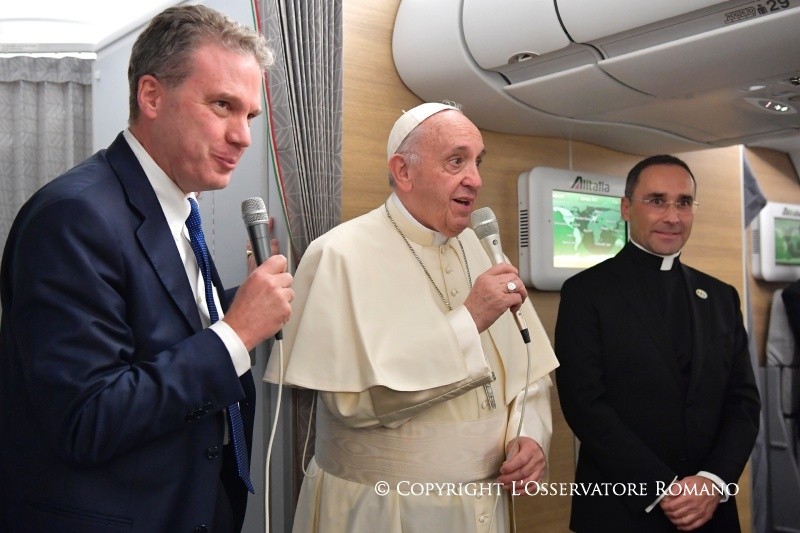
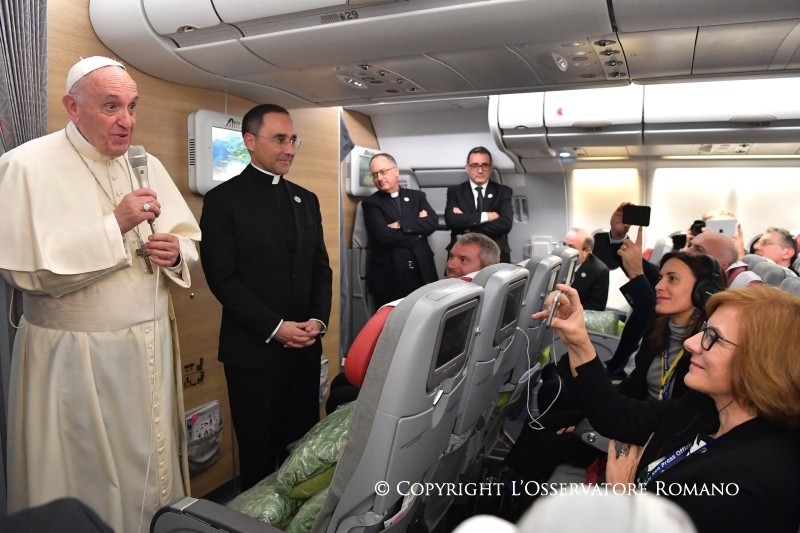
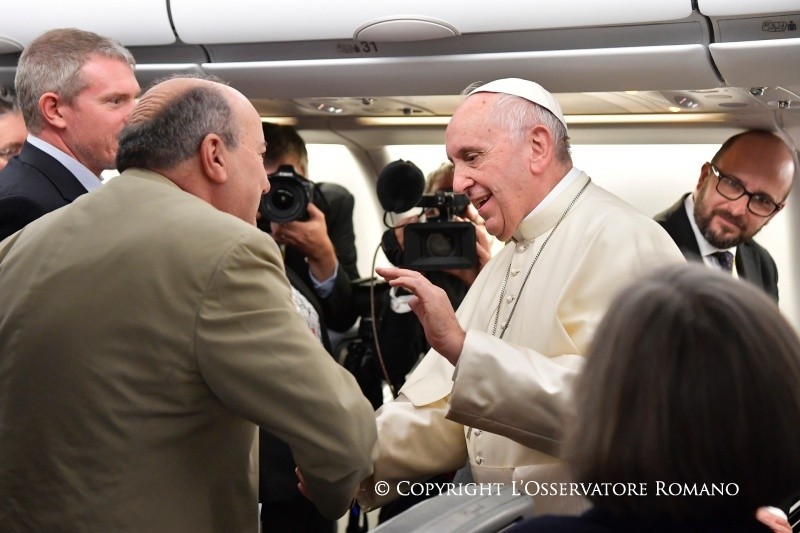
Ngài đã được đón tiếp tại phi trường bởi tổng thống nước này cùng với các vị giám mục và các em nhỏ trong bộ áo truyền thống dân tộc. Sau đó ngài về Tòa Giám Mục, nơi ngài nghỉ ngơi và cử hành thánh lễ riêng tư trong nguyện đường của Tòa Tổng Giám Mục.


Thay vì theo chương trình giành thời gian nghỉ ngơi sau một chuyến bay qua đếm mệt mỏi, ngài đã ngỏ ý muốn gặp riêng vị tướng tổng tư lệnh của chính quyền Miến Điện là Min Aung Hlaing ở Tòa Tổng Giám Mục Yangon, vào lúc 5 giờ 55 chiều. Trong cuộc phỏng vấn 15 phút sau đó, vị giám đốc văn phòng báo chí của Tòa Thánh là Greg Burke đã cho biết cuộc gặp gỡ "nói về trách nhiệm trọng đại của thẩm quyến trong chính phủ vào thời điểm chuyển tiếp". Cuối cuộc gặp gỡ bất ngờ mở màn này, ĐTC Phanxicô đã tặng vị tưởng tổng tư lệnh một mề đay giáo hoàng và vị tướng tặng ngài một cái đàn hạc hình con thuyền và một cái bát đính những hạt cơm. Ngày mai ngài sẽ thủ đô mới của Miến Điện là Nay Pyi Taw là nơi được xây dựng từ đổ nát từ mấy thập niên qua cho 1 triệu rưỡi cư trú nhân, hầu hết là các sĩ quan quân đội và các nhân viện thuộc các bộ nội các, cùng gia đình của các thành phần này.
ĐTC Phanxicô là vị giáo hoàng đầu tiên đến Miến Điện, một quốc gia đa số là Phật giáo, và mới xẩy ra vụ thành phần thiểu số người Rohingya theo Hồi giáo, cả nửa triệu người, thành phần được quốc tế cho là bị kỳ thị, bởi họ là "những người Hồi giáo Bengali bất hợp pháp" chính thức từ năm 1982, lại còn muốn tách Rakhine State of Myanmar của họ ra để thành lập một Nhà Nước Hồi Giáo trong đất nước Miến Điện nữa, và cho là họ bị đàn áp, sau khi họ gây ra các cuộc tấn công khủng bố vào tháng 8/2017, nến họ đã kéo nhau chạy lánh nạn ở Bangladesh, một nước đa số Hồi giáo, nơi mà trong cùng chuyến tông du này, ngài là vị giáo hoàng thứ 3 đến Bangladesh (Đức Phaolô VI năm 1970, khi nước này chưa độc lập, và Đức Gioan Phaolô II năm 1986). Theo dự tính từ ban đầu thì chuyến tông du của ngài chỉ bao gồm có Ấn Độ và Bangladesh, nhưng vì lời mời của chính phủ Ấn Độ bị trì hoãn bởi gặp phải chống đối trong đảng cầm quyền không biết đến bao giờ nên đã thay Ấn Độ bằng Miến Điện. Chủ đề cho chuyến tông du cuối năm 2017 sang Á Châu lần thứ ba này của ngài là "Yêu Thương và Hòa Bình" ở Miến Điện và "Hòa Hợp và Hòa Bình" ở Bangladesh.
Trong khi đó, đoàn tùy tùng của Đức Thánh Cha Phanxicô, trong đó có 2 vị hồng y cao cấp của Tòa Thánh là ĐHY Pietro Parolin, Quốc Vụ Khanh, và ĐHY Fernando Filoni, Tổng Trưởng Thánh Bộ Truyền Bá Phúc Âm Hóa Các Dân Tộc, được dẫn đến Chúa Shwedagon ở trung tâm tinh thần danh tiếng nhất của Phật giáo Burmese. Biến cố này diễn ra vào lúc 7 giờ tối ở Miến Điện (1:30 chiều ở Roma), Đài Phát Thanh Vatican phổ biến một đoạn video clip cho thấy Đức Hồng Y Filoni được mời gõ cồng (gong). Khu vực đền chùa này có từ cả 2500 năm, và là nơi lưu giữ các di tích của Phật tổ cùng với nhiều quí vật của Phật giáo. Trong chuyến tông du này, Đức Thánh Cha Phanxicô cũng sẽ gặp gỡ Thượng Hội Đồng "Sangha" của các nhà sư Phật giáo ở Trung Tâm Kaba Aye vào lúc 4:15 chiều Thứ Tư 29/11/2017.

LỊCH TRÌNH TÔNG DU
Sunday, 26 November 2017
| 21.40 | Departure by plane from Rome/Fiumicino Airport for Yangon |
Monday, 27 November 2017
| 13.30 | Arrival at Yangon International Airport |
| Official welcome |
Tuesday, 28 November 2017
| 14.00 | Departure by plane for Nay Pyi Taw |
| 15.10 | Arrival at Nay Pyi Taw Airport |
| Official welcome | |
| 15.50 | Welcome ceremony in the Presidential Palace |
| 16.00 | Courtesy visit to the President |
| 16.30 | Meeting with the State Counsellor and Union Minister for Foreign Affairs |
| 17.15 | Meeting with Authorities, the Civil Society and the Diplomatic Corps in the International Convention Centre |
| 18.20 | Departure by plane for Yangon |
| 19.25 | Arrival at the Airport in Yangon and transfer to the Archbishop’s House |
Wednesday, 29 November 2017
| 08.30 | Holy Mass in the Kyaikkasan Ground |
| 16.15 | Meeting with the Supreme “Sangha” Council of Buddhist Monks in Kaba Aye Centre |
| 17.15 | Meeting with the Bishops of Myanmar in a hall of St Mary’s Cathedral |
Thursday, 30 November 2017
| 10.15 | Holy Mass with the youth in St Mary’s Cathedral |
| 12.45 | Official farewell in Yangon International Airport |
| 13.05 | Departure by plane for Dhaka |
| 15.00 | Arrival at Dhaka International Airport |
| Welcome ceremony | |
| 16.00 | Visit to the National Martyr’s Memorial of Savar |
| 16.45 | Homage to the Father of the Nation in Bangabandhu Memorial Museum and signing of the Book of Honour |
| 17.30 | Courtesy visit to the President in the Presidential Palace |
| 18.00 | Meeting with Government and Civil Authorities and the Diplomatic Corps in the Presidential Palace |
Friday, 1 December 2017
| 10.00 | Holy Mass and priestly ordination in Suhrawardy Udyan Park |
| 15.20 | Visit of the Prime Minister in the Apostolic Nunciature |
| 16.00 | Visit to the Cathedral |
| 16.15 | Meeting with the Bishops of Bangladesh in the Home for retired priests |
| 17.00 | Ecumenical and Interreligious Meeting for peace in the garden of the Archbishop’s Residence |
Saturday, 2 December 2017
| 10.00 | Private visit to Tejgaon Mother Theresa House |
| 10.45 | Meeting with Priests, Religious and Consecrated Men and Women, Seminarians and Novices in the Holy Rosary Church |
| 11.45 | Visit to the Parish Cemetery and to the ancient Holy Rosary Church |
| 15.20 | Meeting with the youth in Notre Dame College in Dhaka |
| 16.45 | Official farewell in Dhaka International Airport |
| 17.05 | Departure by plane for Rome/Fiumicino |
| 23.00 | Arrival in Rome/Fiumicino |
_______________
| time zones | |
| Rome: | + 1h UTC |
| Yangon: | + 6h 30 UTC |
| Nay Pyi Taw: | + 6h 30 UTC |
| Dhaka: | + 6h UTC |